Guitar Theory Video Lessons
Here you will find many videos on music theory for guitar. As you will see by watching these videos, music theory is not necessarily difficult or complicated: rather it is the best way to support your originality and spark your creativity as a guitar player! To get the most from your music theory though, you need to know how to avoid the most common pitfalls and really leverage your theory knowledge so that you will be able to apply it on your guitar spontaneously and naturally.
By watching the videos in this page you will gradually become aware of how you can use music theory on your guitar and how this gives you a head start over every player who does not know it. Why learn things the difficult way? Learn music theory applied to the guitar fretboard with the videos below!
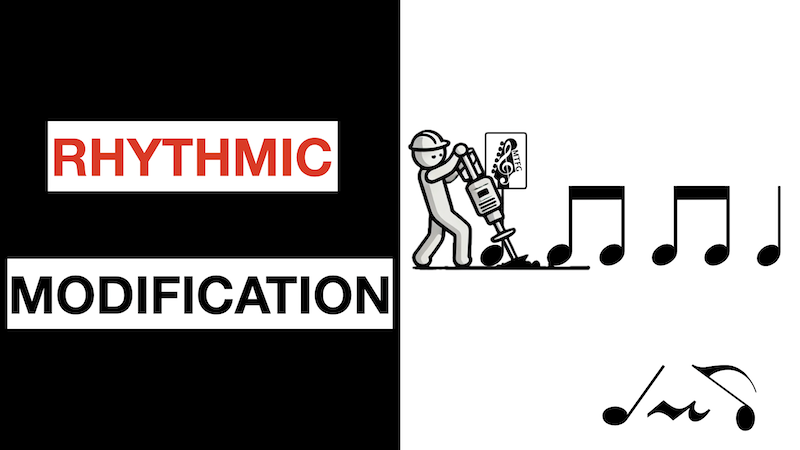
Rhythmic Modifications
Stuck in a rhythmic rut? A small change can make a big difference in how your playing sounds and feels. Whether you're looking to add more groove, create contrast, or bring extra life to your strumming, this simple approach will open new doors in your guitar playing.
Click the link below to read the full article:
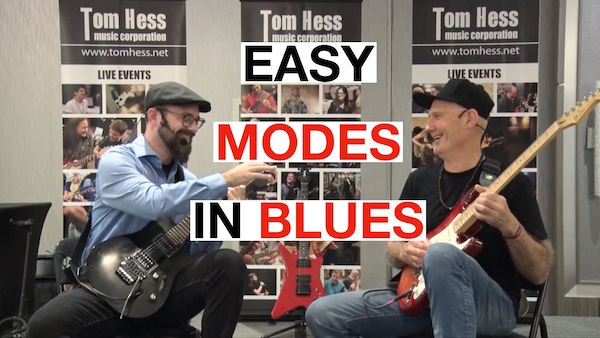
DO THIS To Make Your Blues Solos WAY MORE INTERESTING!
When improvising over a blues chord progression, should you exclusively be using the pentatonic scale? How should you make your playing sound more interesting?
Click here to see how to effectively use the modes in blues
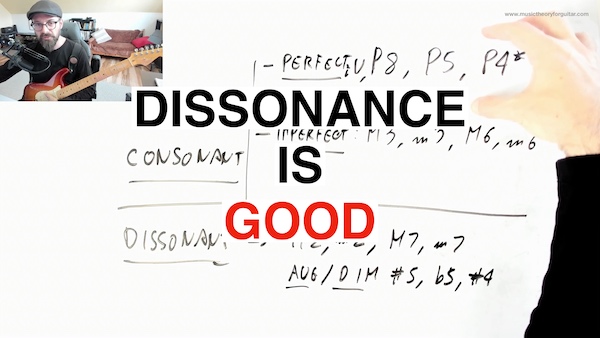
CONSONANCE And DISSONANCE: What Does It Even Mean?
Do you know what makes some intervals consonant and some dissonant? Do you know exactly what these terms even mean?
Click here to learn more about consonance, dissonance, and intervals
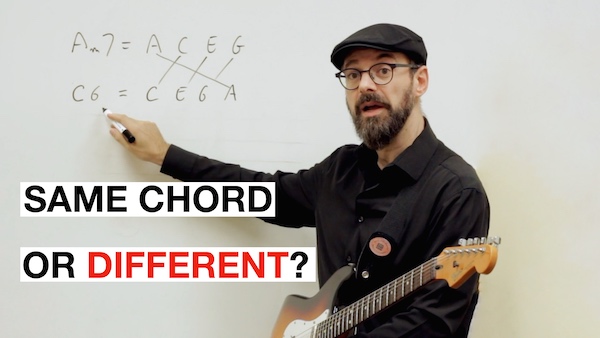
Do We Really Need Multiple NAMES For CHORDS That Use The SAME NOTES?
Why do chords built with the same notes require different names? Wouldn't it be easier if there was only one name? There's actually a better reason than you might think!
Click here to see why we need different names for the same notes
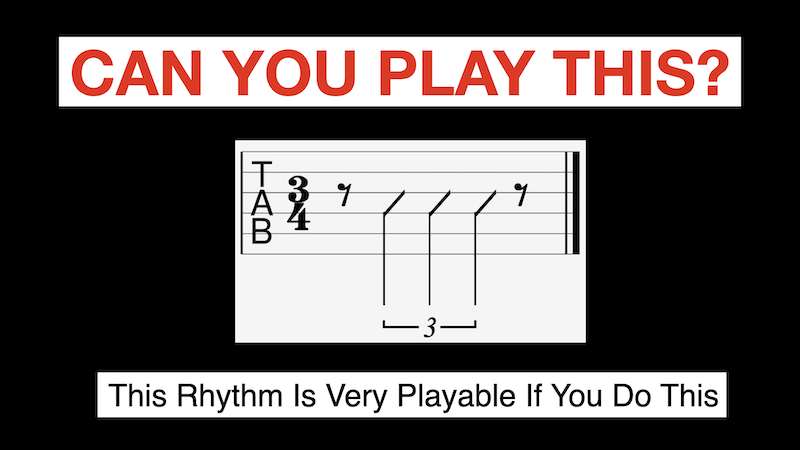
OFFBEAT Triplets - This Rhythm Is Very Playable If You Do This
Think offbeat quarter note triplets are impossible? Think again! This step-by-step breakdown will show you a simple, no-nonsense approach to mastering this tricky rhythm. This video will help you improve your rhythmic skills and lock in this very playable rhythm so you can play it with confidence.
Click the link below to read the full article:
Offbeat Triplets - This Rhythm Is Very Playable If You Do This
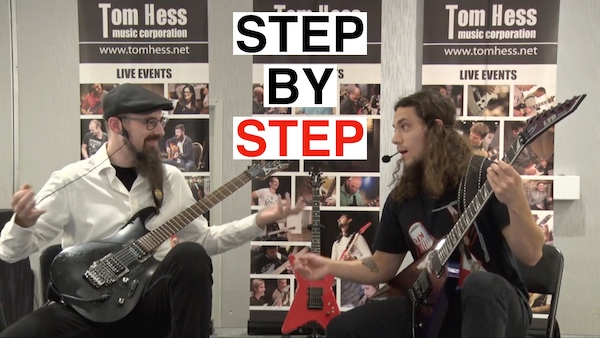
How To Write A CHORD PROGRESSION For Your RIFF
Do you get stuck writing chord progressions for your riffs and melodies? Many guitar players struggle with this but it's easier than you might think!
Click here to see how to turn your riffs into chord progressions
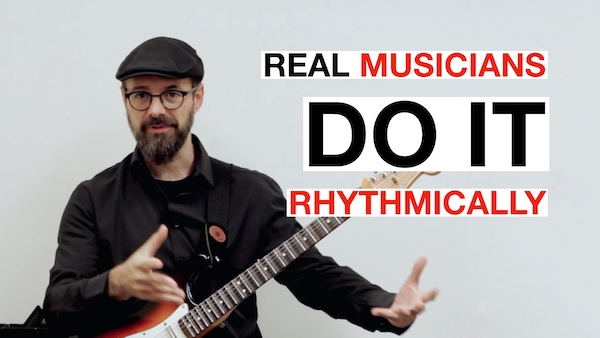
Are You A REAL MUSICIAN If You Write Music Like THIS?
Do real musicians simply do everything by feel? Do they understand music theory or do they wait for divine inspiration to make their music?
Click here to see why real musicians all use theory
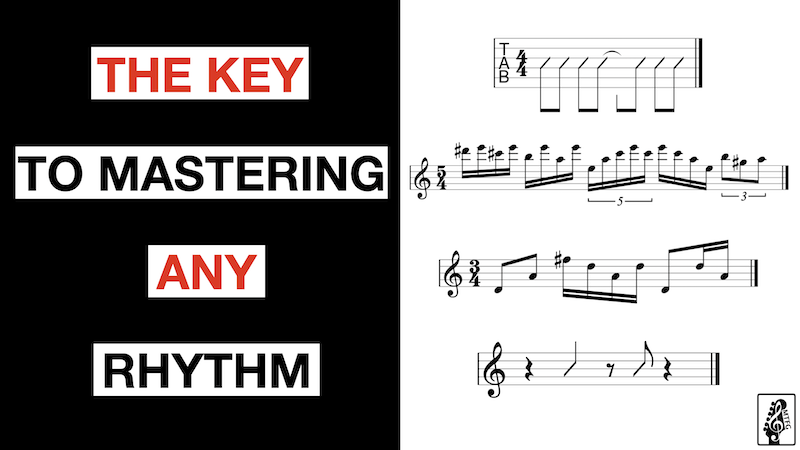
The Key To Mastering Any Rhythm For Guitar Players
Struggling to lock into the groove? Most guitar players overlook one simple yet powerful practice method that can instantly improve their timing and rhythm. Whether you're a beginner or an experienced player, this game-changing approach will help you play with more confidence and precision. Click the link to discover how to take your rhythm skills to the next level!
Click the link below to read the full article:
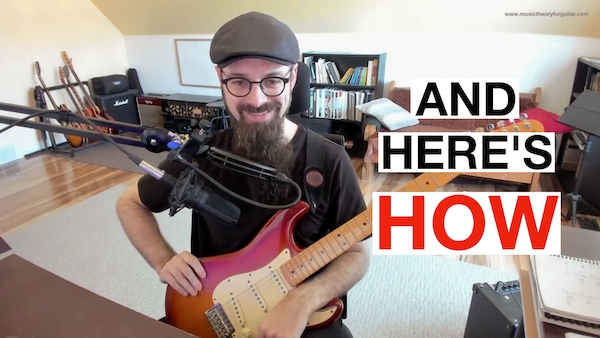
MODES Are Confusing... If You Don't UNDERSTAND Them!
Do you find modes completely confusing? They're actually much simpler than you think!
Click here to see how to use modes properly
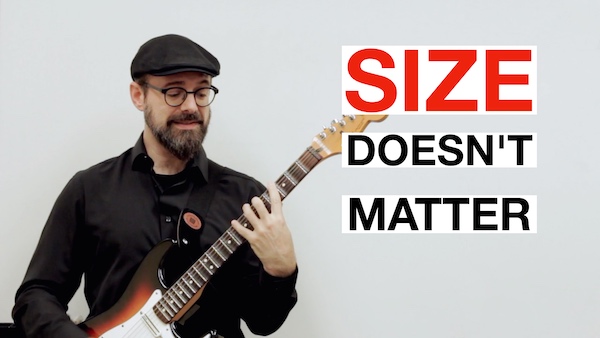
Are Your HANDS Too SMALL (Or Big) To Play GUITAR?
Are your hands TOO SMALL to learn guitar? Too big? Too average? In reality, everybody can learn to play guitar no matter what!
Click here to see why you can learn guitar despite anything wrong with your hands
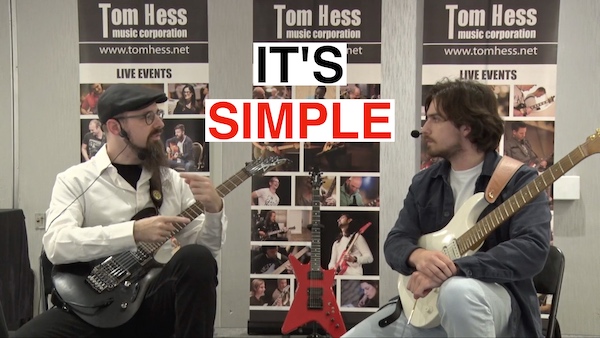
How Bands Like LED ZEPPELIN And QUEEN Write Complex CHORD PROGRESSIONS
Want to learn how to write fancy chord progressions like the one in Stairway to Heaven? It's much easier than you think!
Click here to see how to write complex chord progressions
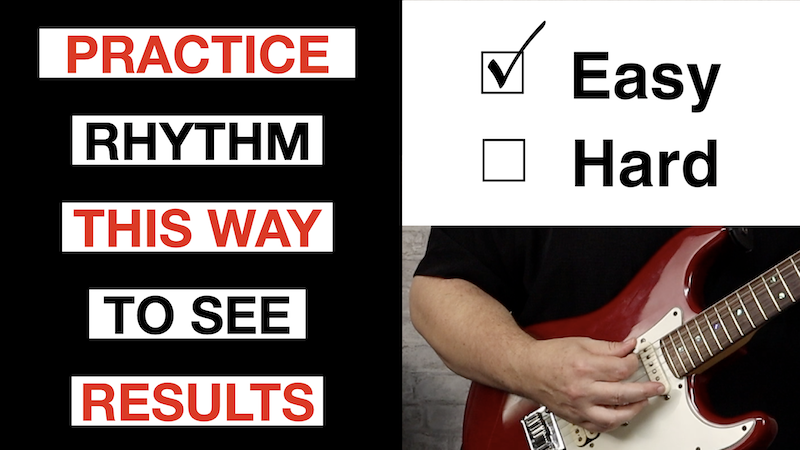
Practice Rhythm This Way To See Results
Do you want some practical and easy ways to practice rhythm that you can use immediately to improve your playing? These practice methods work great for rhythm and lead guitar.
Watch the video here:
www.musictheoryforguitar.com/Practice-Rhythm-This-Way-To-See-Results/
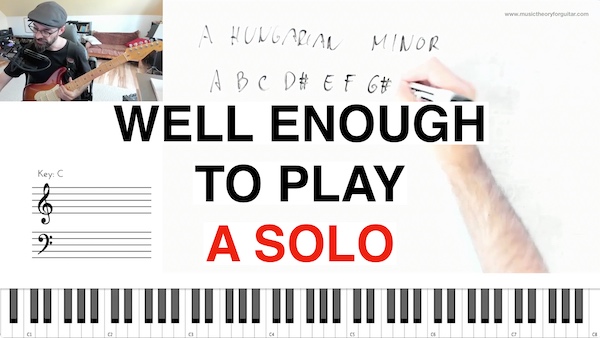
How To Learn Any Guitar Scale In FIVE MINUTES!
Is learning new scales taking way too long? You can actually get a good enough grasp on a new scale to play solos and improvise in only 5 minutes!
Click here to see how to learn scales in five minutes!

Do Old-Time BLUES PLAYERS Know Music Theory?
Does the average blues player at your local pub's blues jam know music theory? Many people assume that they don't, but you may be surprised...
Click here to see why even those blues players know theory
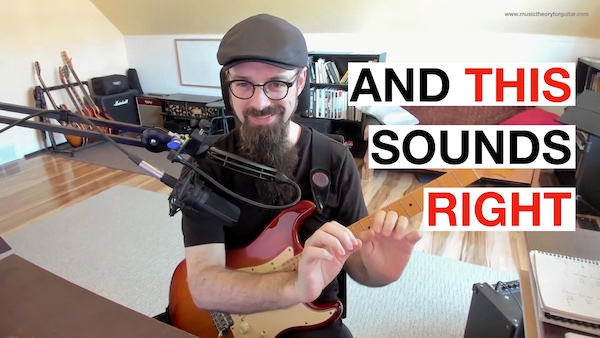
Why The Minor Pentatonic Sounds WRONG Over The BLUES Chord Progression
Do you know the right way to play over the common dominant blues chord progression? It's not quite as simple as it might seem!
Click here to see how to solo over a dominant blues
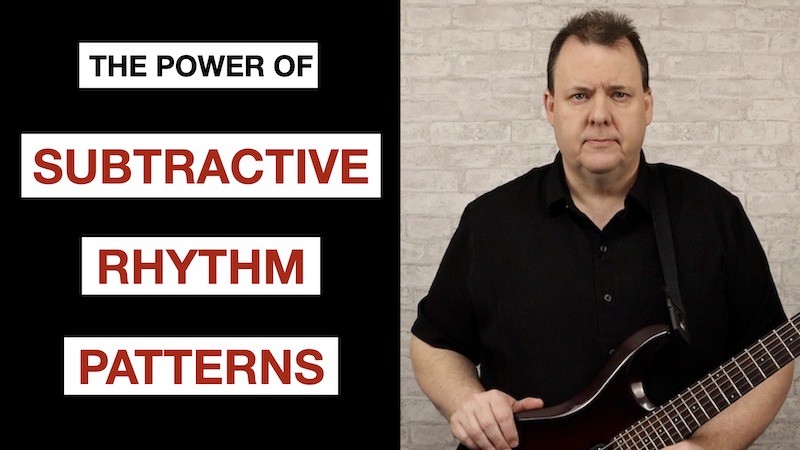
The Power of Subtractive Rhythm Patterns
Unlock the secrets of Subtractive Rhythm Patterns to elevate your guitar playing! This article explores how removing specific notes from rhythmic subdivisions can create captivating grooves and dynamic riffs. Perfect for players looking to add creativity and energy to their guitar playing. Discover step-by-step examples to inspire your next masterpiece.
Click the link below to read the full article:
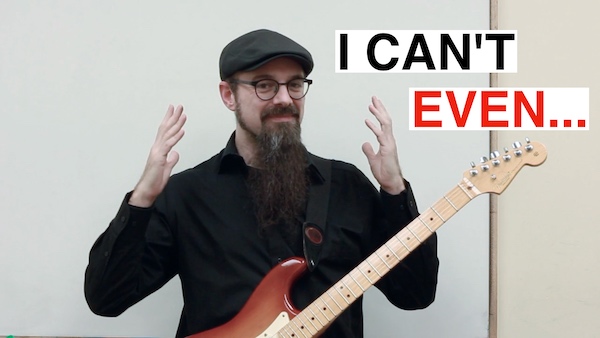
Do You NEED To Learn Music Theory If You Don't WRITE SONGS?
If you don't want to write your own music, do you still need to learn music theory? Is theory ever not needed if you have certain goals?
Click here to see why you always need music theory
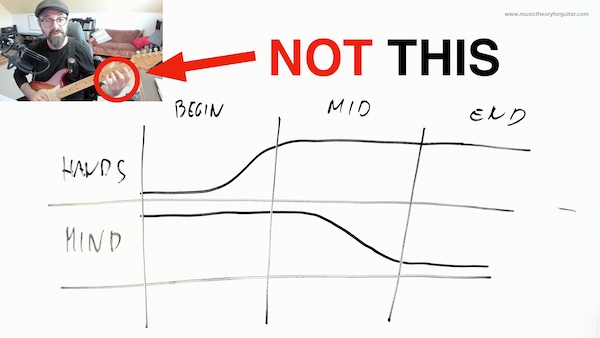
Why Does Every Guitar Player Warm Up The WRONG WAY?
Are you warming up WRONG when you practice guitar? If you start with things like the 'spider-walk' exercise, then you probably are...
Click here to see how to properly warm up on guitar
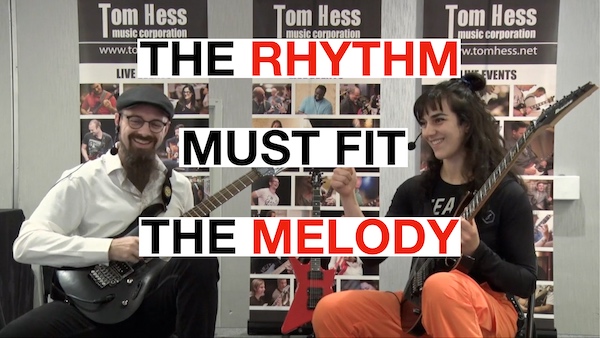
Write RHYTHM Guitar Parts That Fit Your MELODY Right
Do you have trouble with writing rhythm parts that will work alongside your melodies? Do you bore yourself with the parts you write?
Click here to see how to write great rhythm parts for your melody
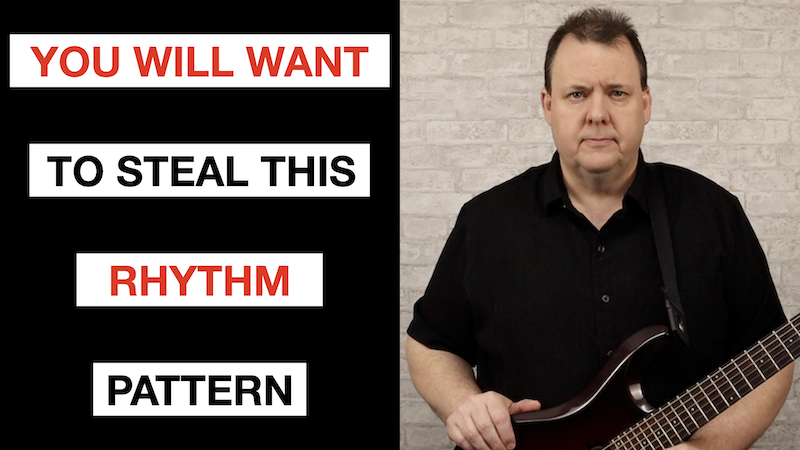
You Will Want To Steal This Rhythm Pattern
Pick up your guitar today and let's have some fun with rhythm. In this article, you'll discover how to combine a straightforward rhythm pattern with a short melody to create an amazing sound. This method is incredibly simple to incorporate into your skill set! By introducing this rhythmic structure into your playing, you’ll be able to impress your audience, making them think your music is more complex than it actually is. Click the link to learn more.

Is There Actually A Difference Between A MINOR And C MAJOR?
Some people would say that it is impossible to modulate from C major to A minor because they are the same key... but some people are WRONG!
Click here to see why relative keys aren't the same!
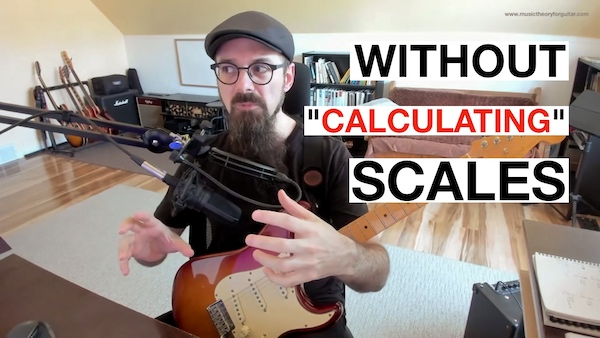
The SECRET To Soloing Over COMPLEX Jazz Chords
Do you wish it was easier to play over jazz chord progressions? With this simple trick, you'll find that it's way easier than you thought it was!
Click here to see how to solo over jazz chords
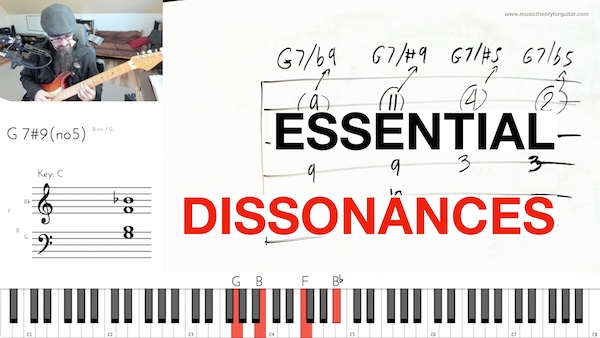
Why You Should Learn The ALTERED DOMINANT Chords
Do you want to spice up your guitar playing? Do you want your chord progressions to sound fancier?
Click here to see how to play altered dominant chords
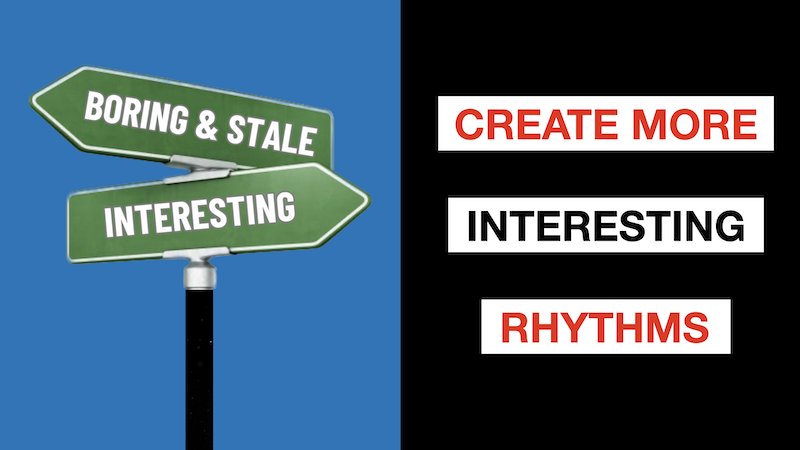
Do This To Create More Interesting Rhythms
This article dives into the delightful world of rhythmic anticipation, a fantastic technique that enhances rhythm and captivates listeners in all music styles. It highlights how incorporating anticipation into your guitar playing can be a game-changer, and it shares tips and examples aimed at inspiring your creativity.
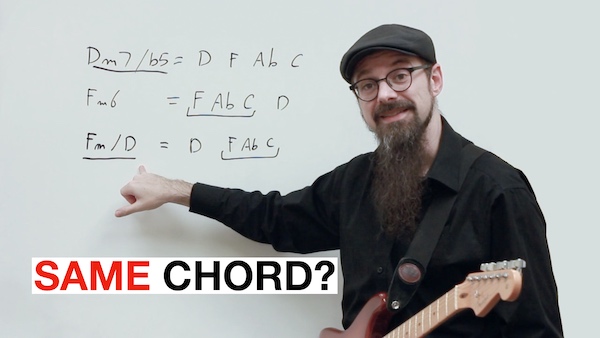
What Should You Call THIS CHORD? And WHY?
Do you know how to properly name chords? Do you know why some chords have multiple completely different names?
Click here to understand more about the names of chords

DO THIS If You Write Everything In The SAME KEY!
Does everything you write seem to come out in the same key, or same couple of keys? This is one of the most common problems that new songwriters have.
Click here to see how to write in more keys
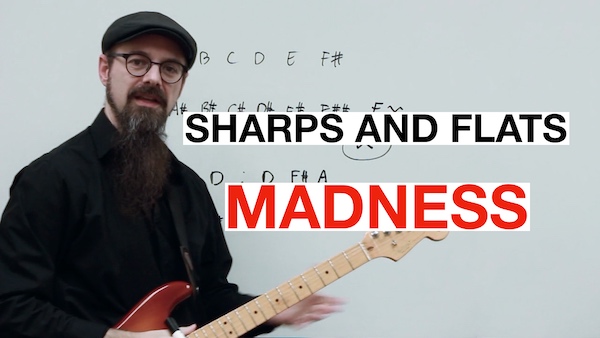
Why The Key Of G# Major Is A COMPLETE NIGHTMARE
Do you find the spelling of keys to sometimes be needlessly confusing? Do certain keys not make sense to you? It's all actually much simpler than you think!
Click here to see how to easily know the notes in any key
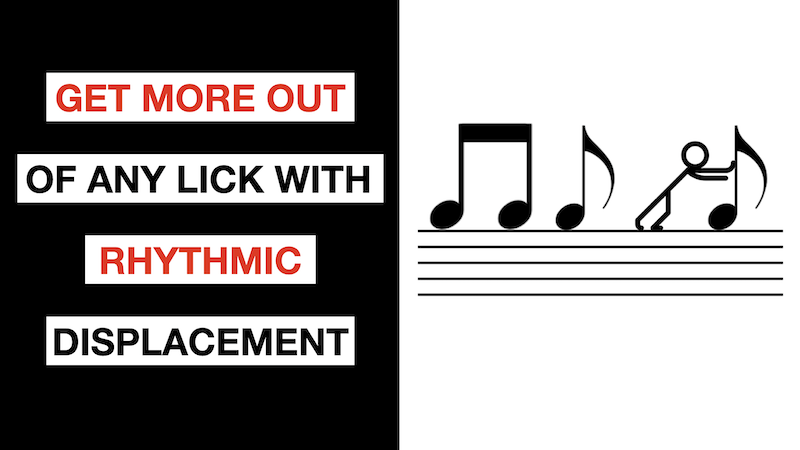
Get More Out Of Any Guitar Lick With Rhythmic Displacement
This article reveals a simple method to create endless variations from a single lick. By using this rhythmic technique, you can ignite your creativity and improve your improvisation abilities. You’ll learn to transform the sound of any lick you already know through this easy concept, while also boosting your rhythmic skills. Click the Link Below dive into the fascinating world of rhythm displacement.
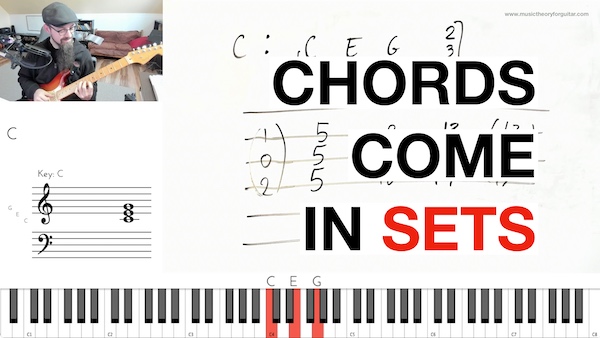
Why You're Learning Chords SHAPES On The Guitar WRONG!
Have you been learning chords wrong the whole time you've been playing guitar?
Click here to see how to properly learn chords
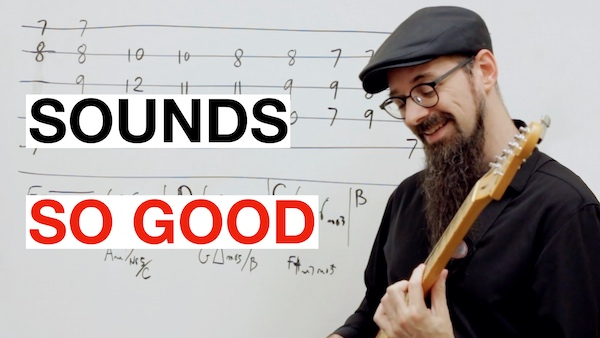
The Secret To This Amazing BAROQUE Chord Progression On Guitar
Do you want to play incredible sounding baroque chord progressions? Are the chord progressions you come up with too boring?
Click here to see how to easily write baroque chord progressions
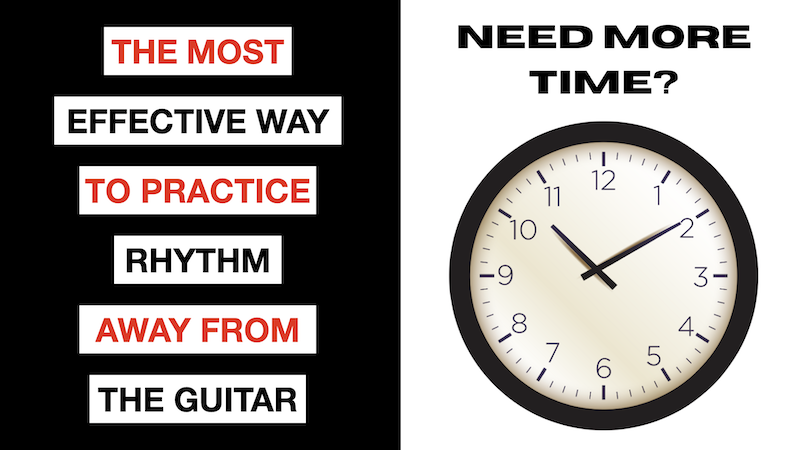
The Most Effective Way To Practice Rhythm Away From The Guitar
For many musicians, finding time to practice can be a challenge due to their busy schedules. It is important to understand that certain skills can be developed even when you are not actively playing the guitar. One of these essential skills is rhythm, which can be honed and improved when you are away from your instrument. In this video, you will learn how to effectively practice your rhythm skills anywhere, anytime.
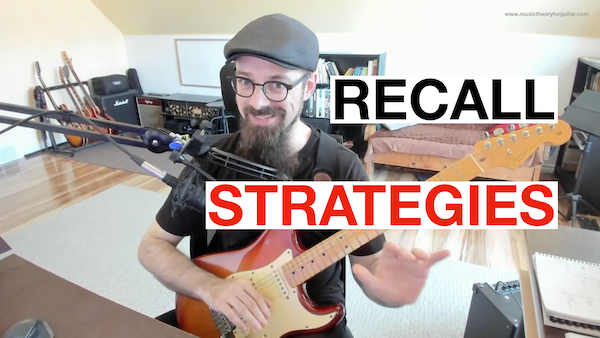
The SIMPLEST Trick To Memorize Music FASTER
Do you struggle with memorizing long pieces of music? Do you wish there was an easier way?
Well there is! Click here to see how to memorize music faster
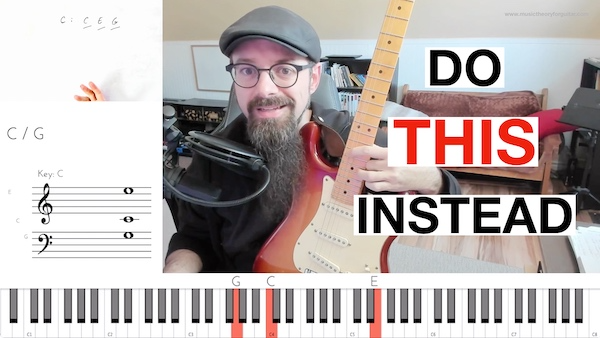
Should You Memorize EVERY Guitar CHORD? And How?
Are you overwhelmed by all the chords there are to learn on the guitar? Do you really need to memorize all of them to be a good guitar player?
You actually don't need to memorize them! Click here to see how to play every chord on the guitar

Is THIS The Best Way To Write CHORD PROGRESSIONS?
Is it feasible to write a chord progression by just trying every possible option?
Click here to learn about the effectiveness of triad and error
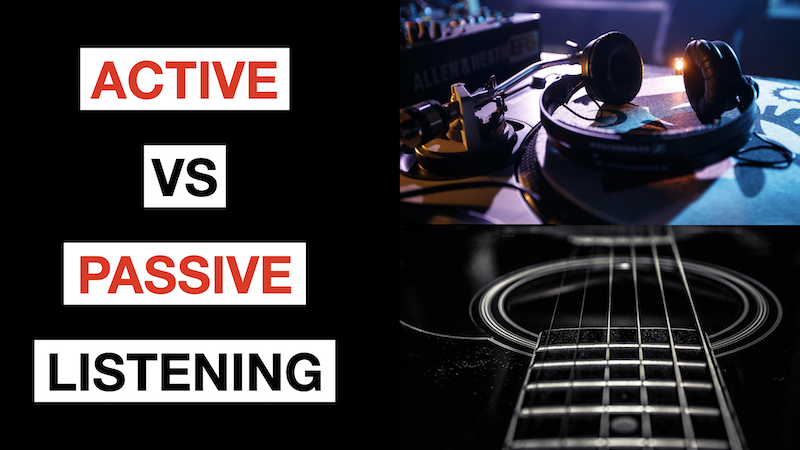
Active vs Passive Listening Skills
Your approach to listening to music can greatly influence how quickly you improve your guitar skills. Developing active listening as a skill can elevate your ability to understand music on a deeper level. In this video, you will learn about the various levels of listening. By actively engaging with the music, you will not only find listening to music a more rewarding experience, but you will also gain a clearer understanding of the musical abilities you need to work on.
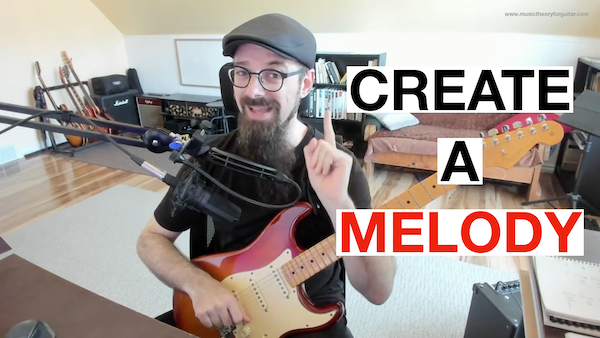
THIS Is Why Your Guitar Solos SUCK
Do your guitar solos sound disjointed? Are you just playing one memorized lick after another?
Click here to see how to create real melodies

How To Fix Your DEATH GRIP On The Guitar Neck
Do you squeeze the guitar neck way too tight when you're playing? Do you get tired or sore too quickly?
Click here to see how to use less tension on the guitar
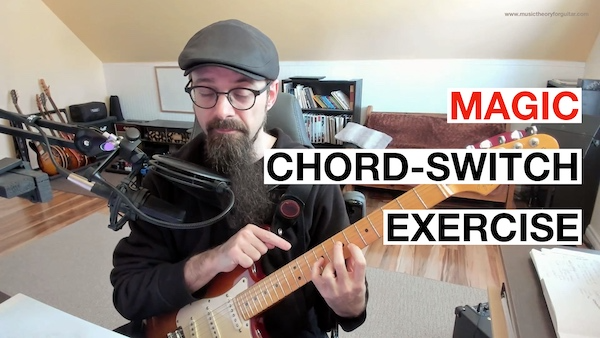
Playing Chords On Guitar Is HARD... Here's How To Make It EASY
Do you struggle with chord switches on the guitar? Do you find it difficult to get between complex or even simple chords quickly and smoothly?
Click here to see how to unlock faster chord changes
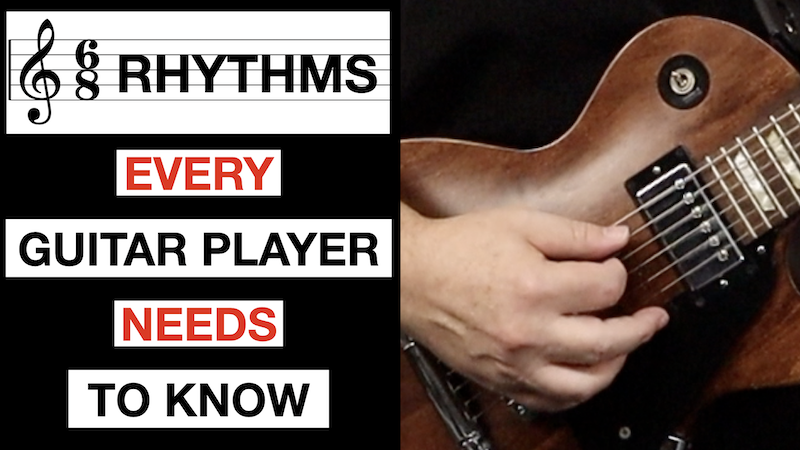
6/8 Rhythms Every Guitar Player Needs To Know
In this video, you will learn a variety of cool 6/8 rhythms and the best way to play each one, making it easy to incorporate them into your playing immediately.
Many songs use compound meter, so understanding how to strum these patterns is crucial for every guitar player.

Make your Blues JAZZIER In 3 Easy Steps
Do all of your solos sound the same? Do you always use the same simple licks over and over again?
Click here to see how to sound jazzier by using modes in your guitar solos
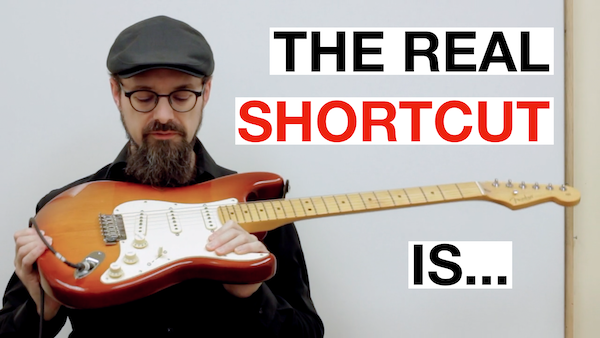
Is there a FAST way to learn music THEORY?
Is there a fast way to learn everything music theory would teach you? The answer may be more obvious than it seems!
Click here to see how to learn the music theory shortcut
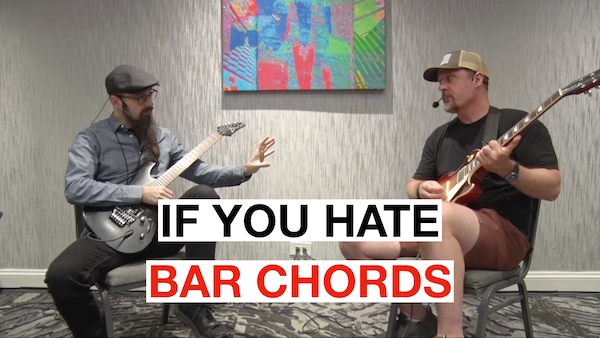
STOP Playing Bar Chords! Do THIS Instead!
Do you have a difficult time with bar chords? Or maybe you just don't like how they sound?
Click here to see what you should play instead of bar chords
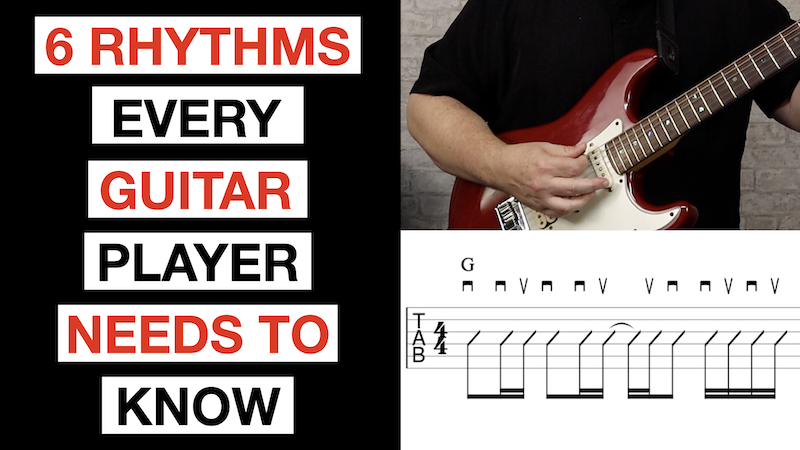
6 Rhythms Every Guitar Player Needs To Know
In this video you will learn six essential rhythms that are important for anyone who wants to become a skilled guitar player.
These versatile patterns are used in many songs and are crucial for anyone looking to excel in different musical settings.
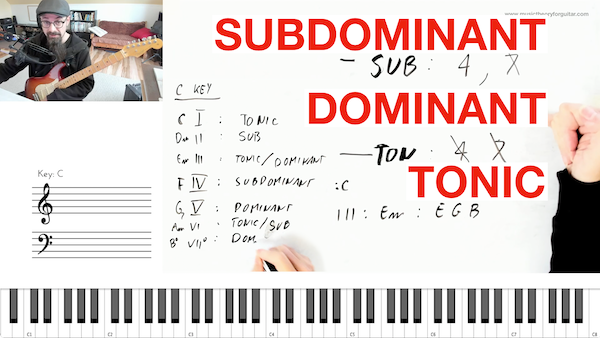
What's The Actual DEFINITION Of Harmonic Functions?
Do you struggle to understand terms like tonic, subdominant, and dominant? These terms can be quite confusing, and many people do not fully understand what they mean!
Click here to learn more about harmonic functions
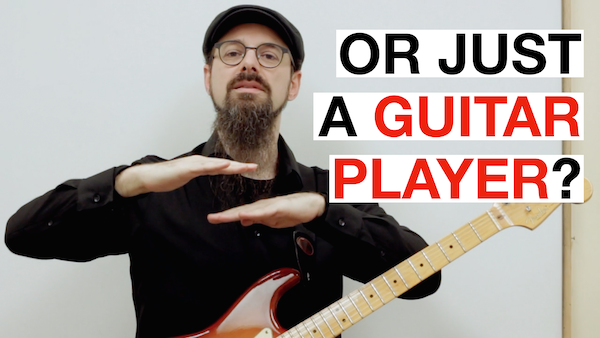
Does Playing Guitar Make You A MUSICIAN?
Are you a musician, or just a guitar player? Is there a difference?
Click here to see how to go from guitarist to musician
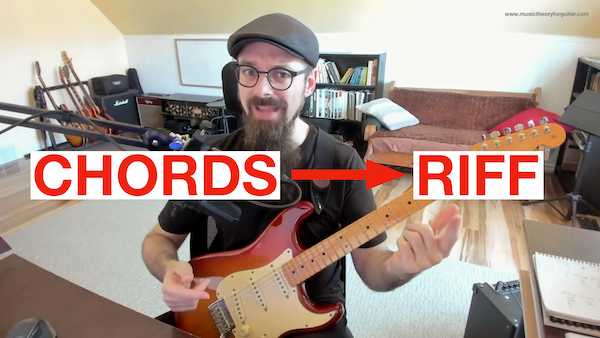
Use This Trick To Turn CHORD PROGRESSIONS Into RIFFS
Do you struggle with turning chord progressions into good guitar riffs?
Click here to see how to write riffs with chords
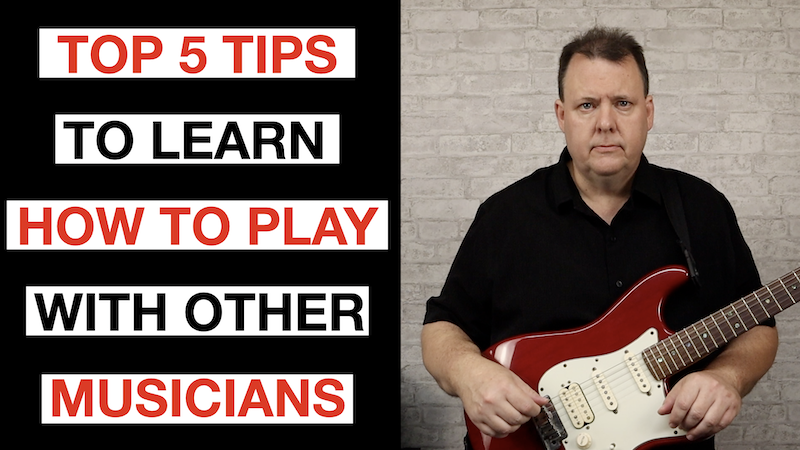
Top 5 Tips For Playing With Other Musicians
Are you intimidated by the thought of playing music with others? It doesn't have to be that way.
Click this link to watch the video right now.

Do THIS If You Find Music Theory YouTube Videos CONFUSING
Do you find a lot of the music theory content on the internet to be confusing? Then there is something you NEED to do to actually make sense of music theory!
Click here to see how to learn music theory the right way
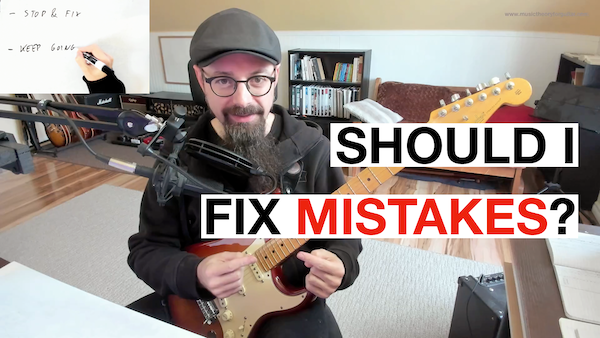
To STOP Or To KEEP GOING: How Should You Practice Guitar?
You have probably heard lots of differing opinions on if it's best to stop whenever you make a mistake, or play through your mistakes when you practice guitar. But what's actually the best method?
Click here to see the best way to practice guitar
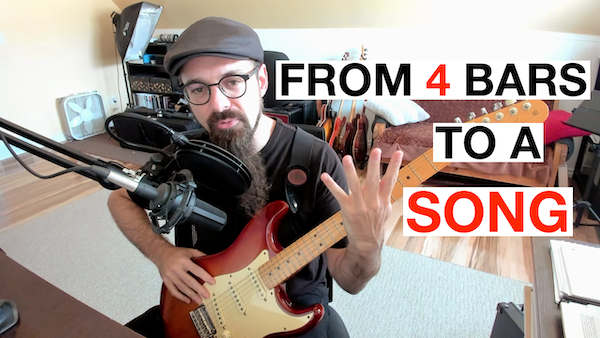
How To Go From A RIFF To A COMPLETE SONG
Do you have trouble turning your ideas into full, completed songs? It's one of the most common problems with new songwriters.
Click here to see how to turn your ideas into songs
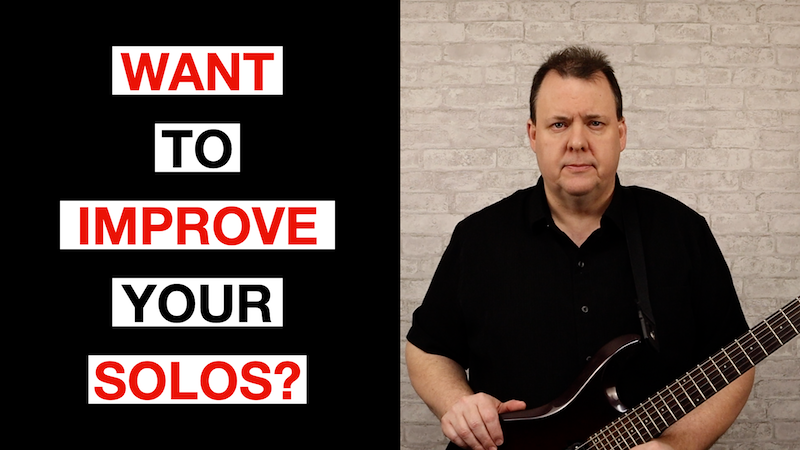
Looking to Improve Your Improvisation Skills? Try this:
Creativity isn't an innate talent—it's a skill that can be cultivated and refined through consistent practice and training. If you struggle with coming up with new ideas during improvisation and your solos start to feel repetitive, adding targeted rhythm exercises to your practice regimen can be highly effective. The techniques shown in this video are straightforward but have proven to be effective
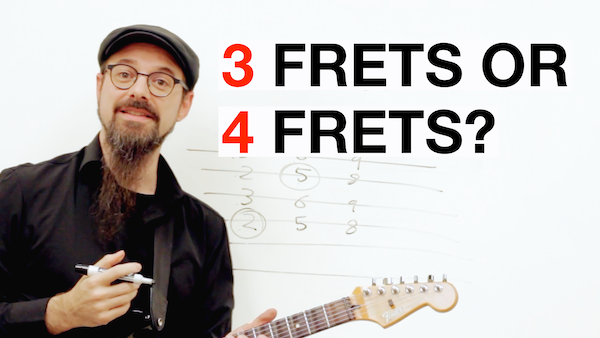
GUITAR PLAYERS And SIMPLE MATH: Why Doesn't It Work?
This is the simplest problem that so many guitar players get wrong!
Click here to see the answer to this question about repeating diminished chords
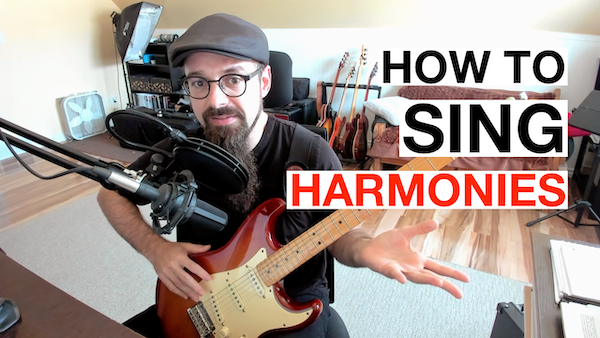
Do You Struggle With Singing HARMONIES? Try THIS!
Do you need advice on singing HARMONIES in your band? Lots of guitar players struggle with this!
Click here to see how to sing harmony vocals
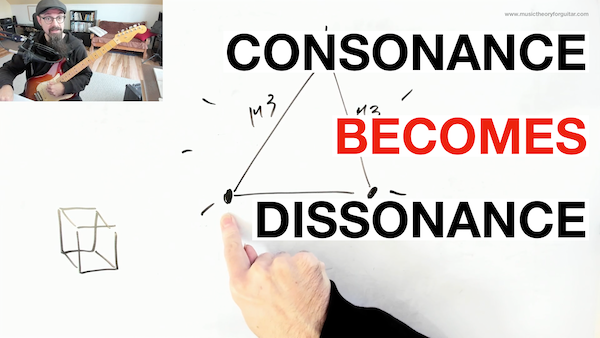
THIS Auditory ILLUSION Is Why Augmented Triads Sound DISSONANT
Have you ever wondered why augmented chords sound as dissonant as they do? Shouldn't they sound much less dissonant than diminished chords, considering they are made out of major thirds? The answer may surprise you!
Click here to learn what makes augmented chords dissonant
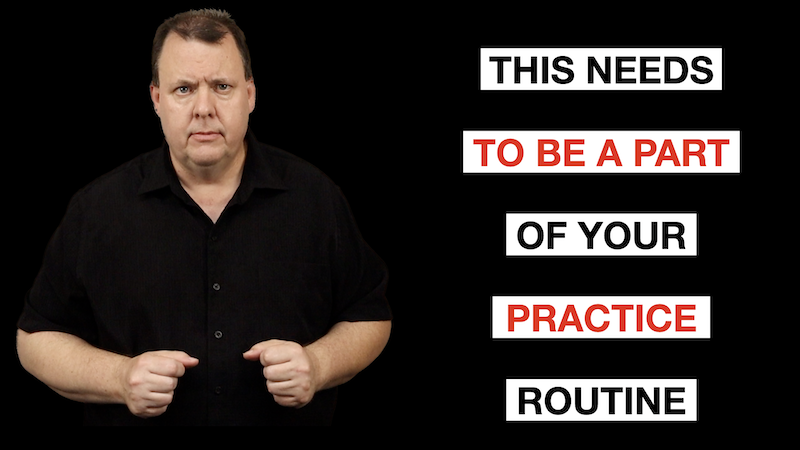
Make Sure You Make This Part of Your Rhythm Practice Routine
For some musicians, rhythm is easy. But for some it's not.
Everybody can learn, of course, but how do you get better? What do you in practice to have better rhythm skills?
Here are a few rhythm exercises for your guitar practice that you absolutely have to put in your practice routine.
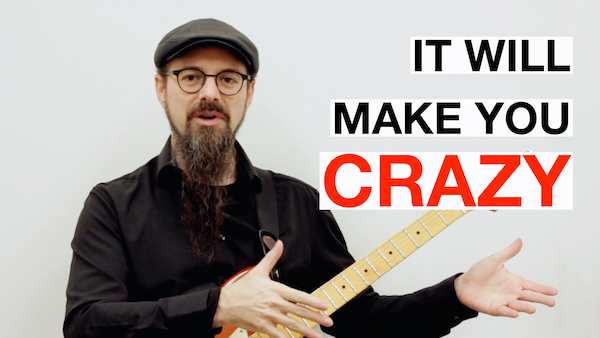
THIS Will Improve Your Rhythm... And Drive You INSANE!
What's the best way to improve your rhythm on the guitar? Well, I can certainly tell you the worst way!
Click here to see how not to improve your rhythm
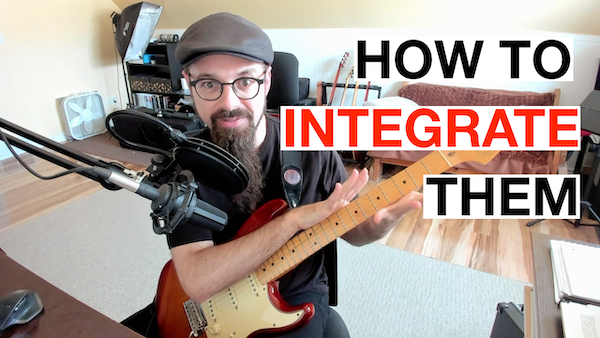
SCALES Or ARPEGGIOS -- Which Is BETTER For Lead Guitar Playing?
Do you struggle with playing the right notes over a chord progression when soloing? Many people say you have to just learn scales, many say to just learn arpeggios or chords, so what should you do?
Click here to learn if you should think more about scales or arpeggios
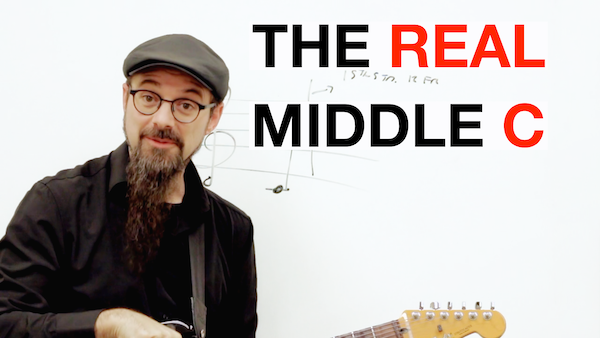
Why Guitar Music Does Not Fit Into The Staff
Where is middle C on the guitar? And what effect does this have on how we read sheet music?
Click here to see the problem with guitar and sheet music
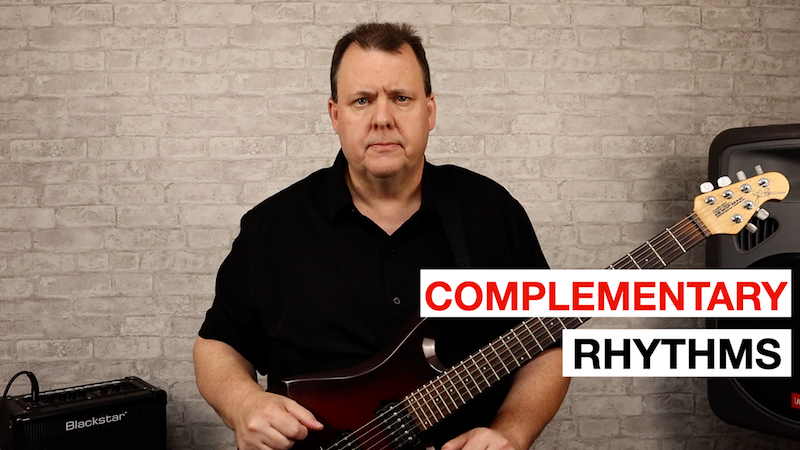
How to Create Complimentary Rhythms That Make Your Playing Stand Out
When you play with others, do you find that everyone is often playing the same thing? That is boring for you and your listener. Complementary Rhythms are the answer. They will boost your creativity and ensure you never run out of things to play. Watch this video to see how to make better rhythms.
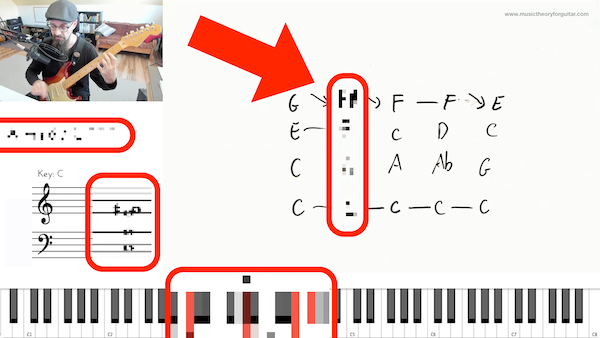
You've Probably NEVER Seen This Chord Before!
Do you want to add another chord into your harmonic vocabulary? Well I have a chord to show you that I can almost guarantee you've never heard!
Click here and I'll show you a chord you've never seen
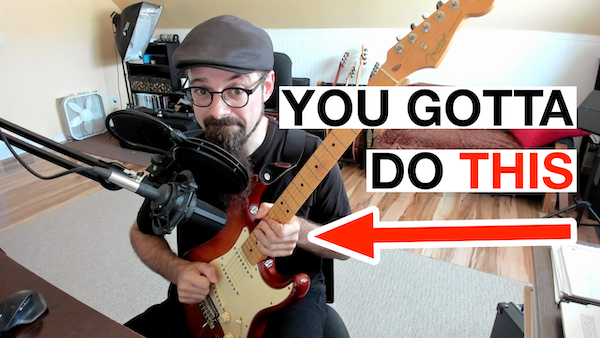
Use THIS To Make Your Chord Progressions Sound WAY BETTER
Do you want your chord progressions to sound better? Of course you do! If you use this tip, your progressions will instantly come out sounding more professional!
Click here to see how to write better chord progressions with voice leading

The WORST Advice That EVERYONE Gives Musicians
Is 'play by feel' good advice for guitar players? Is there any merit to believing in this method?
Click here to see if you should be playing guitar by feel
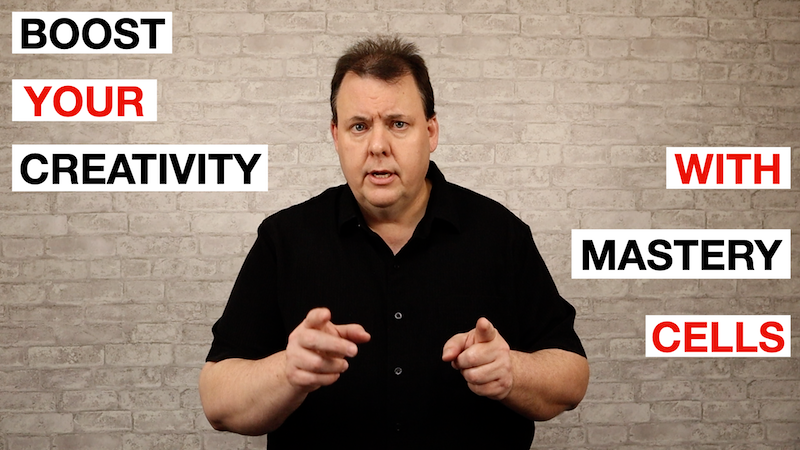
Boost Your Creativity with Rhythm Mastery Cells
Do you find yourself playing the same strum patterns or lead phrases all the time? Rhythm Mastery Cells will help you break out of the rut you are in. To learn what Rhythm Mastery Cells are and how to use them to boost your creativity, watch this video.
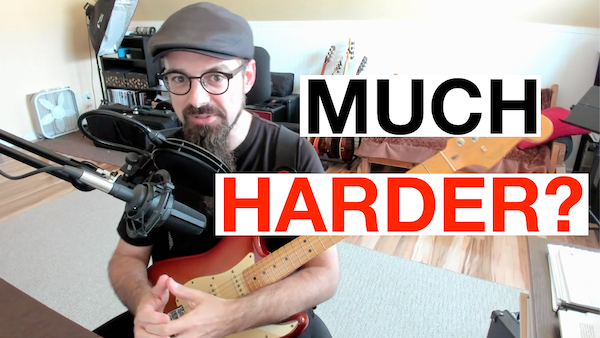
How To Transcribe HARMONY And Not Just MELODY
Do you struggle with transcribing chords progressions in songs? Maybe you are completely fine with transcribing melodies, but with chords it just doesn't work?
If this sounds like you, click here to see how to transcribe chords
Write SWEETER Chord Progressions With The HONEY CHORDS
Do your chord progressions always come out sounding boring and simple? Want an easy way to make them sound way more interesting?
Click here to see how to use the honey chords
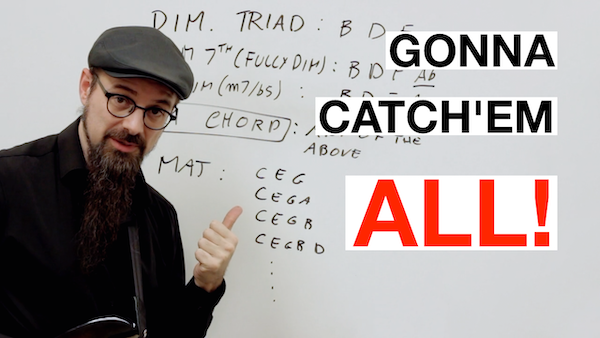
How Many TYPES of DIMINISHED CHORDS Are There?
Do you find diminished chords confusing? Do you not understand the difference between the different types, or when you should use them?
Click here to understand the 3 types of diminished chords
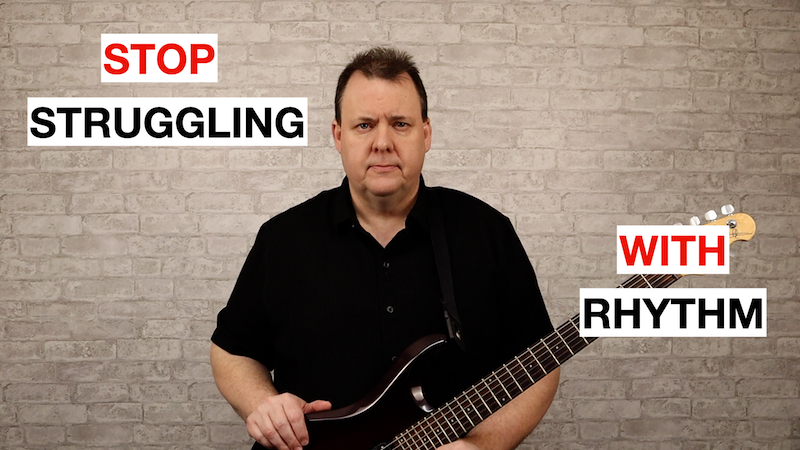
Top 5 Mistakes Guitar Players Make When Learning Rhythm
Why is learning rhythm so hard? Counting is easy enough, so why don’t you get it when it comes to music? There are 5 common mistakes that many guitar players make, which makes learning rhythm much harder than it needs to be. Click the link below to learn what they are and how you should be practicing rhythm: Top 5 Mistakes Guitar Players Make When Learning Rhythm
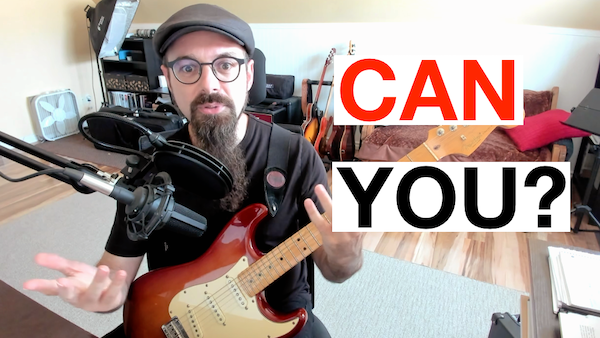
How Can YOU Tell If Your Music Is GOOD?
Do you struggle with knowing whether or not the music you write is any good?
Well, if that's the case I have some advice for you. Click here to see how to tell if your music is good.
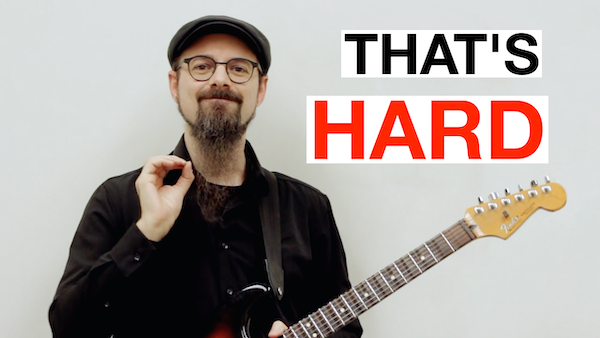
Why Is Doing THIS With A Metronome SO HARD?
Do you struggle with this super common metronome problem? I have a solution for you!
Click here to see how to use a metronome at extreme tempos
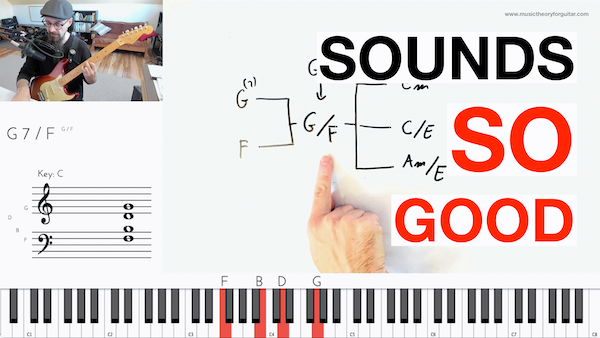
THIRD Inversion Is The BEST Inversion (For A 7th Chord)
Do you want your music to sound more interesting and emotional? Then you might need to broaden your palate of chords!
Click here to learn about third inversion seventh chords
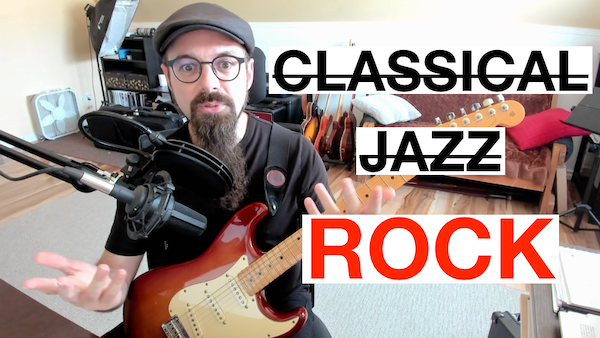
The Secret To HARMONIZING A MELODY (Rock Style)
Do you have trouble writing chord progressions to go along with the melodies that you write? Or maybe you want the chord progressions underneath your melodies to be more interesting?
Click here to learn how to harmonize a melody

Are You TOO DUMB For Jazz Music?
Do you feel like you aren't smart enough to listen to jazz music? Or maybe to just be able to fully appreciate it?
Nonsense! Click here to see why there is no connection between IQ and music taste
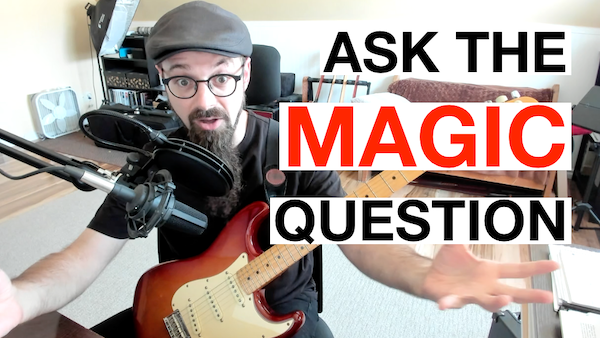
STUCK Writing A Song? Do This:
Do you have trouble getting past writers block when you write songs?
Click here to see how to stop writers block and write more songs on guitar
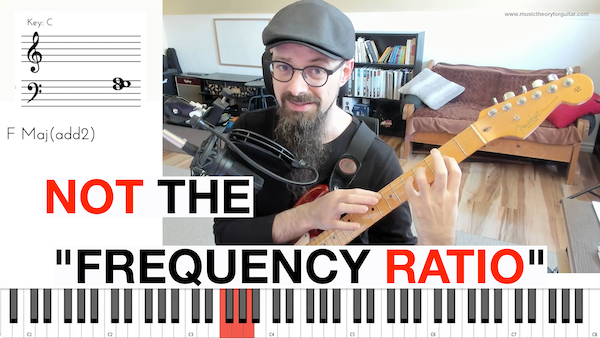
What Makes INTERVALS Sound Consonant or Dissonant?
Why are some intervals more dissonant than others? And can you make intervals more or less dissonant?
Click here to learn what causes consonance and dissonance in music
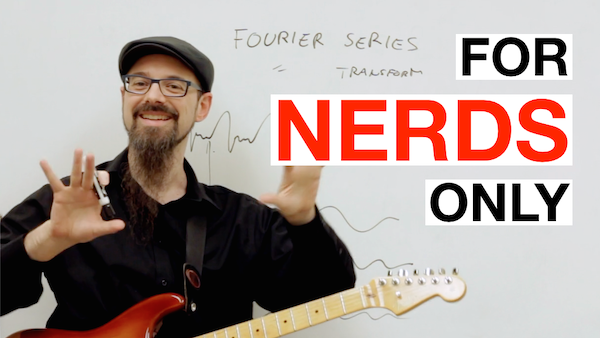
The SCIENCE Behind MUSIC THEORY
Do you want to understand the science of music? There is so many fascinating things to learn about what makes music work, and even if it doesn't make you a better musician, you will definitely find this to be an interesting topic if you enjoy music!
Click here to learn about the science of music
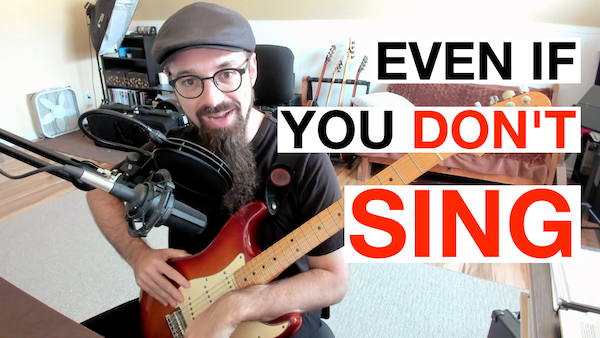
How To Write EXPRESSIVE Vocal MELODIES
Do you have an easy time coming up with melodies on the guitar, but struggle with writing melodies for a singer? There are a couple reasons why this seems to happen to a lot of guitar players.
If this sounds like you, click here to see how to write melodies for a singer
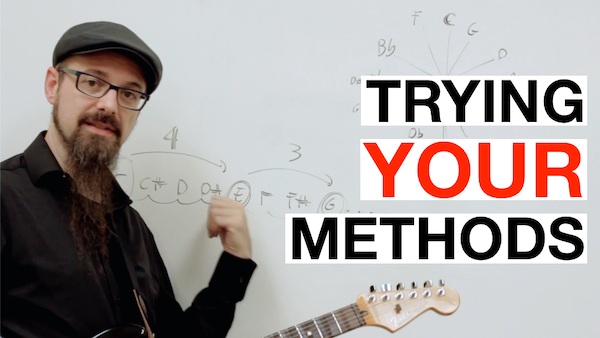
What Is The BEST WAY To Find The Notes In A TRIAD?
Is there a BEST way to find the notes in a triad? Everyone seems to have their own method, so which one is best?
Click here to see how to learn the best way to spell triads
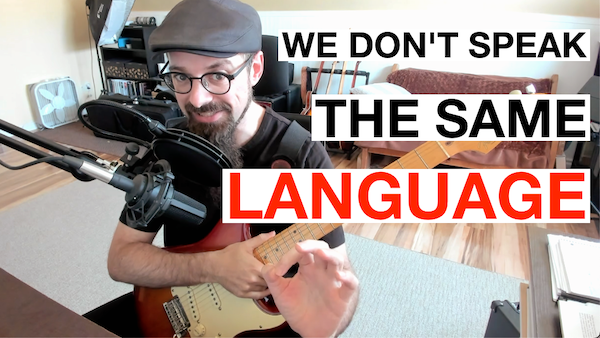
How To Explain Your Ideas To Your DRUMMER
Do you have lots of ideas for what your drummer can play in your songs, but you don't know how to communicate those ideas to them? Do you waste valuable rehearsal time trying to explain your ideas to your drummer, who has absolutely no idea what you are even trying to communicate?
Click here to see how to explain ideas to a drummer

The BASS-ics Of FIGURED BASS For Modern Musicians
What is FIGURED BASS notation? It's a form of chord notation that was common in the baroque era, and it's a very interesting concept to learn about!
Click here to learn all about the basics of figured bass notation
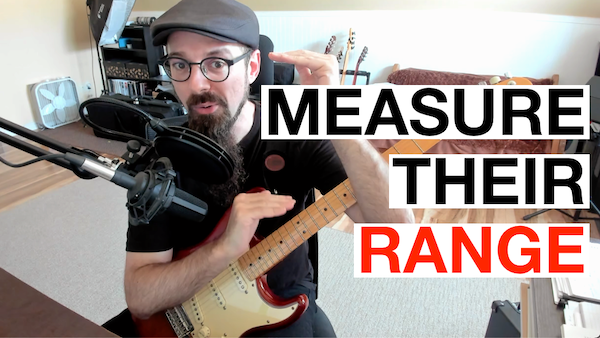
How To Find The RIGHT KEY For Your Singer
Is your singer always asking to change the key of songs? Do you find that your own voice sounds better in certain keys? There is a reason!
Click here to see why different singers need songs to be transposed, and how to find the right key for your singer
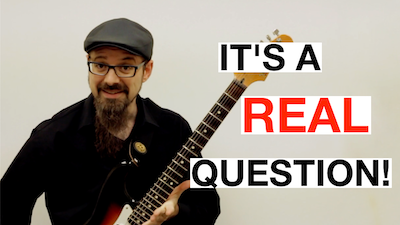
Can ACOUSTIC Guitar Players Learn From ELECTRIC Guitar Teachers?
Can an electric guitar player learn anything from an acoustic guitar teacher or vice-versa?
Should guitar players learn from different sources? Or should an electric guitar player only learn about the electric guitar?
Click here to find out what an electric guitar player can learn from an acoustic player (or vice-versa, or from any other instrument)
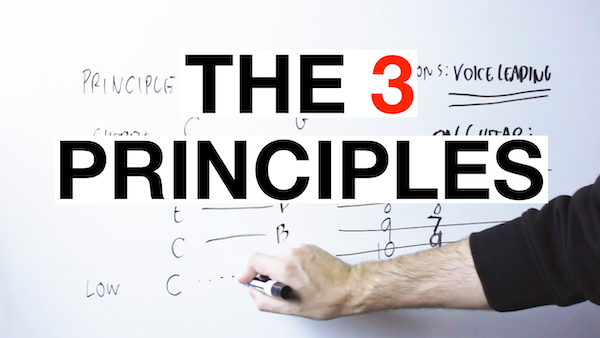
If MUSIC THEORY Is Confusing, Learn These 3 THINGS
Do you ever feel overwhelmed by the amount of things there is to learn in music theory?
If so, click here to learn about the 3 most important things in music theory
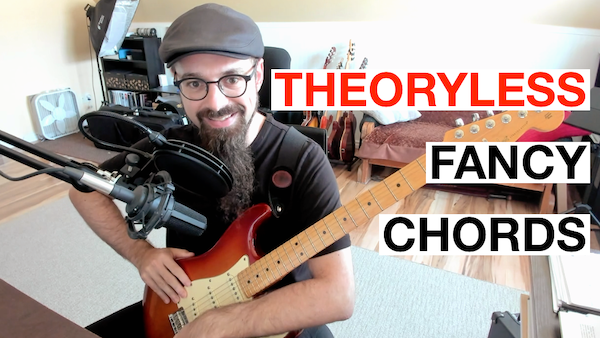
How To Write INCREDIBLE Chords Without Using ANY Theory
Do you want to write fancy chord progressions? Many people think you need to be an expert on music theory to write complex chords, but this actually isn't true!
Click here to see how to write fancy chords without theory
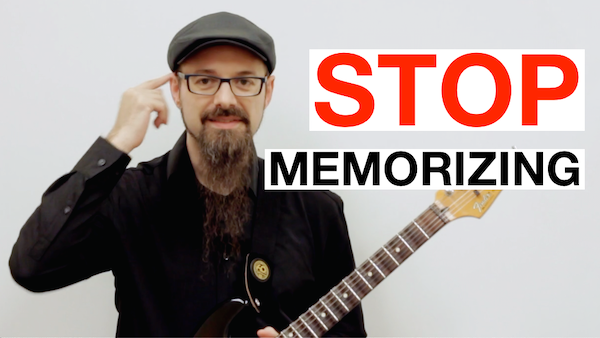
Why You Shouldn't Memorize ANYTHING On GUITAR
Are you making the biggest mistake that guitar players make when they try to memorize something on the guitar?
Click here to see if you are using the wrong way to memorize
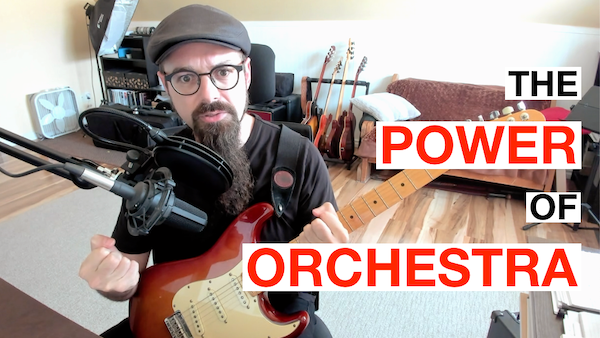
Using ORCHESTRAL Instruments To Make Your Music Sound MASSIVE
Have you ever tried putting orchestral instruments in your music? Do you struggle with making it sound good? Or maybe you are curious about trying to add symphonic instruments to your music?
If so, click here to see how to properly arrange orchestral instruments in rock and metal
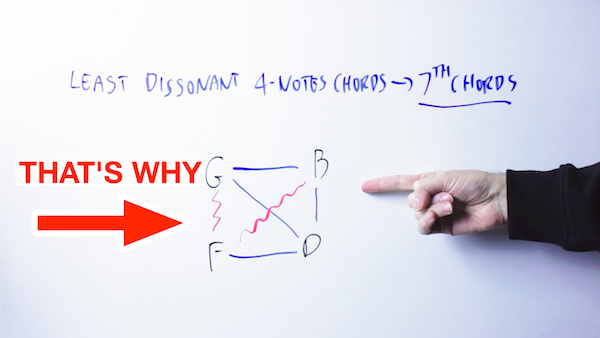
THIS Is What Makes TRIADS Special (And Makes Them Sound SO GOOD)
Have you ever noticed how much more common triads are than any other chords? There is a reason for that!
Click here to see why so much music is built around major and minor triads
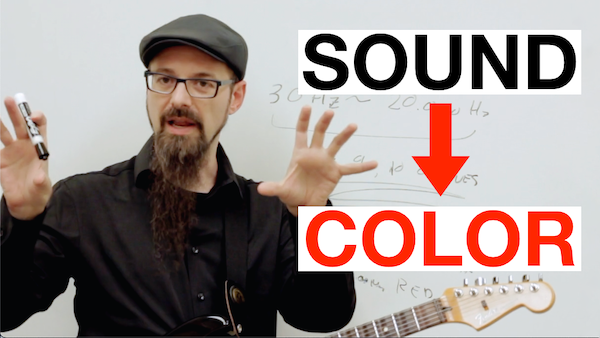
Does SYNESTHESIA Make You Better At MUSIC?
Have you heard of synesthesia? It's a very rare condition that causes you to see colours when you listen to music. There's also a lot of fascinating history and facts about it that I want to share with you!
Click here to learn more about synesthesia, colour, and sound
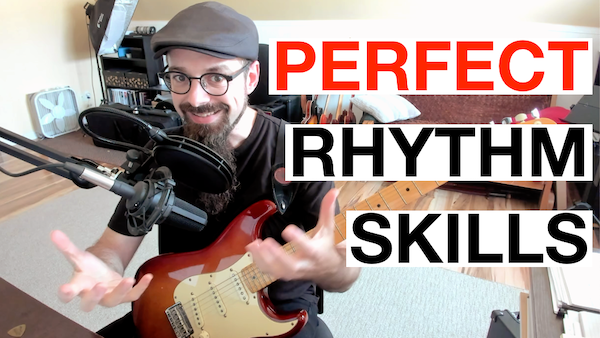
The SECRET To Playing Guitar With Perfect RHYTHM
Do you have trouble staying in time when you play guitar? Do you sometimes speed up or slow down without realizing it?
If so, click here to see how to improve your rhythm
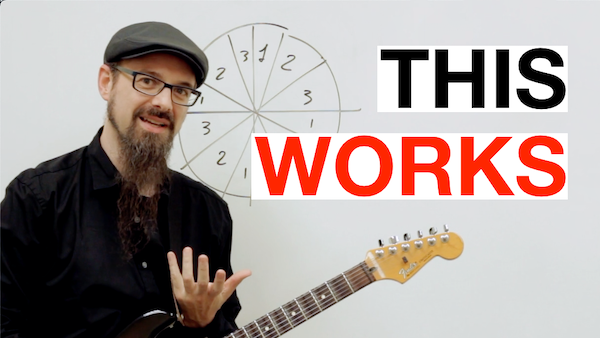
NO TIME For Guitar Practice? Watch This!
Do you want to make your guitar practice more effective? Well I have a few tips for you that will help you organize your time better when you practice, so you can improve faster.
Click here to see how to manage your practice on guitar
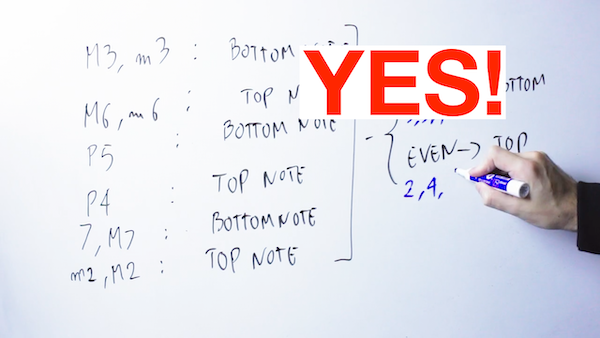
Do INTERVALS Have Root Notes?
Should one of the notes in an interval be considered the root note? Is there any benefit in finding the 'root' of an interval? Yes, and yes!
Click here to see how to know which note in an interval is the root note
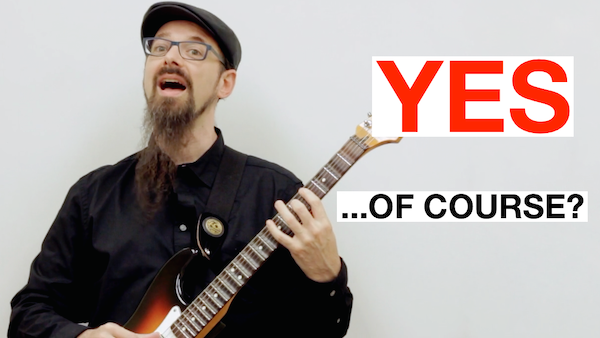
Are SCALES And MODES The Secret To Understanding The FRETBOARD?
Is it important to learn scales and modes on guitar? Are there better ways to learn and understand the fretboard?
There may be other things that are important to learn, but it will always be incredibly important to understand scales and modes.
Click here to see why you need to know scales and modes
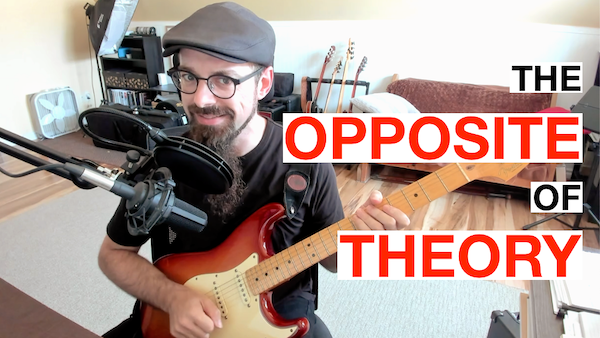
How To Write GREAT GUITAR RIFFS
Do you wish you could write better guitar riffs? Well, there are a few secrets I want to share with you that will instantly make you a better riff writer.
Click here to see how to write better riffs
Broadway Cadences: The Music Theory of Hazbin Hotel
You don't know how to end a song? Well, let's take a page from Broadway musicals and let;'s end your song with a bang! Here you will find 3 song endings used in the musical show Hazbin Hotel to inspire you.
Click here to see how to write Broadway-style song endings that really capture the attention of your audience.
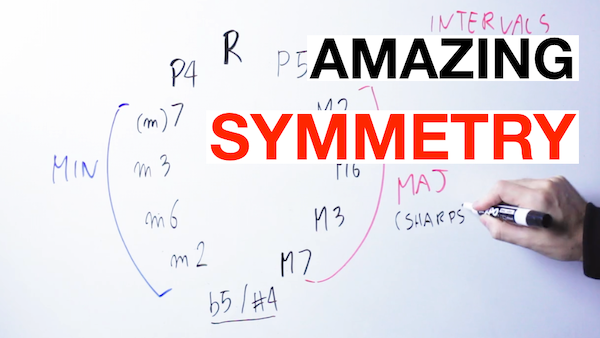
The REMARKABLE Connection Between INTERVALS And The CIRCLE OF FIFTHS
If you want to be amazed by how sophisticated and well thought-out our system of music theory is, look no further than this video!
Click here to learn about the relationship between intervals and the circle of fifths
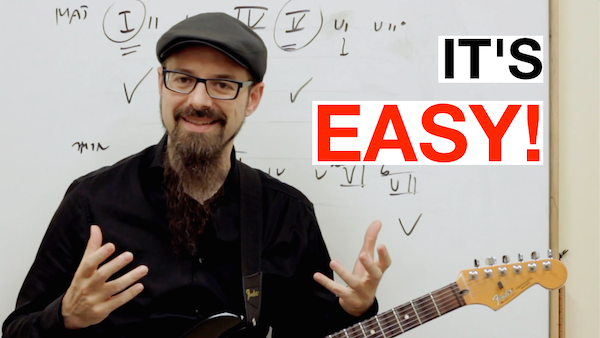
How Do You Actually USE Fancy CHORDS In A Progressions?
Do you love the sound of complex chords... but you have no idea how to use them in your music?
Click here to see how to write chord progressions with fancy chords
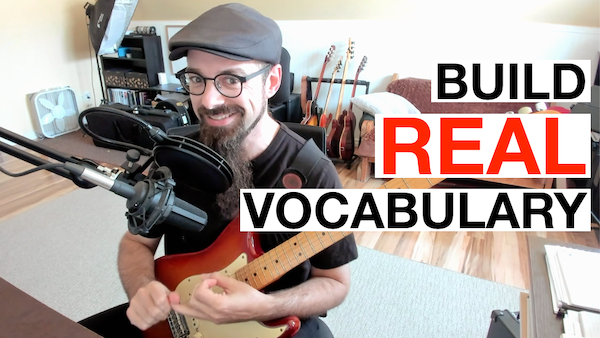
Guitar Licks Are USELESS - Do This Instead
Do you have an easy time learning lots of guitar licks, but you struggle with actually using them in your playing?
Click here to see how to use those licks in your solos
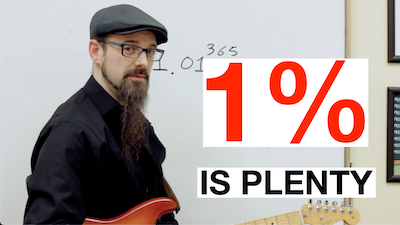
How You Can Become AMAZING At Guitar By Improving ONE PERCENT A Day
Do you feel like you aren't making progress on guitar? Do you want to know how to make more consistent progress?
Click here to see how you can make noticeable improvements by improving one percent every day
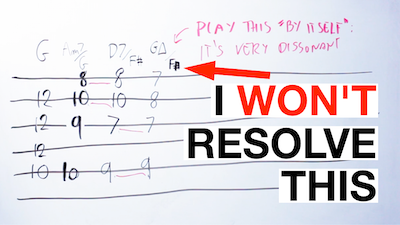
Do You NEED To Resolve Dissonant Chords?
Are you allowed to play multiple dissonant chords? You might think it unlikely that there is some governing body that creates rules about what chords you can and can't play, but you may be surprised!
Click here to see if you can connect multiple dissonant chords
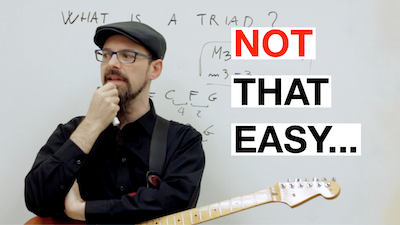
You Don't Know What A TRIAD Is
Why do triads have to be so confusing? It's just a combination of three notes - so why does there have to be so many rules? Well, there is actually a good reason for all those rules, so click here to see what makes a triad
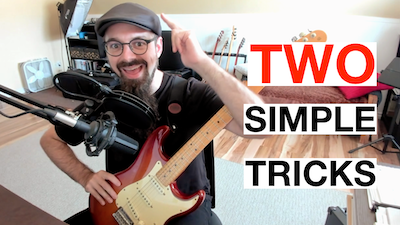
JAZZ for ROCK Guitarists - SIMPLE TRICKS To Sound JAZZIER
Do you want to sound like a Jazz pro without going to school for four years? If you learn a couple of simple tricks, you can sound like a Jazz player in no time.
Click here to see how to play Jazz on the guitar

The Differences Between BEGINNERS, INTERMEDIATE, And ADVANCED Guitar Players
How do you know if you are a beginner, intermediate, or advanced guitar player? Does it even matter?
Click here to see how to see why you shouldn't worry about being a beginner, intermediate, or advanced player.
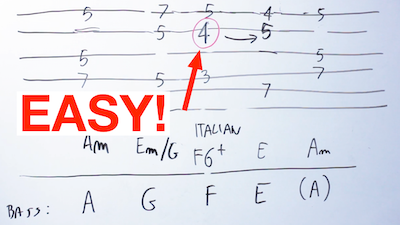
Spice Up Your Life And Your Chord Progressions With The AUGMENTED 6th Chord
Are your chord progressions sounding too BORING? Follow the link below to learn about a new chord that will make your progressions sound much more unique and interesting!
Click here to see how to use the augmented sixth chord
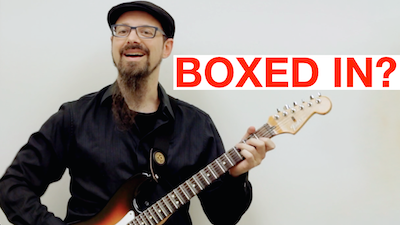
Play OUTSIDE The Box... Or BUILD A Box?
Do you want to be more creative? Do you want to write better music? There is one simple tip that you should master if so!
Click here to see how to write better songs
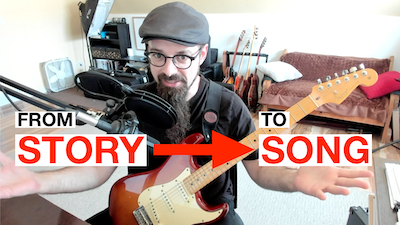
How To Use STORIES To Write SONGS
Do you want your songs and solos to tell a story? It's something that most musicians want, but very few know how to do it effectively.
Click here to see how to turn stories into songs
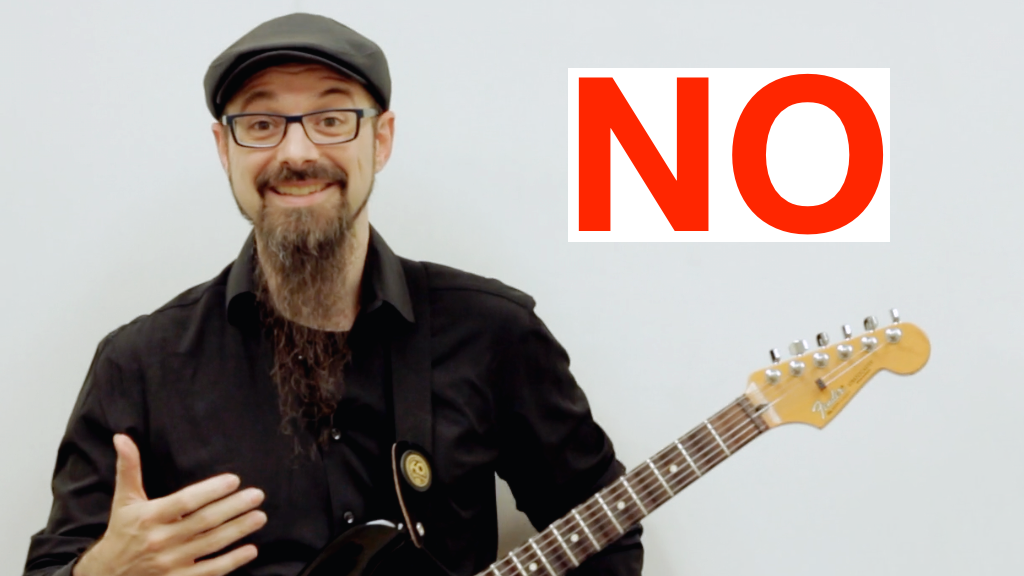
Is MUSIC Actually A LANGUAGE?
Is music a language? Many musicians consider it to be one, but I think they may be wrong...
Click here to see why music is not a language
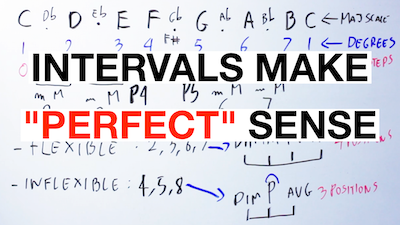
Why Some INTERVALS Are Major Or Minor While Others Are Perfect?
Is there a good reason for some intervals to be called major or minor while others are called perfect?
There is! Click here to see why only some intervals are called perfect
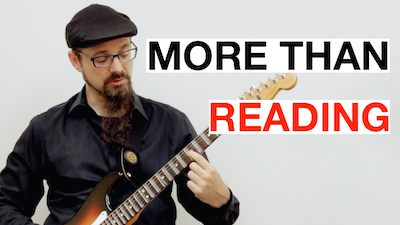
Why Even Learn The NOTES On The Guitar If You Can't READ MUSIC?
Is there a reason to learn the notes on your guitar fretboard if you can't read music? What other value is there in knowing the notes?
Click here to see if you should learn the notes on the fretboard
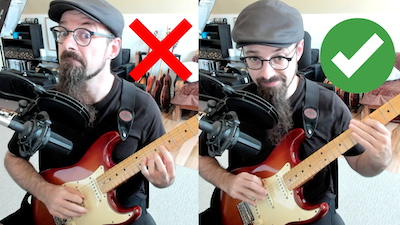
How To Use DIMINISHED Arpeggios In Your Solos
Do you have trouble finding a use for diminished chords in your music? Do they always sound wrong or out of place whenever you try to use one?
Click here to see how to properly use diminished chords.
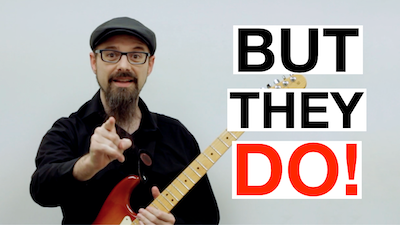
The "Famous Musician Knew NOTHING About Music Theory" EXCUSE
Is it possible for music theory to take away your creativity? Would musicians who use weird combinations of notes or non-traditional approaches sound worse if they understood theory?
Click here to learn about music theory and creativity.
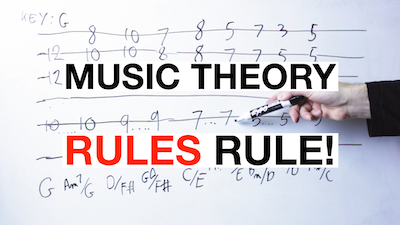
Write Great CHORD PROGRESSIONS By Following Simple RULES
Is it wrong to write music by following the 'rules'? Should you blindly follow your creativity or is there a reason to follow any rules? You might be surprised how great your music can turn out if you write it using rules.
Click here to see how to turn rules into chord progressions
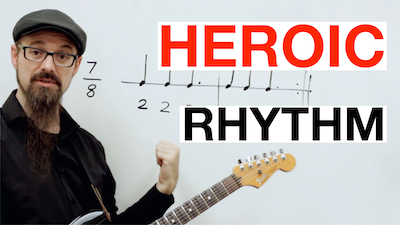
Why Does EVERY Superhero Movie Use THIS RHYTHM?
There is a hidden rhythm that gets used in almost EVERY superhero movie soundtrack, and you've definitely heard it before
Click here to learn all about the superhero rhythm
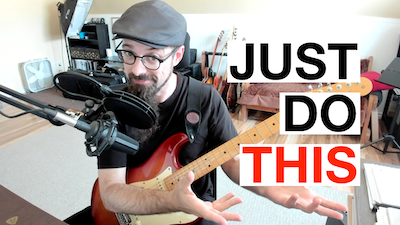
How Do You Become The SONGWRITER In Your Band?
What is the best way to write songs when you're in a band? How do you communicate your vision to them, and how much do you need to have done?
Click here to see how to be the songwriter in a band

The Chord Progression That Makes MOVIE SOUNDTRACKS Sound SO GOOD
What makes movie soundtracks sound so epic and cinematic? Are there any special tricks for writing music like this? You're in luck because there is a trick for this, and I just made a video on it!
Click here to see how to write cinematic chord progressions using chromatic mediants
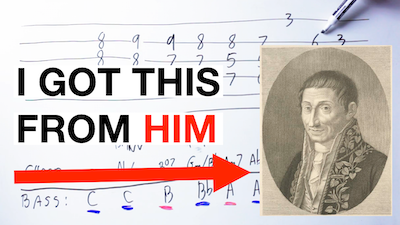
The Original LAMENT Bass Line HARMONIZATION Sounds AMAZING!
Do you want to know how to come up with beautiful chord progressions easily?
Of course you do! Click here to learn about lament bass
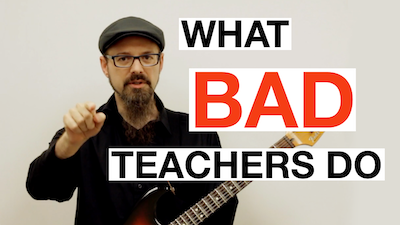
The PROBLEM With (Us) YouTube GUITAR TEACHERS
What makes a good guitar teacher? Do they need to be able to play at blazing speed to be a good teacher?
Click here to see how to pick the right guitar teacher
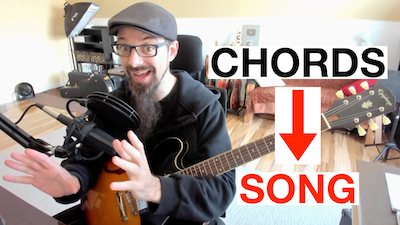
How To Turn A CHORD Progression Into A Complete SONG
Do you have an easy time writing chord progressions, but find it impossible to turn those progressions into songs? Look no further!
Click here to see how to turn your chord progressions into songs

Why You NEED To Understand INTERVAL INVERSIONS On Guitar
Why should you understand interval inversions? It may be confusing at first, but once you understand it your overall knowledge of music will improve.
Click here to learn more about interval inversions
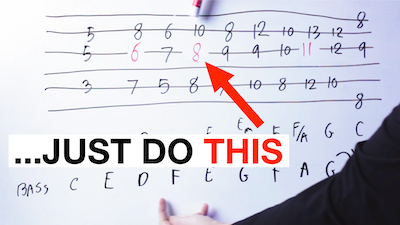
When The RETROGRADE Chord Progression Is Not SATISFYING
Do you want to write better chord progressions? I have a super simple trick for you that will jumpstart your creativity if you want to come up with something new.
Click here to see how to use retrograde to write chord progressions
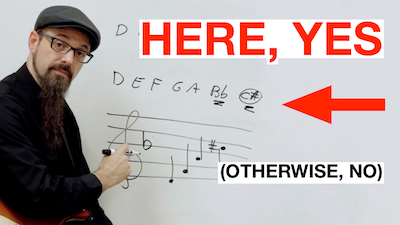
Are You Allowed To Use SHARPS and FLATS TOGETHER?
Are you confused by the many oddities of music notation? In this video, I hope to clear up at least one point of confusion that many people have.
Click here to learn about how to use sharps and flats
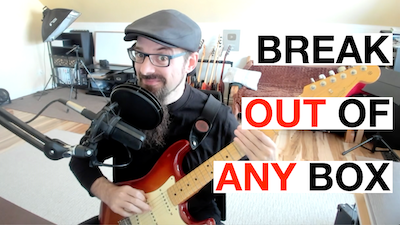
Break Out of THE BOX On GUITAR: A Practical Way
Do you have trouble breaking out of boxes on the guitar? Does your playing feel closed off, and you don’t know how to freely use your entire fretboard?
Click here to see how to break out of the boxes

When Is A Musical Idea TOO CRAZY?
If you see an idea about music theory that seems crazy, should you try it anyway?
Click here to see why you might be losing your creativity and sense of exploration if you don’t try crazy ideas at least occasionally.
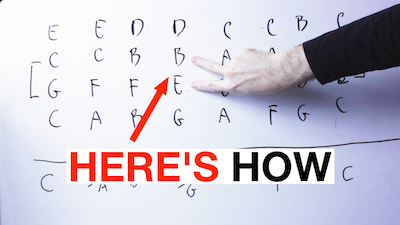
COMPLEX Chords And DISTORTION: How To Make Them Work TOGETHER
Do certain chords sound muddy when you play them with distortion on your guitar? Is there a way to play any chord you want, with as much distortion as you want, and still sound good?
There is! Click here to see how to play complex chords with distortion
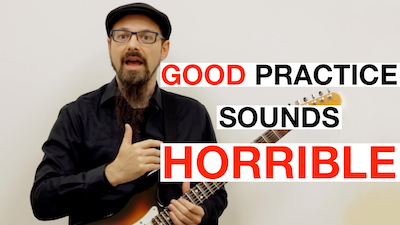
Practicing Guitar Is NOT Supposed To Sound GOOD!
Is the sound of your guitar practice making your roommates’ ears bleed? Is it causing irreparable damage to the relationships between you and your loved ones?
Well, even if that’s true, it probably means that you are practicing the right way.
Click here to see why sounding terrible makes you improve
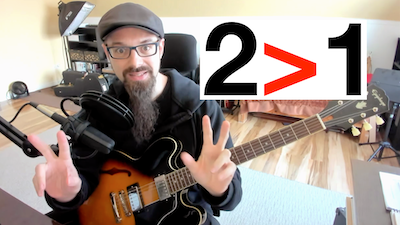
How To Use DOUBLE STOPS For Your Guitar Solos
Do you want a simple way to make your guitar solos way more interesting?
Then click here to see how to use double stops in your solos
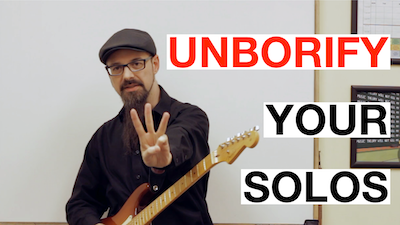
3 VITAL Tips To Make Your Guitar Solos LESS BORING
Do you wish there was some way to make more interesting guitar solos? Well, there are actually three ways!
Click here to see the three tips for more interesting guitar solos
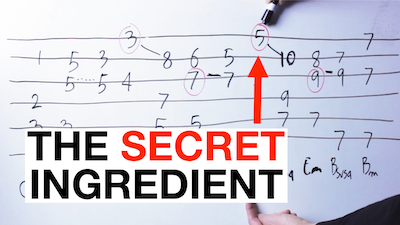
Circle of 5th + CHAIN SUSPENSIONS = Beautiful Chord Progression
Do you want to write music with the circle of fifths? Many chord progressions built around the circle of fifths sound a little bit stale, but I have a method for you that sounds fantastic, and it’s super easy to learn.
Click here to see how to use chain suspensions to write progressions
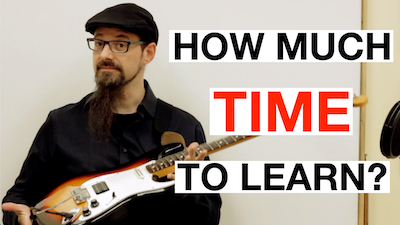
Why Does It Take SO LONG To Feel Like You've MASTERED The Guitar?
When you learn something new on guitar, how long should you take to master it? A month? A year? 47 fortnights?
Click here to find out how long you should take to master a new idea on guitar
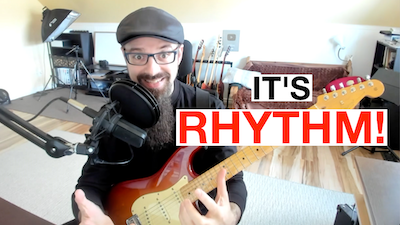
How To Practice The MOST IMPORTANT Musical Skill
What are the best ways to practice rhythm, the king amongst all musical skills?
Click here to watch a video where I show you how to practice for perfect guitar rhythm
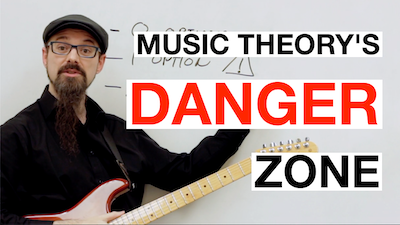
The DANGER ZONE: When MUSIC THEORY Hurts Your CREATIVITY (And How To Get Out Of It)
Does music theory hurt your creativity? If you learn it the wrong way, it might be.
Click here to see the right way to learn music theory
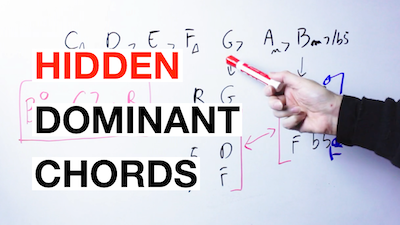
Are DIMINISHED Chords Just DOMINANT Chords In Disguise?
Are you tired of the same old chord progressions in your songs? Do you want a simple trick that can add a bit of spice to your writing?
Click here to see how we can substitute diminished and dominant chords for more interesting progressions.
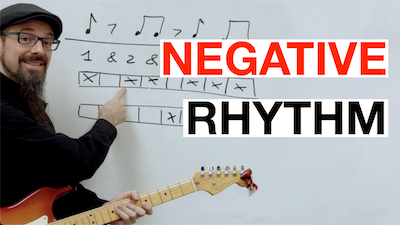
What Is NEGATIVE RHYTHM And How Can It Make You A Better Musician?
Do you want to improve your rhythm? Do you want to learn how to play in the pocket? Do you want a fun exercise that helps you with both?
If so, click here to see how to use negative rhythm
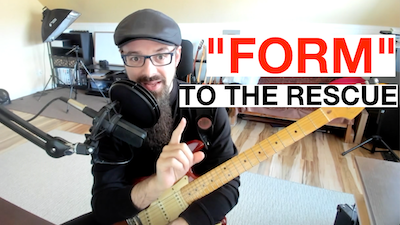
From Musical IDEAS To SECTIONS To SONG
Do you suffer from the number one problem among new songwriters?
It’s called ‘scattered section syndrome’, and millions suffer every year.
Click here to see the symptoms and how you can turn your sections into songs.

The RISE and FALL Of Music Theory [Why Academic Music Theory Sucks]
Does music theory seem way too confusing? Are there too many things to learn that don’t even seem practical or important? Chances are, you are learning the wrong kind of theory.
Click here to learn about the most important music theory
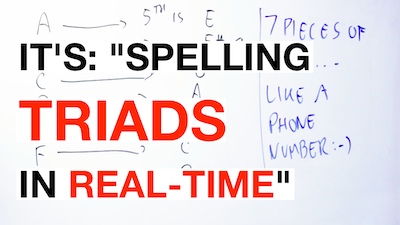
The FAST Way To Spell The NOTES In TRIADS On Your Guitar
Do you want a trick that makes music easier, that’s as simple as memorizing a phone number?
Click here to learn about memorizing the notes in major and minor triads.
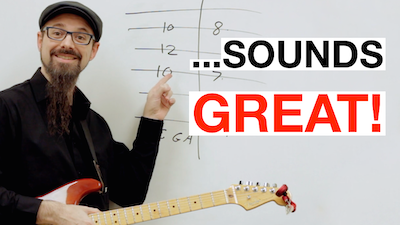
The MOST CONTROVERSIAL Chord In Music (According To YouTube Comments...)
Is the 65 chord the most controversial chord in music? According to some comments I got on a previous video, it seems like it is.
Click here to see me explain the controversy of the 65 chord
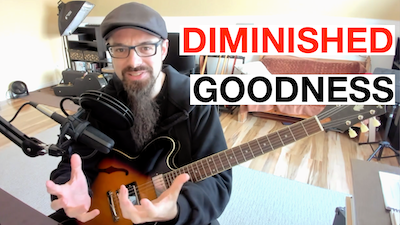
This GUITAR Scale Sounds BETTER Than You Think
Do you want to use the diminished scale in your solos, but every time you use it, it sounds terrible?
Click here to learn how to use the diminished scale in your solos
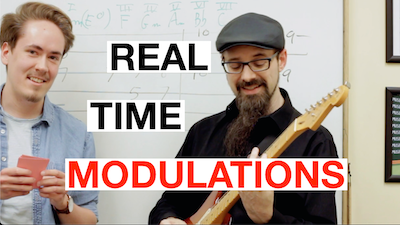
How To Practice MODULATIONS And Have FUN Doing It
Do you want to learn how to play in all keys, but tools like the circle of fifths are just too boring? Do you want a more interesting way to practice playing in all keys?
Click here to see how to make practicing modulations fun
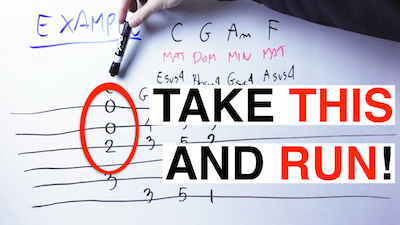
SUSPENDED Substitutions: Make Your CHORD PROGRESSIONS Sound Special
Do you want to make more interesting chord progressions without putting in any effort?
Then click here to see how to use suspended substitutions!
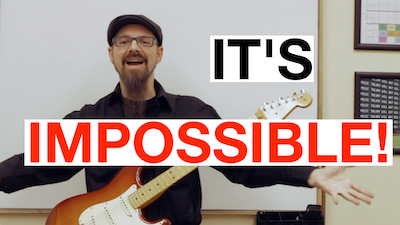
How To Do THE IMPOSSIBLE On Guitar
Do you want to play something on guitar but you feel like it’s just too HARD?
Click here to see how to do the impossible on guitar

Guitar Practice LASER-Like FOCUS: The Secret Of Massive Improvements
Do you lose focus from your guitar practice too quickly? Do you spend mere minutes practicing before your mind wanders off?
Click here to see how to focus on guitar practice for longer!
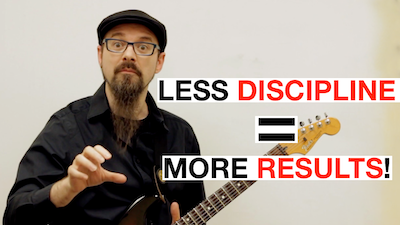
Discipline Is OVERRATED: How To Practice Guitar Without SUFFERING
So many people believe the best way to practice guitar is to sit down and practice the same thing for hours and hours and hours, is this true?
Fortunately for you, there is an easier way to practice that is also much more effective.
Click here to see the best way to practice guitar
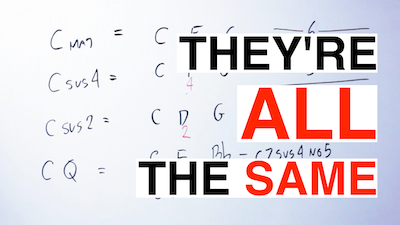
These THREE CHORDS Are All The SAME Chord
Have you heard of sus chords? What about quartal chords? If so, did you know that they are all actually the same thing?
Don’t believe me? Click here to see how sus and quartal chords are the same
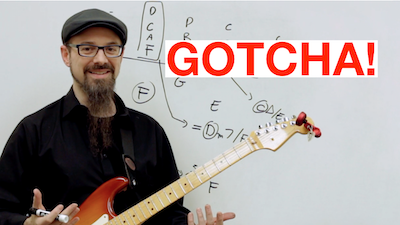
You DIDN'T NOTICE This Progression Is "Just" The CIRCLE Of 5ths
Is the circle of fifths just there as something that makes musicians sound more intelligent than they are? No! It’s a massively helpful tool that you can use to write better music.
Click here to see how to secretly use the circle of fifths
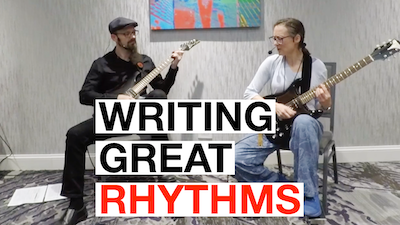
Why Your Guitar Rhythms Sound BORING (And How To FIX Them)
Do you want to come up with more creative rhythms on guitar? Do you want your rhythms to grab people’s attention immediately?
Click here to see how to be more creative with rhythm

The Trick BRIAN MAY Uses To Make One Note Sound MASSIVE
What is the most important trick for making one note on guitar sound massive?
Click here to learn all about pick raking.
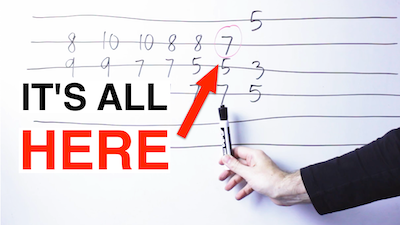
How To Write SATISFYING Modulations Using Chord SEQUENCES
Do you like key changes, but don’t want to sound like every cheesy pop song from the ’80s?
Click here to learn about a trick to modulate using chord sequences

MUSIC THEORY vs 'JUST FEEL IT': How Should You Write Music?
Many musicians seem to believe that you should write music ‘by feel’ and not think about theory, and many think the opposite, but who is right?
Click here to settle the debate, theory or feeling?
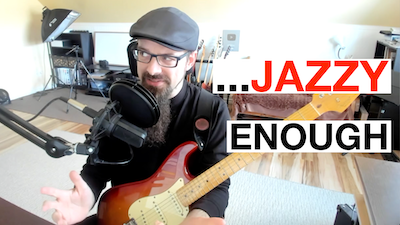
How To Convincingly FAKE Great Jazz GUITAR PLAYING
Do you like Jazz? Do you like the idea of playing Jazz, but don’t want to spend 30 years learning how? Look no further!
Click here to see how to do a convincing jazz impression

NOTES VS INTERVALS -- How Should We See The Guitar FRETBOARD?
For centuries (not really, but who’s checking?), music instructors, scholars, and professionals have argued on and on about which method is better, thinking about music with notes, or with intervals (or scale degrees).
If you want to find out which method is best, then click here to see which is better: Notes or Intervals.
>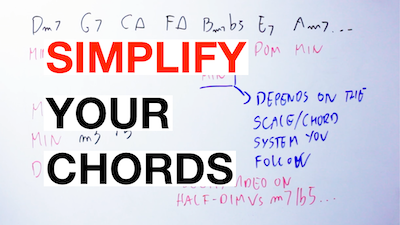
Why There Are Actually Only THREE Types Of CHORDS
Are you easily confused by the amount of different chords in music? Do you wish there was a way to group all the chords into a few simple categories that makes everything easier to understand?
Well, you can! Click here to learn about the 3 types of chords
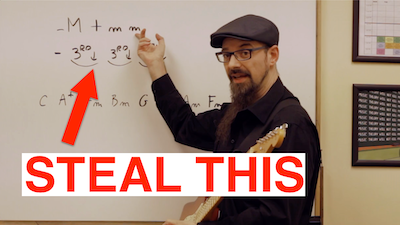
The SECRET Formula To Writing Great, Ultra-Modern Chord Progressions
Is it possible to use a formula to create music? It may sound crazy, but you will be surprised the kind of music you can make with this trick!
Click here to see the super-modern chord progression formula

The SECRET To Making A Climactic And Powerful GUITAR SOLO
Why is this chord so forgotten? It sounds amazing and can be a great addition to your bag of tricks!
Click here to learn all about the amazing 65 chord!
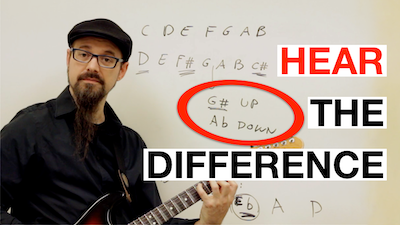
G# And Ab Do Not SOUND The Same
Do you find musical notation confusing? Is the fact that G# and Ab are the same note but can’t be used interchangeably making you question your sense of reality?
Click here to learn more about notation, sharps, and flats and clear up your confusion.
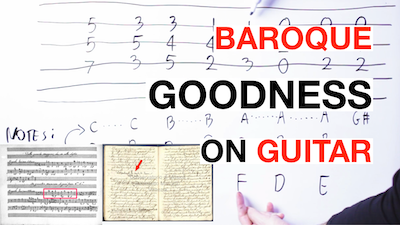
Why Does This BAROQUE Chord Progression Sound SO GOOD On Guitar?
Do you want a super simple chord sequence that you can use to spice up your songs, or even just to play?
If so, click here to learn about this killer Baroque chord progression
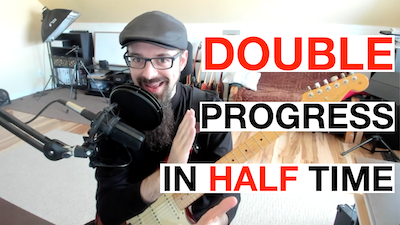
How Do You Get The Most Out Of Your Guitar Practice Time?
How much do you need to practice guitar every day? Are you practicing too little? Too much? Is there such a thing as too much practice?
Click here to see how you should be practicing guitar
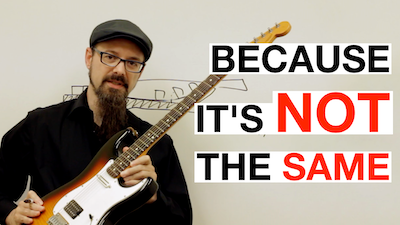
Why Use A SCALLOPED Fretboard When You Can Have TALLER FRETS?
Have you seen guitar players like Yngwie Malmsteen use scalloped frets and wondered why? Do you wonder why simply using taller frets wouldn’t work better?
Click here to learn the truth behind scalloped fretboards

What Is The '65 Chord' And Why Does It Sound SO GOOD On Guitar?
NEW!Why is this chord so forgotten? It sounds amazing and can be a great addition to your bag of tricks!
Click here to learn all about the amazing 65 chord!

The MOST COMMON Question About ROMAN NUMERALS In Music
Confused about roman numerals in music? Wondering why we use both capital and lowercase letters to write roman numerals?
Click here to have your questions about see how to roman numerals in music answered.
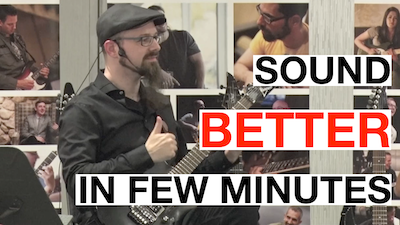
What Is The Best Way To Practice Bends And Vibrato On Guitar?
Vibrato: the MOST crucial technique in your lead guitar arsenal. Do you struggle with perfecting your vibrato and bends? Do you wonder what the best method is for practicing these techniques? Click here to find out the best way to practice guitar bends and vibrato
What Do 'Slash Chords' Mean For Us Guitar Players?
Have you ever heard of 'slash chords' and want to learn what they are? (and no, it's not any chord played by Slash from Guns'n'Roses) The video below will show you what they are, how they work, and how you can play them on your guitar Click here to see how to play slash chords on guitar
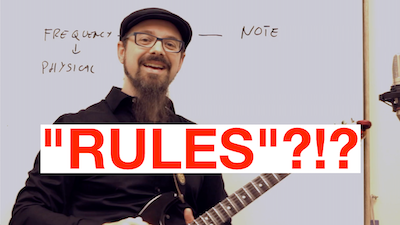
The BIGGEST Misconception About Music Theory
Is music theory a set of rules? Or is music theory just suggestions, or better yet, a way of explaining how certain sounds have been achieved by other musicians? Click here to learn more about the rules of music theory (or lack thereof)

GUITAR Theory And Piano Theory Are Not The Same
You may think that "music theory is music theory"... but in reality most music theory as we know it is "piano theory". That is music theory explained by piano players to other piano players. And we guitarists are left with the short end of the stick. Click here to see why guitar theory is not piano theory

Is There A Right And Wrong Way To Learn Technique On Guitar?
Is there a correct way to learn technique on the guitar, or are there multiple 'correct' methods depending on the person? Click here to learn more about correct guitar technique (or lack thereof)
What Is The Bach Minor Scale?
The melodic minor scale is a point of confusion for many people, and apparently for Bach as well, as he had a different way of using the scale, which is what I will be talking about in the video below. Click here to see how he turned melodic minor into the Bach minor scale
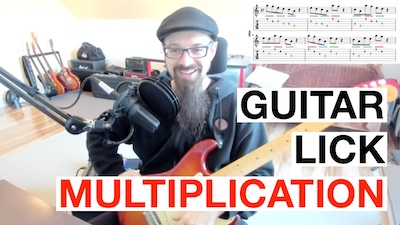
How To REMIX Your Guitar Licks And Expand Your Lick Vocabulary
I am a big believer in making things as simple as possible... but not simpler than that! If you are watching my video for entertaining value, maybe skip this one. But if you are game, in this video I'm showing a transformative technique to write guitar licks that will make you a much better guitar player Click here to see how to remix your guitar licks directly on your fretboard.
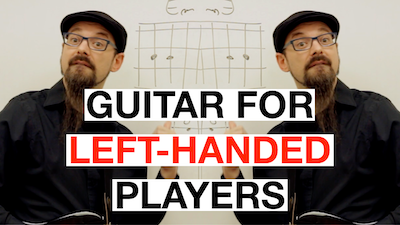
How to Read Guitar Diagrams as a Left-Handed Player
Are you left handed? If so, a lot of educational material for the guitar can be very difficult to understand, so I've made a video that shares a few tips to make your life a little bit easier. Click here to see how to learn guitar left-handed
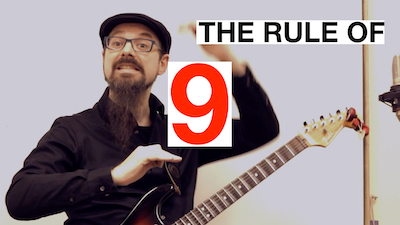
The Rule Of 9 For Inverting Intervals
Are you confused by the concept of inverting musical intervals? Does it make sense to visualize the guitar fretboard as six stacked piano keyboards? These questions and more will be answered in my most recent Q+A video, which you can find below: Click here to learn more about interval inversions, and to have the rest of your Q's A'd.
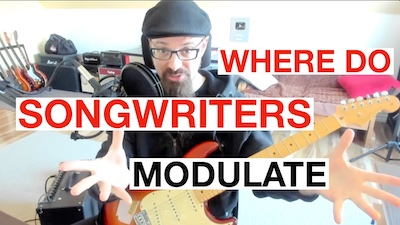
STOP Writing Songs In A Single Key [Here's How]
Most songs are not in a single key. Yup, there are some exceptions, but most songs do change key. The question is where in the song do they change key? And how do they do it? When it is appropriate to do, and when not? Click here to see when to change key in a song. If you are a songwriter, this is must-know information.
What Can We Learn From Legendary Film Composer ENNIO MORRICONE?
Do you find yourself lying awake in the middle of the night, wondering what makes the theme song in 'The Good, the Bad, and the Ugly' SO iconic? Well, wonder no longer! In my most recent Q + A video, I will answer this exact question so that you can finally get to sleep at night. Click here to see Ennio Morricone's writing advice to create beautiful, immediately recognizable music.
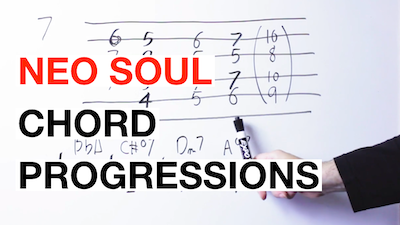
The 7 Steps to Writing a Neo-Soul Chord Progression
Neo-Soul is the sound that has been taking over the social media guitar world for a few years now, and if you enjoy this sound, there is a really easy method to writing chord progressions in this style! Click here to see how to write neo soul chord progressions in 7 simple steps
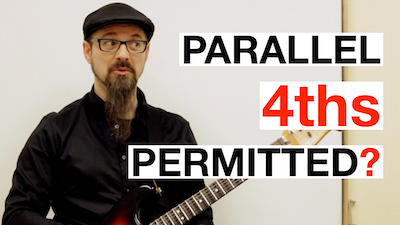
Why PARALLEL 4THS Are Fine If Parallel 5ths Are Frowned Upon?
We all know that in (some) classical music theory parallel 5ths are forbidden. Or at least, most of us know, and half of us do not agree with the prohibition (I use them all the time, on purpose) But if parallel 5ths are forbidden, what about their inversion: are parallel 4ths forbidden? Click here to see why parallel 4ths are not forbidden, not even in Classical theory, and why they sound great! (Especially on guitar)
To WIN At Guitar, Embrace FAILING [See Me Playing This Wrong]
One of my pet peeves regarding the online guitar community: everybody is wayyy to perfect to be real. But it's my job to occasionally show you the 'dark side' of music. So in this video you are going to see me struggling with a lick idea, and you'll see what works and what does not, and how many twists and turns we take. Click here to see the struggle with octave displacement guitar licks

Simple Trick To Make COWBOY Chords Sound PRO
Do you want to impress your family and friends with pro guitar playing but don't want to do any work or practice? Then **chord fills** are the technique for you! With the lift of a finger you will instantly sound much better when playing open chords or 'cowboy chords'. Click here to see how to play chord fills on guitar

How To Get More IDEAS To Finish A Song? [That's The WRONG Question!]
"I got an idea for a song. Now, how do I go from this to a full song? How do I get other ideas to complete my song?" Sorry if I offed someone's artistic sensitivity with that... but that's the wrong question. You do not need to come up with "other" ideas to finish a song. Indeed coming up with "other" ideas will likely make the song worse, not better. Instead, you need to learn how to leverage the ideas you already have. Click here to see how to finish a song

Can You GUITAR IMPROV Without Knowing Your Notes?
Since I published my revolutionary video on memorizing the notes on your guitar fretboard, I have had the most interesting questions about it. Today I'm answering one of these exciting questions. And that's a question I received in spades. Click here to see knowing the fretboard notes can help for improvisation
Use APPOGGIATURAS To Write Emotional Melodies On Guitar
If I told you that just by adding one note (yup, a single note) to your melody you could make it 100% more emotional, would you believe me? Well, you don't have to believe me! You can just watch the first few seconds of this video and make up your own mind! Click here to see how to write emotional melodies on guitar using the one-note-wonder trick called Appoggiatura.
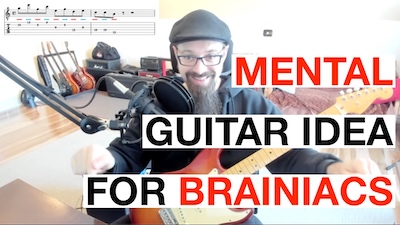
CRAZY And Complex Idea To Generate Guitar Licks [But It Sounds Good!]
In the last weeks I got several requests for a "crazy technique for guitar". Challenge accepted! Cut your teeth on this one guys :) Click here to see how to write hybrid guitar licks. Crazy, but it works!
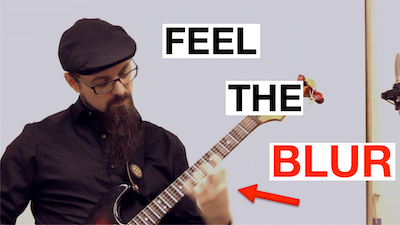
How To Write Long, Satriani-Esque Legato Lines
If you often try to come up with longer, more intricate legato lines but keep coming up short (shoots finger guns), then I have 3 tips to share with you in my most recent video. If you are a fan of Joe Satriani, you should definitely check out this video :-) Click here to see how to write longer, flowing legato lines
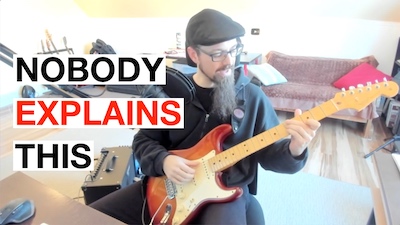
"Take It Around The FRETBOARD" [Guitar Skills Nobody Explains]
The other day I was talking with this student of mine, and after showing him an idea I ended up (like I often do) with: "... and then you take it around the fretboard". And that's where he caught me: "What do you mean with that exactly?" Click here to see how to take a lick around the guitar fretboard
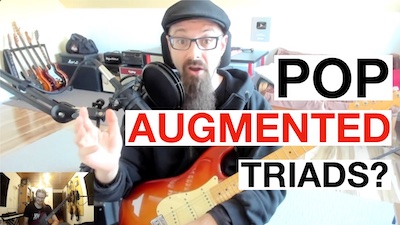
AUGMENTED Triads For The Dissonance-Intolerant Musician
The augmented chord is the least used triad. Why? Because by itself it sounds strange and alien and dissonant... So imagine my surprise when a student asked me: "How can I use augmented triads in a pop song?" Challenge accepted! Here you find not one, not two, but three ways to use an augmented chord in a pop song

Guitarists: If Your FINGERS Are Like OCTOPUS Tentacles... Do This!
"My fingers have a brain of their own. They are like Dr. Octopus' tentacles (from Spiderman)" Well, here is the dirty little secret of playing guitar: we all have octopus fingers. The best players simply found a way to keep them under control ;-) Click here to see how to make your finger do what you want and eliminate bad guitar habits
Great Melodies Using NEIGHBOR Notes On Your Guitar
Today we see an idea that is periodically "rediscovered" in music. And every time they discover it, they give it a different name. So what we do today can be called in different ways: from "neighbor note" to "note di volta" to "enclosure"... Click here to see how to write a melody using neighbor notes on guitar
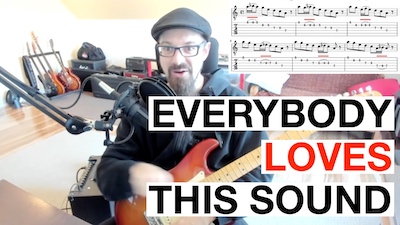
How To Add This "MYSTERY Sound" To Your Licks [In Depth Lesson]
Today's sound is hard to describe, but of you watch the first seconds of the video, you'll get what I mean immediately. In this video I am showing you not only a few licks with this sound, but I am also showing you how to write your own licks, and how to change the lick you already know to accommodate the 'mystery sound' Click here to see this original way of guitar phrasing your licks.
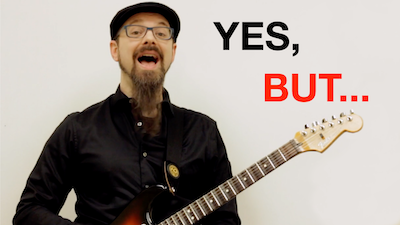
Should BEGINNERS Memorize The Guitar Fretboard ASAP?
Is it ok for a beginner to learn the notes on the fretboard, or would it be better to start somewhere else? I answer this and other thorny questions in this brand new video: Click here to see what is best for beginner guitar practice
Using SUSPENSION In Your Guitar Melodies
In the past few weeks, I've received more and more emails from you, my dear subscribers, about how to write melodies. So today I show you one of my favorite tricks to write melodies. Click here to see how to write melodies with suspensions
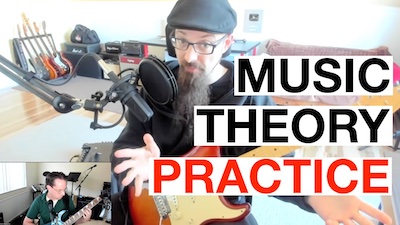
How To PRACTICE Music Theory For Creativity And Versatility
How do you put in practice what you learn in music theory? And how do you practice creativity? Well, until you see it, you will think that it's impossible... so click here to see how to practice music theory on guitar
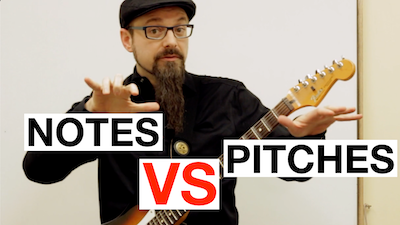
Notes Are NOT Pitches: Why G# And Ab Are Different [Even If They Have The Same Frequency]
"If G# and Ab are the same note, why do they have two different names? And why should we think of them as two different things?" Great question! The answer is that "pitch" and "note" are two different things (even if everybody confuses them) you can find all the details here: what's the difference between note and pitch

How To Make Music With The KUMOI Scale On Guitar
One of the fun things is music theory is that you can learn a new "sound" in a few minutes... and that sound may stay with you for the rest of your life. I learned this years ago, but I keep coming back to it, because this little 5-notes scale is so versatile that can sound anywhere from eastern, exotic, or even Blues! Click here to see how to make music with the Kumoi scale
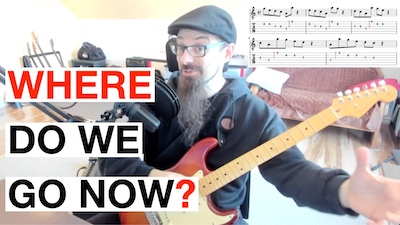
STUCK Writing A Guitar SOLO? Try This Idea To Finish It!
Ever got "stuck while writing a guitar solo? Today I show you one of my favorite ways to juggle what you already wrote around and come up with the next part of your melody or guitar solo. Click here to see how to continue your guitar solo

The Music Theory Of EVIL Villains And DARK Artifacts
How do Hollywood movie soundtrack composers tell you that evil is afoot and things are about to go astray? They use specific chords and progressions that our brain interprets as "evil" Click here to see how to write and evil soundtrack theme and evoke the feeling of in your listeners.

THEORY or TECHNIQUE: What To Practice First For Maximum Gains?
I found out that if you practice your music theory in the wrong moment, then you are going to waste around 70% of the time and effort you put in. Or if you prefer: if you practice your theory at the right moment and change nothing else of what you do you will learn roughly 3 times faster as before. Click here to see when it's best to practice your guitar theory
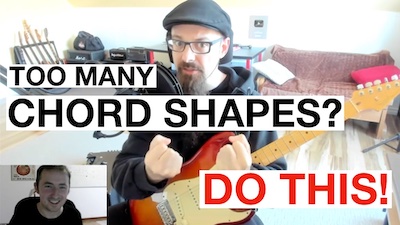
Too Many Guitar CHORD / ARPEGGIO Shapes To Memorize?
One of my music theory pet peeves is books that tell you: "and now learn this 2000 chords by heart" (If you think I am exaggerating, click on the link and despair...) But what is the alternative? Well, rather than learning all these chords by heart you could see how chord shapes are connected and that makes it WAY easier to learn and use them!

How To STEAL A Melody Without Getting Caught
Join me for this hush-hush Q & A session on how to steal a melody without getting caught ;-) Click here to see how to safely steal a melody Ssssh! Don't tell anybody!!
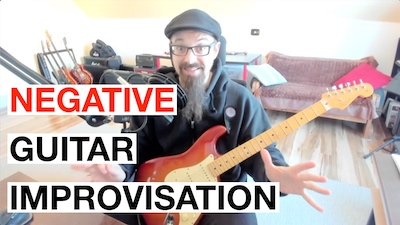
These 3 NEGATIVE Guitar IMPROVISATION Exercises Will Change The Way You Play
Today I want to share with you 3 secret exercises that had a massive positive impact on my student's improvisation skills. And when I say: "secret" I mean: so simple that guitarist can't help but underestimate them, so they never talk about them... and so they stay secret. Click here to see the 3 secret exercises of Negative guitar Improvisation
The Simplest (But Powerful) Guitar Trick To Write New Licks
Musicians always underestimate the simple things, but a simple idea can go a long way! Like this one. You can learn this idea in seconds, but when you start to apply it melodies will flow out of your guitar. Click here to see how to swap notes in guitar licks to create beautiful melodies
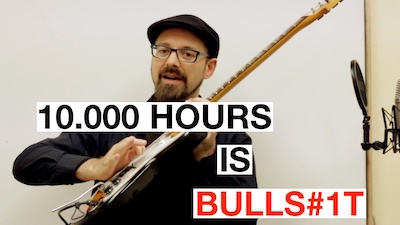
Practice Your Guitar For 10000 Hours? I Don't Think So...
Every now and then I have some people telling me that: "to become a master of anything - and the guitar is not an exception - you need to practice for 10.000 hours" With all due respect, that bull$#!t... and it's dangerous too to think this way, as it will make you practice in the wrong way. Click here to see how much you have to practice to master your guitar
The Ethical Way To STEAL Guitar Licks From Your Guitar Heroes
Is stealing ideas good or bad for us musicians? When should we do it and when should we not do it? I'm answering all this here... and I'm already expecting some fireworks in the comments. Click here to see why stealing guitar licks may actually be good for you... and how to do it in a ethical way
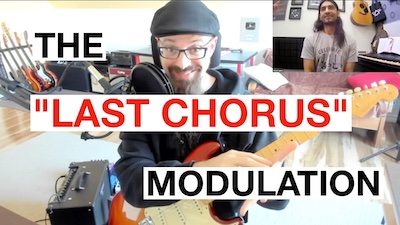
The Most Cliche' MODULATION (Know This... Or Be Left Behind)
Try this experiment: turn on the radio and listen to the last chorus of any pop song. The last chorus changes key - and usually it changes 'up'. Why is this done? Can we do without it? Click here to see when you have to change key on the last chorus and if this applies to your songs too.
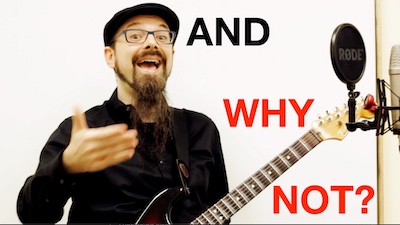
Sight Singing On The TOILET? And Other CRAZY Music Theory Ideas | Q + A
If you've been with me for a while, you know that I do not shy away from unpopular opinions when I think them to be true. In this video I collected a few of my most unpopular takes on guitar. In the rare case in which you agree with me on everything I do here... write me! We may become best friends! Click here to see some unpopular guitar opinions that will put me in trouble.
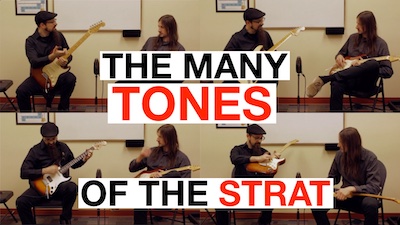
Stratocaster TONE Secrets [The Versatile Guitar - How To Get All These Tones]
Today we are going to find out secrets about one of the most popular guitars ever invented: The Fender Stratocaster The first thing is: know your instrument. And I'm always surprised at how even very simple things about the Strat (or any guitar) are virtually unknown. Click here to see how to get a great tone from any Fender Strat

This PIANO Trick Works Great On GUITAR Licks
Today I want to show you a trick I learned from a local Jazz pianist and that works great for lead guitar players who want to write creative guitar licks. I've never seen a guitar player doing this... Which is a pity, because this trick sounds great. Click here to see how to create creative leads by pivoting your guitar licks
The Jacob Collier Chromatic Harmony Shift Trick
I think Jacob Collier is an interesting musician with interesting ideas that are often misunderstood. Jacob's ideas are often way simpler than they seem at first. For instance, he's not using Negative Harmony as much as people think he is. Instead he' using tricks like this Chromatic Harmony Shift that are super-simple and have a great effect.

Which One Is The Right HIRAJOSHI Scale?
If you search the Hirajoshi scale online, you will find that different people give it different notes. So who is right? We all are, surprisingly! Click here to see to find out which one is the right Hirajoshi scale... and how all of them have a great exotic sound!
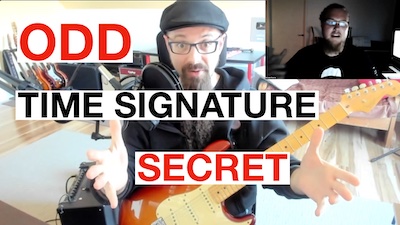
The SECRET To Make Odd Time Signatures FLOW (And Not Sound Choppy)
Do you want to write a song using odd time signatures? So far the best advice on Youtube was either "look at these examples" or "use a lot of trial and error". Both of these are not great. You'd rather have a principle, or an idea, or at least a guideline on how to write songs in odd time signatures that "flow" well. Well, the wait is over Click here to see the secret to odd time signatures
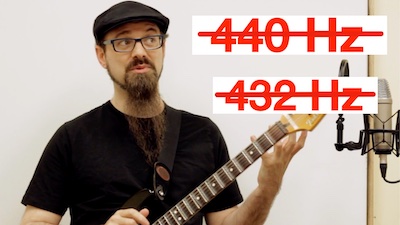
Van Halen's Weird Tuning And "The Canadian Chord Progression"
Some of the classic records by Van Halen (at least the first 4 albums...) are NOT consistently tuned to 440 Hz. It's not only Van Halen that does this. I have heard songs from Led Zeppelin, Queen, Black Sabbath, and even the Beatles doing the same. Click here to see why Van Halen's out of tune and yet they still sound good.

Your Guitar Will NEVER Sound Good Unless You Do This
In this video, I take a Squier guitar ... and in few minutes, using only a screwdriver and my ears, I make it sound way way better than it ever did before :-) What did I do? How did I do it? Click here to see how to get a great guitar tone from any guitar
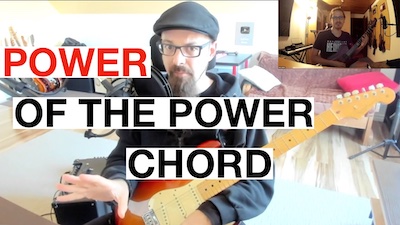
Make The Good Old POWER CHORD Sound Great [Harmony For Rock/Metal players]
You're a Rocker, but when you try to learn some music theory, you only find stuff about Jazz music or Classical music. And while Jazz and Classical may be fine styles, neither of them got the 'sound' you want for your music. Well, how about I show you how you can take and make power chords sound awesome and new?
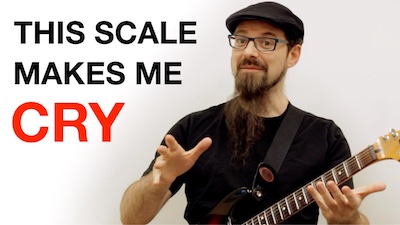
What Makes A Guitar Scale EMOTIONAL?
Too many people think that music theory is about 'calculating' the right scale for the right chord or something like that. Instead music theory is all about the feelz. Click here to see why this guitar scale sound emotional
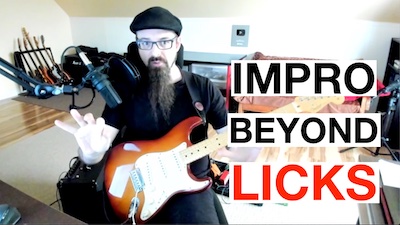
Why You Know HUNDREDS Of Guitar Licks But You CAN'T USE Them
Learning guitar licks gives you the illusion of learning something, but when you try to improvise or write your guitar solos, all these licks go out of the window. *That* lick will not work in *this* solo... instead, you are better off if you learn how to adapt licks guitar to your solos
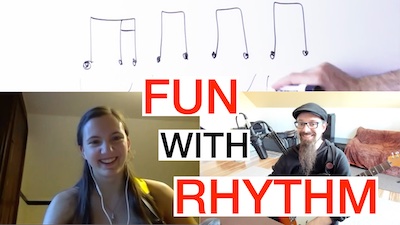
Music Theory Has NOTHING To Say About RHYTHM? Try This On For Size...
Music theory is only harmony, you say? Actually music theory has a lot to say about rhythm too! It's just that you won't find much of it around, because most resourced you find are - guess what - about harmony. And I don't deny that harmony is really really useful... but so is rhythm! Click here to see what music theory has to say on rhythm and find a trick that you can learn in a minute... but it will take a lifetime to master ;-)

Learn The NOTES On Your Guitar FRETBOARD | Q + A
If you can already 'see the notes' in real time on your guitar fretboard without thinking... then you don't need to watch this video :-) I'll see you next week with a video for you! Otherwise click here to have all the answers on how to learn the notes on your guitar fretboard
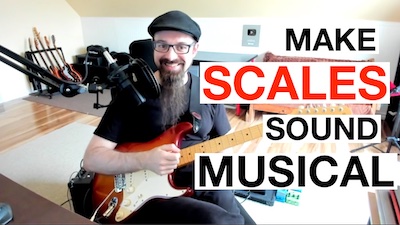
The Right Way To Practice SCALES On Guitar
Lately a lot of guitarists say that you don't need to learn scales on your guitar, because scales make you sound bad and you can't use them to make music. Well, how about if instead we find a good way to practice scales that makes them more fun, useful, and creative way? Click here to see how to practice scales to be more melodic

Writing Melodies Over Cinematic Chords [Music Theory Secrets]
Try to write a melody on these two chords: Am and C#m. Not as easy, ah? and yet these two chords sound amazing together (it's not a chance that they are used so often in movie soundtracks). So what can we do? Easy. Click here to see how to write cinematic melodies and you will see how easy it is to play on these two chords!
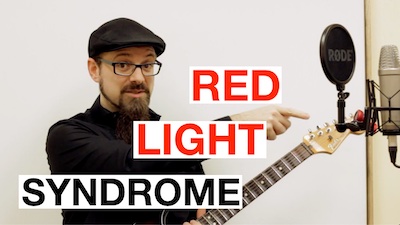
How Not To FREEZE When Recording Your Music
Ever happened to you that you want to record one of your guitar compositions, and you rehearsed it well, and you can play it perfectly... ... but the moment you press on that REC button, everything goes astray? Well, of course it's normal, but let's not settle for that. Click here to see how to record your guitar and get used to the studio experience.

7 Ways To Play The Same Guitar Chord Progression
The WAY that you play a chord progression on your guitar CHANGES the emotional feeling of the chord progression. So in this video I show you 7 different ways to play the same chord progression on guitar... ... and it's insane how different the same chord progression may sound.

How To COUNT Complex Time Signatures | Even If It's Dream Theater
As the old joke says.... drummers can count only up to 4 because they never need to count up to 5. Unless their name is Mike Portnoy or Neil Peart, in which case you can suddenly find that YOU can not count their complex time signatures. But counting complex time signatures is not a problem if you know the trick I'm about to show you. It works well, but it looks quite hilarious... Click here to see how to count complex time signatures even if they are too fast or the time signature changes.
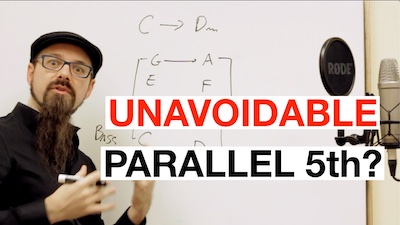
Impossible Voice Leading - How Do We Avoid THIS?
I've got an interesting question on my YouTube channel. One of my viewers found a chord progression where it's impossible to avoid parallel 5ths. Or is it now? To be clear, I'm not against parallel 5ths in principle. But I think it's good to have options so... ... let me show how you avoid parallel 5ths even when it looks impossible.

The VISUAL Way To Play BACKDOOR Cadences On Guitar
Backdoor cadences? What is this sorcery? Well, they are just simple chord progressions that sound great and are easy to understand... if you know the trick. If you don't know the trick, then they look mysterious and complex... and it looks like most videos on YouTube think they are mysterious and complex so take your own conclusions here... Click here to see the easy way to play backdoor cadences on guitar

Why I Got The 100K YT Creator Award 1 Year Late
I got the 100k YouTube Creator Award one year late... I tell you why here!

The Lickety-Split Technique (TM) To Create Riff Variations
What do you do after you wrote a great riff? You make a great song out of it. But how? You just repeat the riff over and over? No, that's lame. Instead, write some variations on that riff so you can use them in different parts of the song. Click here to see how to write riff variations on your guitar... lickety-split!

How To Learn Guitar Notes If You Tune Down A Half Step [Q&A]
"Is it better if I learn the notes in E standard even though I might play most songs half a step down?" It may surprise you, but this problem was solved before we even invented the instrument we call guitar. And that solution is still the best and most practical today Click here to see how to learn the fretboard if you tune in Eb standard - and this solution works if you tune down a full step or have a baritone too!
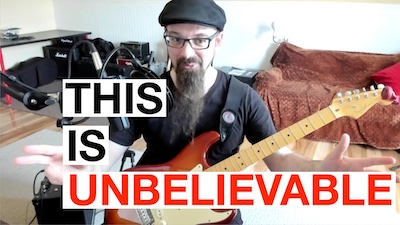
This GENIUS Stratocaster Setup Makes Your TREMOLO Bend In Tune
I just came across something so cool that I can't resist sharing it with you. Somebody came up with a way to set up your guitar tremolo so that it bends the notes in tune. You can set up your guitar to do this in minutes... and then you can go all Jeff Beck on this tremolo bar. In this video I tell you all about this and show you how this allows you to bend CHORDS rather than just melodies... Click here to see the genius tremolo set up that bends in tune.
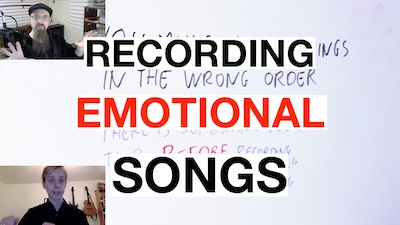
Why Your Songs Do Not Feel "EMOTIONAL" [Tips For Songwriters]
Sometimes is the simple things that are the hardest. and have the most unexpected consequences. For instance, you know how you seem to end up with dozens and dozens half-finished songs on your hard drive... songs that you will never finish? It's because you are not doing one very simple thing when you write songs. Here I'll show you how to get rid of this problem and finally finish your emotional songs by simply doing things in the right order.
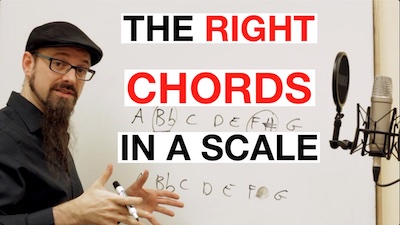
The Best Chords For Modal/Exotic Scales | Music Theory Q+A
The other day I got this comment on my YT channel: "Why choose these chords to flesh out a Dorian b2? Is that in the manual?" Forget for a moment the Dorian b2. The important part is the "Why" and the answer is definitely NOT "because it is in the manual" Click here to see how to find the best chords for a scale + other music theory Q+A
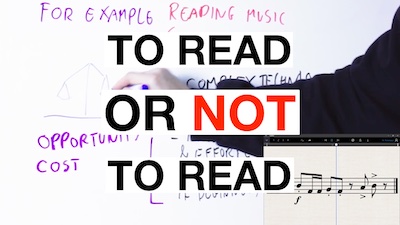
Why You Should NOT Learn How To READ Music Notation [As Guitar Players]
One big problem guitarists have when they start to learn a little bit of music theory is: they start from the wrong place. Like learning how to read music. That's a sure-fire way to get frustrated. My advice would be to not learn how to read music until you absolutely must. Here's why you should not learn how to read music as a guitar player
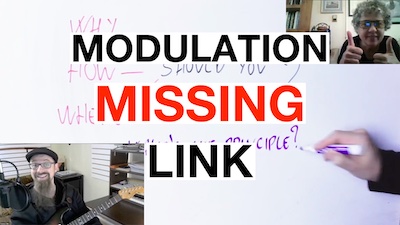
MODULATION (Changing KEY):The MISSING Piece That Nobody Told You About
If there's something that can be classified as 'dark magic' in music theory it's modulations (i.e. key changes) That's probably because there is one thing that makes modulations sound great, and yet it's not explained in any music theory book... Click here to see the missing piece to make modulations (key changes) work in your songs.

Tritone Vs Diminished 5th Vs Augmented 4th
Is a tritone a diminished 5th or is a tritone an augmented 4th instead? Or both? And what is the difference between an augmented 4th and a diminished 5th, if there is one? (hint: there is!) Click here to see what is the difference between the Tritone Vs Diminished 5th Vs Augmented 4th + other interesting Q&A.
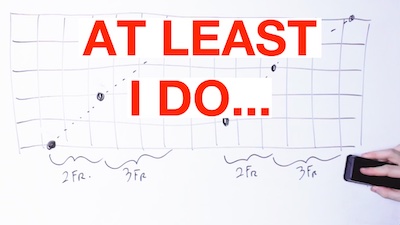
"Guitar Teachers HATE This Weird Trick" [Of Course We Do...]
One thing that drive me up the wall are videos like "with this weird trick you will learn your fretboard in minutes". These tricks never work, and indeed they can mess with your learning and your guitar playing. So here I show you one of these tricks, why it does not work, and what to do instead. Click here to see why this weird guitar trick does not work
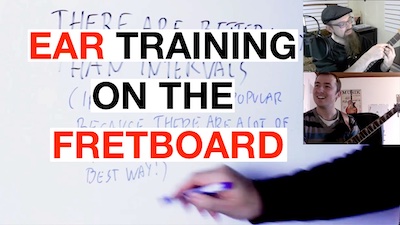
Doing EAR Training on your GUITAR Fretboard? [Genius Exercise]
What is that thing that is incredibly important for us guitar players to practice, and yet we 'd rather eat glass than getting down to it? It's ear training - because it looks hard and it's not clear how to practice So here's an easy, useful, gradual exercise that you can use to practice your ear training on the guitar fretboard - and that will make everything more fun!

Does The OCTATONIC Scale Have A Diminished Tonic Chord? [Q&A]
"Does the octatonic scale has a diminished first chord?" The octatonic scale is also called the "diminished" scale... so it seems logical that its tonic chord is diminished too... But as it turns out.. the octatonic tonic chord is not diminished! Click here to see why the Diminished scale tonic chord is not a diminished chord! (and why this is good news for you)

TRITONE Substitution Vs AUGMENTED 6th: What's The Difference? [Music Theory]
In every video I post on YouTube there is someone who comments: "Is this the Tritone Substitution?" even when tritone substitution has nothing to do with it. But this time, they may have a point! Click here to see the difference between Tritone Substitution and Augmented 6th chords and also learn a few new cool cool sounds!

How To Write Melodies When There Are No Chords [Guitar Riffs]
Most musicians know how to write a melody over a chord progression. It's explained in most music theory books after all. (Or it should be) Few musicians know how to write a melody over a riff, because it's not something that is explained in music theory books. Click here to see how to write a melody on a guitar riff

Does A DIMINISHED 7th Chord Have A Root? [Q&A]
There are no chords without root notes. But there ARE chords that have MORE than a single root. As you can imagine this makes for some weird chords... and yet some of them are pretty common! So what kind of chord has more than one root? Click here to find a chord with more than one root
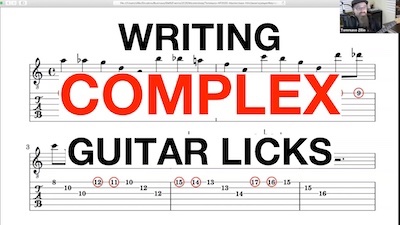
Unnecessarily COMPLEX Triad Pair Guitar Licks
Usually the idea of this website is to make complex things simple... today we do the opposite! Today we learn how to take simple licks and make them more complex. There are several ways to do that, and today we see one of them. You too can take a very simple lick and make it sound like it's super-complex. Click here to see how to use multiple approach notes and make your lick sound interesting and sophisticate.
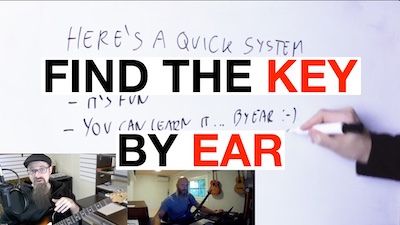
How To Find The KEY Of A Song Completely By EAR [No Perfect Pitch]
There are several ways to find the key of a song completely by ear. Some require you to have perfect pitch. Some require you to do a lot of mental math or consult a book ("Ok, so we found a C#m arpeggio and an F# major arpeggio... what keys have both of them?") Some are a bunch of nonsense. And yet, some are effective, fun, and they also make you a better player as a side effect. So guess which way to find the key of a song by ear I'm going to show you now? ;-)

Is The Neapolitan Chord A Tritone Substitution? (Nope) [Q&A]
"Is the Neapolitan chord a tritone substitution?" Eh, not really, but it is very, very close to being one. And the difference between these two things unlocks sounds that (I'm willing to bet) you did not think of using before. Click here to see why the Neapolitan chord is not a tritone substitution... and the sounds that this idea opens up.
FORBIDDEN Music Theory: 5 Songs That Use PARALLEL 5ths
One of the most tenacious myth about music theory is that you can't use parallel 5ths Now we can talk until we are blue in the face about why they are fobidden and where... but they say a picture is worth a thousand words right? So how about I give you some examples of Songs that use parallel 5ths so you cna hear by yourself that parallel 5th sound great?
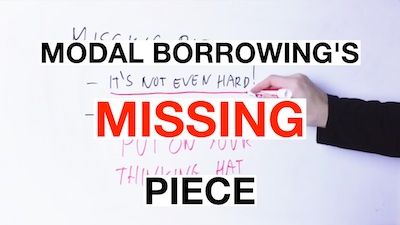
The MISSING Piece in MODAL Borrowing [Why You Can't Make It Work]
Modal borrowing is a simple idea to create interesting chord progressions, and every explanation I've heard of it is missing the piece that actually makes it work. If you ever tried writing something using modal borrowing and it works only sometimes, it's because of this missing piece. Click here to discover the missing piece in Modal borrowing on guitar
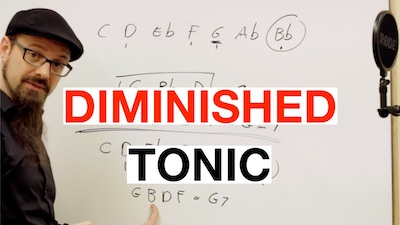
Can A DIMINISHED Chord Be Your Tonal Center? [Q&A]
Can you make a diminished chord the tonal center of your piece? It's a question that makes people not sleep at night (seriously!) So here I give you the answer to the diminished tonal center mystery and several other questions.
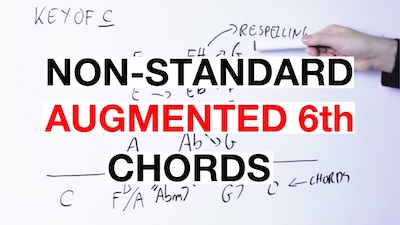
ADVANCED Augmented 6th Chords: Beyond The Italian, German, French Chords
Music theory books just give you 3 basic examples and they never explain anything more than that... ... but there are so many more good sounds to be discovered in there. Wouldn't you like to know the idea behind it and then try all these new sounds too? I am talking of course about Extended Augmented 6th Chords - one of the least explored but most fascinating music theory topic.

The VISUAL Way To Write A Song [For Visual Learners]
There are a lot of visual learners who want to make music. You may be one too! But how can a person that thinks mostly in images be able to create art that relies on hearing? Click here to learn a visual approach to songwriting and make your songs sound like an actual song (and not just a collection of licks)

Is This Fretting Hand Exercise IMPOSSIBLE? [Q&A]
Can you make a gesture like this one with your fretting hand? (click on the link to see it). Of is it too hard for you? Hey, if you can't do it I don't blame you. When I started playing I couldn't either. And yet it's useful for playing guitar to have some more finger independence, so here I show you how to do this impossible fretting hand position
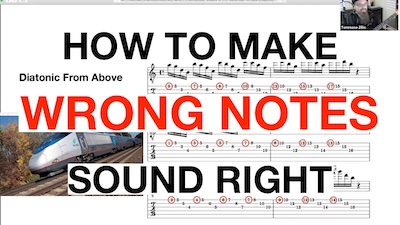
A Simple Way To Make WRONG Notes Sound Right
They say there are no wrong notes in music... but when YOU try to make the wrong notes sound right, you realize that it's not easy at all! Well, unless you know the trick. Then it becomes easy. Click here to see how to make the "wrong" notes sound right using approach notes
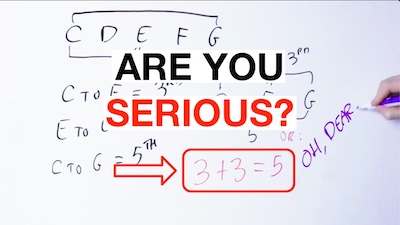
Why Musical INTERVALS Are Confusing [Worst-Named Music Theory Concept]
And the prize for "worst named music theory concept" goes to... Intervals! Musical intervals are confusing - because they are named in a confusing way. If I knew 20 years ago what I show in this video, it would have saved me a metric ton of frustration Click here to see why Musical intervals are confusing - and how to make your life easier when you use them.
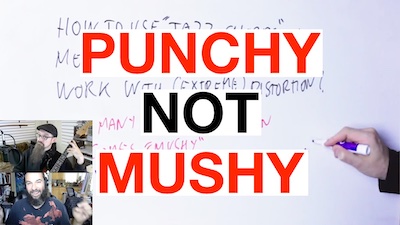
Distorted JAZZ Chords For Modern METAL: How To Make Them Work
Jazz and Metal players have way more in common than either of them would like to admit. For instance, they both think that their music is the only kind of Good Music :-) It looks like the only difference between these styles is 'just' the music! But this will not last longer either... as we are about to tear down another wall between these styles! Today you will learn how to make Jazz chords sound great with distortion. This is a new sound... so learn it now before other bands start doing it!

The Zesty FRENCH Augmented 6th Chord [Tasteful Dissonance]
In the past week we've seen the Italian and the German augmented 6th chords. But we are not done. There's more! Today we learn the zesty French Augmented 6th chord. If you have an appetite for tasteful dissonance, this will definitely satisfy it.
Are You Sure You Know What A DOMINANT Chord Is?
In Music Theory sometimes we use words that have more than one meaning. This is confusing to beginners (and often to advanced practitioners too). Sometimes we rely on context to help us understanding what it's meant, but sometimes we simply can't. This is the case with the word "Dominant". In music theory we use this word in at least 3 different senses... So click here to see the many different meaning of Dominant in music theory
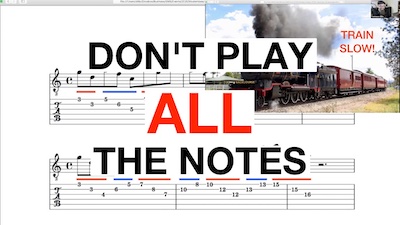
Nerdy Ways To Create Original Guitar Licks
Just because a scale has 7 notes, does not mean that we have to play all 7 of them. Just because a triad arpeggio has 3 notes, does not mean we have to play all 3. You think this is an obvious idea... but it can take us really far when we apply it to our guitar playing. See here how you can make triad pairs more musical by playing less notes.

The GERMAN Augmented 6th Chord [Plus The Swiss/Dutch Augmented 6th]
A few weeks ago we talked about the Italian chord, and it's now time for the German augmented 6th chord! The German chord has one extra note respect to the Italian one, and it's a note that gives it a teutonic 'weight'. In a sense, the extra note is the 'right' note to add to it. Click here to see how you can make music with the German augmented 6th chord
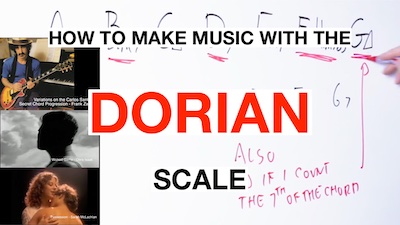
How To Make Music With The DORIAN Mode And Its Chords On Guitar
One of the most widely used modes - and with reason, because it sounds great and it's incredibly versatile: The Dorian mode! With thousand and thousand of possible ways to use it! Grab your guitars, hold them high, and let's all together ride to the conquest of the Dorian mode on guitar and how to make music with it!
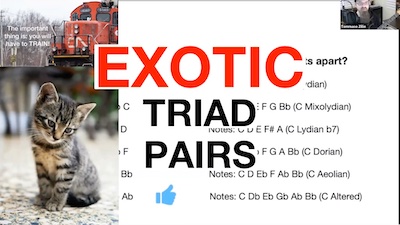
How To Create EXOTIC Sounds Using Only Two Triads
A few people told me that they find it hard to sound 'new and exciting' when using triad pairs. My people! I see your comments! I acknowledge your lamentations! And here I am in your help! Click here to see how to create exotic sounds with triad pairs, and your guitar will sound like it never sounded before!

The Italian AUGMENTED 6th [Explained By An Italian]
Today we talk about the Italian Augmented 6th chord. No, I did not make it up just because I am Italian :) There are also a German and a French chord, and there may or may not be a Swiss and a Dutch chord... But today we talk about the Italian one because it's the simplest of them. And it sounds great! Click here to see how to make music with the Italian Augmented 6th chord.
Why Music Theory Has NO RULES (And How To Learn It)
What is music theory? It's not an idle question - because it tell you what you should be looking for when you are learning music theory. And let me tell you, most people have the wrong answer. Or come up with weird distinctions like "theory is descriptive not prescriptive". (Hint: it's neither) So let me save you a lot of sweat, toil, and tears: click here to see what music theory actually is
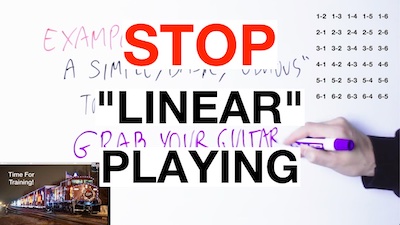
Lead Guitar CREATIVITY & Versatility With TRIADS (Hundreds Of Possibilities)
Aren't you bored out of your mind to play the same thing on your guitar, day in and day out? Until one day I made a new-year resolution to play "something new every day". Easier said than done. How do we invent something new every day? Well, here I'm going to give an example of how to create hundreds of possibilities: click here to see how to unleash your guitar creativity with Lead Triads
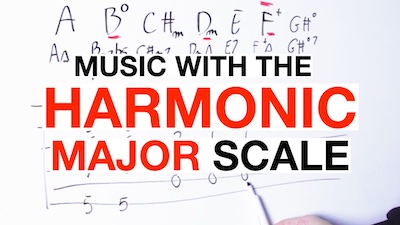
This Scale Sounds SO GOOD: The Harmonic MAJOR Scale
The first pop songwriter or producer who puts their hands on this scale and who takes it seriously will make millions. I mean, a scale that sounds this way when I play a standard 1-4-5 progression on it would deserve to be used in top 40 songs and international hits every other week. I am talking about the well-known-but-not-so-often-used Harmonic MAJOR scale (not the harmonic minor - that's a different beast) So if you want a fresh sound that can be pop-friendly but also sound exotic (hard to believe both are possible in the same scale... but it's true!) then click here to see how to use the Harmonic Major scale to make music!
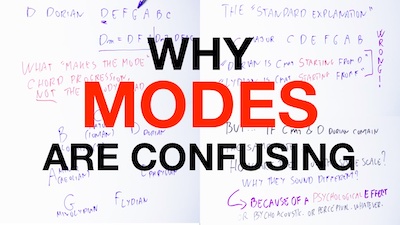
This Is Why MODES Are So Confusing To Guitar Players [Music Theory]
Modes are the #1 thing that confuses guitar players the most. Have you ever heard things like: "the Dorian mode is just the major scale starting from the second note"? It's wrong! And yet everybody repeats it. Here's a video that explains these confusions about modes. It's free. It's short. It's clear. Let's all all do our little part in making modes clearer and easier for all musicians. Click here if you are confused by modes - if if you think that Dorian is major from the 2nd note.
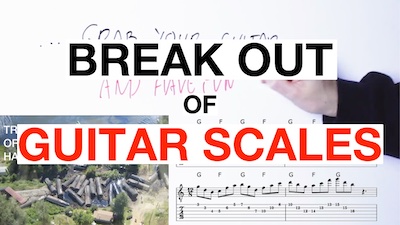
Stop Sounding Like A Guitar Scale Machine: A Simple Way To Break Out Of Guitar Scales
Have you noticed how it's always "scale, scale, scale" for us guitar players? No wonder many of us end up sounding like a scale machine every time we play. So how do we break out of a scale? Well I'm going to give you an idea in this video. Grab your guitar and follow along, and by the end you will think about it and play in a different way. Click here to see how to break out of a guitar scale with triad pairs
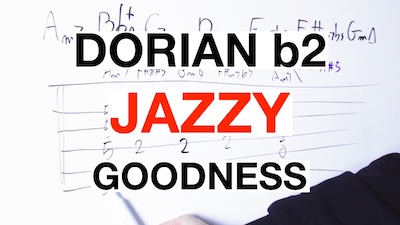
The JAZZY Exotic Scale: Dorian b2 (AKA Phrygian natural 6)
Most exotic scales seem more suited to Metal. This scale is kinda of an exception. While it can still be used in Metal, it seems to steer you in a certain way... and somehow it always ends up sounding jazzy. At least when I use it. This scale is the Dorian b2 scale - even if some people call it the "Phrygian natural 6" Click here to see how to make music with the Jazzy exotic scale Dorian b2

INTERVALS Or NOTES? How To Learn Your Guitar Fretboard
"Should I learn my fretboard by memorizing all notes? Or should I learn my fretboard using 'intervals' like many teachers on YouTube say I should?" Great question. First of all, let me give the answer away: "both of course". Then let me point out that the problem is not 'which one' you should learn, but 'how' you make them work together. Of course I have exercises for you... do this for few minutes a day and you can become an interval monster: how to learn the guitar fretboard via intervals
Why You Hate Jazz (Or Hip-Hop, Or Country, Or Classical..): A Theory Of Musical Taste
Why do you like the music you like - and you hate the music you hate? Well, there is no accounting for taste, there is? Or maybe that's the answer that your mom gave you so you would stop fighting with your brother... "no accounting for taste" is quite a lazy answer, wouldn't you agree? Here you will find a simple explanation of musical taste. It will show you why you like what you like, and how you can even change your taste temporarily to explore other musical territories. It's fun, and we are going to take a few potshots at music snobs too :) Click here to see why you hate Jazz (or country, or metal...) and what is actually happening when you listen to music.
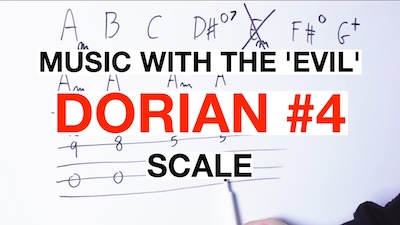
Making Music With The DORIAN #4 Scale On Guitar [The Evil Scale]
Once I played this scale to a student of mine, and he immediately said: "oh my, that's an evil scale!" And it is! You have definitely heard it in movie soundtracks - you will recognize it immediately when you hear it. So get ready for a musical injection of guitar evil-ness. Click here to see how to make music with the 'evil' scale: the Dorian #4 guitar scale
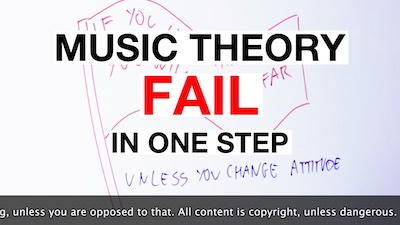
How To Fail At Music Theory In A Simple, Easy Step
I have found that there is one specific phrase that students of music theory often say or think that has a dramatic effect in their learning. And so far, always in my experience... All the students who say it simply stop improving, just like they pulled the brakes of their car while speeding on the highway. Click here to see how to fail at music theory... or how to avoid failing. Whichever you prefer ;-)

How To MEMORIZE Your Guitar FRETBOARD: The No-Nonsense Exercise That Actually Works
Learning the notes on your guitar fretboard is one of the most useful things you can practice. And it's not even hard! With the right exercise, you just need 5 minutes a day for a few weeks to learn them permanently. And when I say 'learn' I mean 'effortless recall'. You just know there they are without thinking, period. If I had any kind of business sense I would have packaged these exercises in a nice and tidy "guitar fretboard for dummies" course and sold it to you. Instead, you are going to get them for free in this video: how to learn the notes on your guitar fretboard
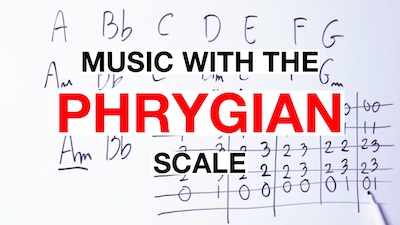
How To Make Music With The PHRYGIAN Scale On Guitar
The Phrygian scale has been a favorite of metal players, flamenco players (some people call it the 'flamenco minor' scale), film music composer and the occasional jazz player. here's something for everybody here... but it's not a one-trick-scale! The sheer variety of sounds you can take out of it is staggering. Click here to see how to make music with the phrygian scale on guitar
Pop Songs Rip Off Classical Music? Think Again!
"Pop songwriters copy classical music" is one of these things that rings true, that is delicious to share with friends, and that make you feel smart when you say it. The problem is... it's not true. And yes, I can totally hear that these songs sound SIMILAR to classical pieces - I am not deaf. But they are not copied. So what is going on? Why several pop songs DO sound like classical music if they are not copied? Click here to see how to pop songwriters do not rip off classical composers... and how you can do the same (or avoid it).
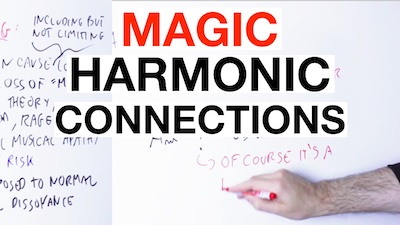
Music Theory's UNIVERSAL GLUE: This MAGIC Chord Connects ANY Two Chords
So you wrote your chorus in C# minor and your verse in G major. You know in your heart that these two pieces of music belong to each other but, like star-crossed lovers, they can not be together. Their keys are too different. You now what you need? You need some harmonic "universal glue". That is to say, you need something that can connect any two chords or keys. Just apply the 'glue' and connect the two song sections. Yes, it exists! And you can find here the magic chords that connect any two keys and how you can use it in your music.
How To Make Music With The LYDIAN Scale [Chords, Progressions, Lead]
Ah, the Lydian scale. So bright, so hopeful! Used by Jazz cats, Prog metallers, and soundtrack composers. And so full of pitfalls if you don't know how to use it! I've had a lot of requests to do a video on how to make music with the Lydian scale, so here it is finally! Here you will learn how to write a chord progression and how to play a lead on the Lydian scale on guitar
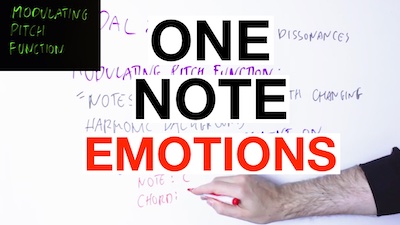
What Is The EMOTION Of One Note? [Modulating Pitch Function]
We all know - or at least we should! - that music theory is not just about chords and scales, but is more about what emotions and feeling these chords and scales evoke in our audience and how to use them for maximum emotional impact. But for instance, what is the emotion of a single C note played without context? If you have the slightest hesitation in answering this... then you need to watch this video on the music theory emotions of one note. You will never listen to music in the same way!
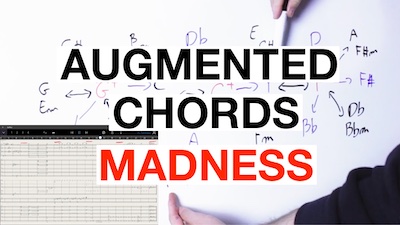
Augmented Chords MADNESS: What You Can Do With Augmented Chords
As a follow up to our previous video on augmented chords... it's time for some Augmented Chord Madness! In this video we go beyond 'standard' music theory (assuming that there is such a thing) and we see a few crazy things that we can do with augmented chords. Warning: this is not really a video for beginners ;-) Click here to see a few crazy things you can do with Augmented Chords on guitar
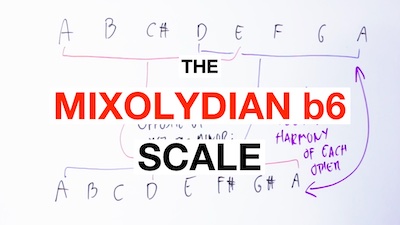
How To Make Music With The MELODIC MAJOR Scale
I really love learning new scales on the guitar. Even if often they turn out to be old scales. This scale - like many other scales - gets several names depending who you ask. I've heard it called Aeolian Dominant, Aeolian Major, Mixolydian b6, Melodic Major, 5th mode of Melodic Minor... ... and this IS the sound that you have been looking for. Seriously. Click here to see how to make music with the Aeolian Dominant scale.
Of Course Parallel 5Ths Are Fine! (If You Do This)
Parallel 5ths: forbidden or not? And if not, how can we use them to sound good? (Notice that power chords are NOT parallel 5ths...) Well, it's quite clear that you can use parallel 5ths to good effects. Go at 8:34 in the video, and hear them: this piece is practically built on parallel 5ths. So why sometimes they sound good, and sometimes they sound bad? Here it is the whole story about how to use Parallel fifths
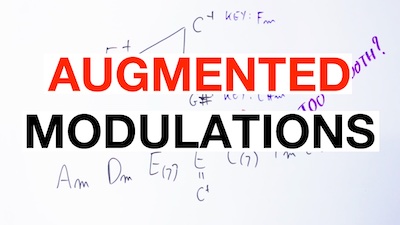
The Easy Way To MODULATE Using AUGMENTED Chords [Guitar Harmony]
The augmented chord sounds downright nasty when you try to play it for the first time. And there is a reason why. And once you know why... then you can eliminate the problem! In this video, I'm showing you how to make the augmented chord sound good... and how to change keys using it! Click here to see how to modulate with the augmented chord, and make your song sound like no one else!
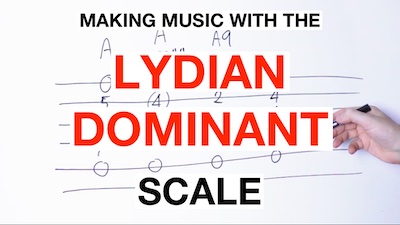
How To Make Music With The Lydian Dominant Scale On Your Guitar
Is it really a surprise that one of the favorite scales of prog metallers is also a favorite scale of jazz players? Well, it was surprising for me when I met this scale for the first time. As usual in music theory, this scale takes several names: Lydian b7, Lydian Dominant, Mixolydian #4, 4th mode of Melodic Minor... ... but the names are not as important as the sound! Click here to see how to make music with the Lydian Dominant scale on your guitar.
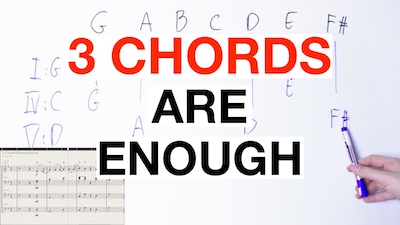
How to HARMONIZE A Melody With Just 3 Chords [Music Theory Tutorial]
Harmonization: "put chords to a melody". One of the most important things that a musician should learn to write good music (or write music at all...) If you've never harmonized a melody before... this is exactly where you want to get started. Watch the video, try it with your guitar, start having more fun than you ever had with music. Click here to see how to harmonize a melody with 3 chords. Yes, 3 chords are enough!
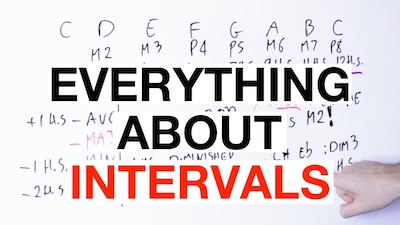
Major Minor Perfect Augmented Diminished INTERVALS Explained
Intervals have been a source of confusion for musicians from the very beginning of music theory. There are major and minor and perfect and augmented and diminished intervals... and some of them are the 'same' interval, but at the same time they are not the same interval! (augmented 6th and minor 7th anyone?) But intervals are also the 'gate' that takes you to new sounds and new places in your music. So click here to see how to really understand musical intervals and make music with them.
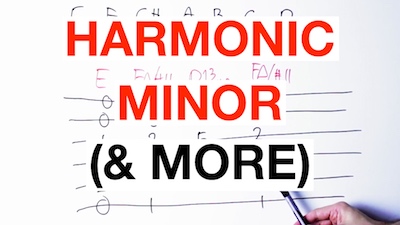
How To Make Music With The Harmonic Minor Scale
I've had several people requesting a music theory video on how to make music with the harmonic minor scale. After all, it's one of the favorite sounds of many styles - from classical to flamenco to metal - and it's a crowd pleaser too. I didn't want to make another video on the same things covered by a thousand other YouTubers out there, so in this video you will find some less common ideas on making music with the harmonic minor scale
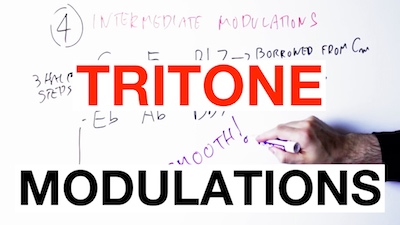
Tritone Modulations: 4 Ways To Change Key A Tritone Away
Do you know how to modulate a tritone away? It is not that easy to do - at least if you want a smooth transition - since these two keys are as far as they come from each other. As usual, music offers us several possibilities and there is not only one 'right' way to do it. Depending on the emotional effect you want to have you can use one of the several ideas that I present in this video. Click here to see how to change key a tritone away
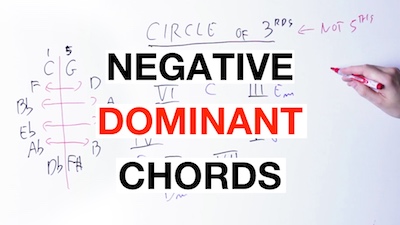
What Is A NEGATIVE Dominant Chord?
Several people have asked me about something that Jacob Collier said about "Negative Dominant chords". I could not find the original interview to check what Jacob said... but I can still tell you what a Negative Dominant chord is! In this video, we see the theory of Negative Dominant, Tonic, And Subdominant chords and how they connect to the normal tonic, dominant, and subdominant chords.

Aeolian Vs Natural Minor: Are They The Same?
Every time I upload a video, I receive lots of questions on music theory in the YouTube comments. Reading the questions on my latest videos, I realized that one thing that confuses most people is the difference between Aeolian and Minor. This can not stand! Such a basic confusion needs to be extirpated as soon as possible :) Click here to see what is the difference between Aeolian and Minor and why it's super important to know it.
The Fade To Black Modulation (Why It Sounds So Amazing)
Recently, I was hearing a few friends discussing the change of key in Fade to Black by Metallica... you know the one at the end of the firs solo... and how it did not make any sense to them. I love that song. And the change of key is not as hard as it may look. So here's a simple video that shows how the Fade to Black modulation works, why it sounds so smooth and natural, and how you can do the same on your own songs.
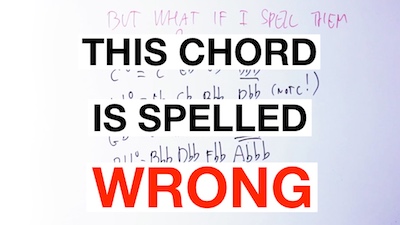
I am spelling my diminished chords WRONG? (Yes, And You Should Too!)
Recently I got a lot of comments on two videos on the fact that I am misspelling some chords in there. You know what's interesting? That these comments are right. I AM misspelling these chords. Worse than that, I did it on purpose! - because I had a very good reason to do it. Click here to see why I am misspelling diminished chords, and why you should misspell them too!
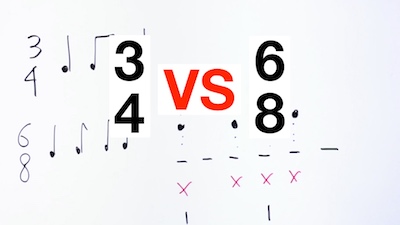
6/8 vs 3/4: POLYRHYTHMs From A Time Signature Difference
If you've been following this website for a while you know that I have little patience for theory that is not useful... I like to 'use' music theory to get ideas for composition, not for armchair music analysis. In this new video, we compare the 3/4 and 6/8 time signatures, and we get some interesting rhythm. We also learn a few tricks to make 'stale' rhythms sound better like using polyrhythms... or displacing them! Click here to see what is the difference between 3/4 and 6/8 and how this difference creates 2 vs 3 polyrhythms that we can use in our songs.
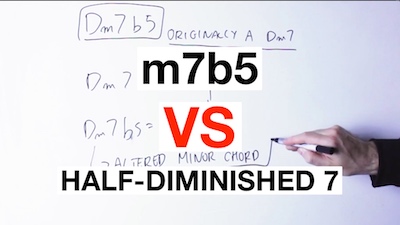
The Important DIFFERENCE Between m7b5 And Half-Diminished 7 Chords
There are two chords that behave in a different way and that they are even called in different ways. and yet everybody confuses them. Worse than that. They even teach you that they are the same chord. These two chords are the "half-diminished 7" and the "minor 7 flat 5". And no, the explanation is not "they are the same chord, they are just called it differently in Jazz and in Classical harmony" Click here to see the good reason why half-diminished and m7b5 are two different chords.
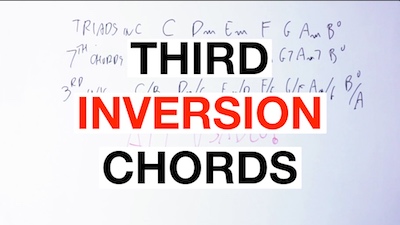
The MAGIC Of Third Inversion Chords - Chord Progression Music Theory
In a musical key there are only 7 possible chords. How can we write new music with such a limited palette of colors? There are several solutions to this. One is: you can use third inversions chords. These are found quite rarely (probably because songwriters don't always know about them) and they sound absolutely gorgeous. Click here to see how to use third inversion chords in your songs.

How to Write 720 Variations On "THE LICK"
"The lick" is probably the most famous Jazz cliche' ever. It's a short musical phrase that has found its way in all musical styles. You've definitely heard it. I pay my own homage to the lick in true 'music theory for guitar' style: I show you how you can take a stock phrase like 'the lick' and write variations on it. And we create a few HUNDRED variations on it. Click here to see how to invent 720 variations on the lick
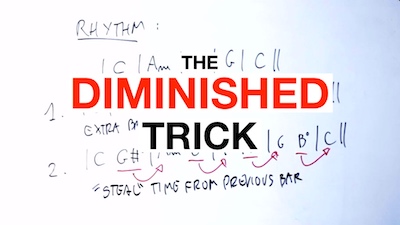
Gorgeous Chord Progressions With Secondary Diminished Chords
What if there was a trick that makes any simple chord progression sound much much better with next to no effort? This trick will make progression made by triads sound 'more classical' and any Jazz chord progression sound 'more jazz' Would you like to learn it? This trick involves a few diminished chords, and knowing how to resolve them - all things that I explain step-by-step. Click here to see how to use secondary diminished chords to make a chord progression sound better.
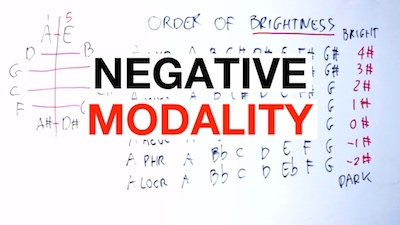
Negative MODALITY: How Negative Harmony Transforms Modes [Music Theory]
As promised, finally we have the video on Modes and Negative Harmony! If you write music or even think about writing music, these videos on Negative Harmony are giving you all the secret weapons that are not yet widespread in the music writing community. Here we use the Order of Brightness of Modes to see how Negative Harmony transform modes into other modes. Click here to see how to apply Negative Harmony to modes and get tons of inspirations for your own music!
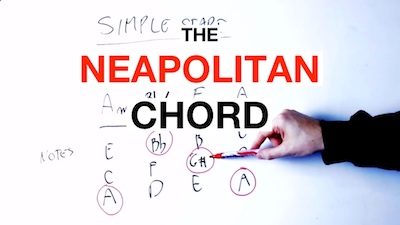
Bland Chord Progressions? Try The NEAPOLITAN Chord
In this video we are going to see how changing two triads from minor to major (counterintuitively) can substantially increase the tension in a chord progression - and how you can do it too in your music Click here to learn how to use the Neapolitan chord in your music. This is still a 'secret weapon' for songwriters, so it's worth watching the video if only to learn about it ;)
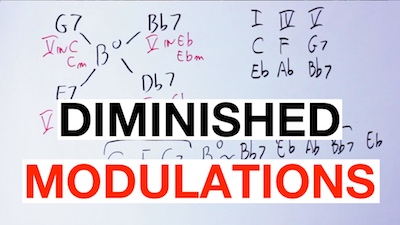
Changing Key With Diminished Chords Made Easy [Music Theory]
The diminished chord is one of the most versatile chord in music. It can do things that other chords can't do, and it resolves a number of problems in an elegant and practical way. Today we see one of the applications of the diminished chord to the problem of modulation. Modulation in music means "changing key". The main challenge here is to do change key in a smooth way i.e. connecting the two keys in a way that 'leads' the listener from the former key to the next one without any bump in the way. In this video, we will take a very simple chord progression in 8 different keys, and we will see how a diminished chord can connect these 8 keys seamlessly. Click here to see how to change key with diminished chords.
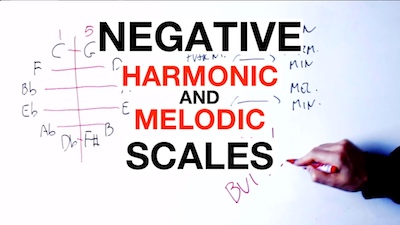
The Surprisingly Neat Theory Of NEGATIVE Harmonic And Melodic Scales
I've been asked by several people what happens if we apply Negative Harmony to other scales such as harmonic minor, melodic minor, etc. Yes, we can. And what happens is surprising to say the least. Come and see the surprising things that happen when you apply Negative Harmony to 'exotic' scales like harmonic minor, melodic minor, diminished, and whole tone. If this is not a bounty for composers and songwriters, I don't know what is ;-)
Songs That Change Time Signature In The Chorus
In most songs the chorus is made by 4 or 8 bars with a meter of 4/4. And herein lies the problem. Because, as you know, the chorus is the part of the song that is supposed to draw the attention of the listener and the part of the song that is supposed to be the most special. How special and different can it be if the structure of every chorus of every song you hear is always the same? In this video, we see a few songs that take the road less traveled and changed the rhythmic structure of the chorus in more or less creative ways. Click here to see the 5 levels of metric modulations in the chorus.
Harry Potter And The Tristan Chord [Music Theory]
The Tristan Chords is a great-sounding chord that has been rarely used in modern music. Despite having been invented more than 150 years ago, this is a chord that can still sound new and fresh if you use it in your songs. It has also been used in the Harry Potter soundtrack (yes, in the video I will show you exactly where) Click here to see how to play the Tristan Chord on guitar and learn how to use it in your own music.
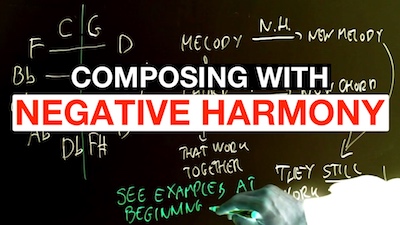
What You Can Do With Negative Harmony As A Composer [Music Theory]
If you've been following this channel for a while, you know that Negative Harmony is this interesting and controversial theory that has been popularized by a few modern musicians like Jacob Collier. In this video not only we see together what you can do with Negative Harmony, but we also see exactly what is new and original about Negative Harmony and what is not new and original about it. If you are interested in Negative Harmony in any way - you want to understand it, you want to use it in your own songs, you are simply curious - then click here to see what you can do with Negative Harmony.
Songs That Use Pedal Points
Pedal points are one of the most tasteful and useful music theory tricks that you can use in songwriting. It's not a chance that they are used all the time in any style of music. If you are a songwriter you simply must know how to write a song with a pedal point in it. Where can we hear them? Well, here's a new video that shows a few examples of the different kind of pedal points and how they are used in famous songs. And to show you that Pedal Points are really used in all styles, I made sure to pick examples from a wide variety of genres. Click here to listed to famous songs that use pedal point and learn how you can use it in your own music too.
Can We Even Agree On What Altered Dominant Chord Are?
Altered dominant chords are some of the spiciest and interesting chords available to us musicians. They can be used in any style: while they seem most common in Jazz, they have been used successfully in all styles. The infamous 'Hendrix chord' for instance, is an altered dominant chord. And yet, despite how great they sound, altered chords seems to be shrouded in mystery for the majority of guitar players. We guitarists often don't know how to play them, how to use them, what scales to play on them... In this new video, we are going to see together what altered dominant chords are, what scales work on them, and why musicians seem to constantly disagree on what exactly an altered dominant is.
How To Make Music In 15/8 And 15/4 - And Other 15-Based Signatures
While not as common as other time signatures, 15/8, 15/4 and other 15-based signatures have been used extensively in music, and with great results. The tricky thing here is that in many situations when the music is based on 15 beats, the score is not notated in 15/8! As we'll see in the video, sometimes composers prefer to use other way to notate pieces of music that work in 15 beats. In this video, we'll see together a few examples of music in 15, how they work, and how you can use what you learned here in your own music. Click here to see how to learn how to make music in 15/8
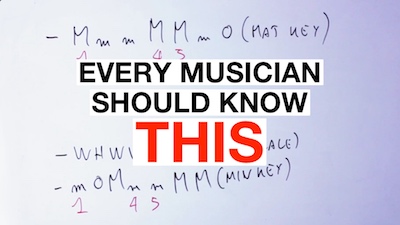
The One Thing That Every Musician Must Know In Music Theory
What is the ONE practical thing that everybody who calls themselves a musician (or a guitarist) should know? Is there one thing that every pro and every amateur on the guitar must absolutely know? Yes, there is! In this video, we see one of the most 'practical' thing that you can learn in music theory, and it's something that everybody who calls themselves a musician should know. Click here to see how to find what chords are in a key, which is the same as asking "what chords go together well on a guitar?"
Riffin' Like METALLICA: How To Write Metal Riffs
If you want to write riffs like Metallica or Megadeth, then all the theory of chords, chord progression, substitutions, etc. is of limited use for you. Sure, by studying it you may find some nuggets of knowledge that may prove interesting... but the fact is that metal riffs are simply not described well in terms of chords and progressions. Luckily for us, there is more to music theory than chords and progressions. And it is perfectly possible to understand how Metallica and Megadeth approach their riff writing. Click here to see how to riff like Metallica by taking a completely different approach than what everyone else is doing.
You Write That Chord How? And Other Music Theory Horrors
Sometimes music theory does not make sense because we music theorists made a mess at it. We took something very simple and we made it as hard as we possibly could for no good reason. Of course, we did not do this on purpose. I hope. In this video, we are going to see some music theory 'gotchas', starting from the completely illogical way we count the intervals to the notational monstrosities that you can find on Jazz chord charts. Click here to see a gallery of music theory notation horrors. You will also learn something new!
How To FEEL The 7/8 And 7/4 Time Signatures (And Write Groovy Music With Them)
It's a pity that many musicians think that 7/8 and 7/4 are unusable time signatures for most styles (except maybe for progressive rock/metal) when in fact using them - in any style - is much easier than you think. So, for our video series on different time signatures, this week we see all the 7-based time signatures and how to apply them in practice. Click here to see how to feel the seven eight time signature (7/8) and the 7/4 time signatures and write great music with them.

How To Stop Thinking About Guitar SCALES And Make Music Instead
One of the problems that I found most common among us guitar players is that we get stuck in thinking 'scales' on our fretboard. Of course, scales are not evil per se. Scales are a great way to understand your guitar fretboard My take is that we can and should learn our scales, and at the same time we should avoid being imprisoned by them by doing some scale-breaking exercises. These exercises put us directly in contact with the sound of music, completely bypassing the scale-brain. Click here to see how to break out of guitar scales and make music instead.
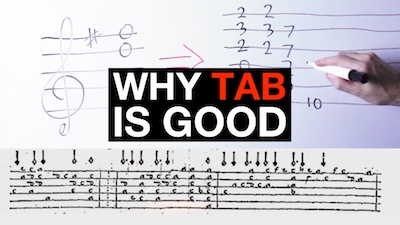
Why Tablature Is A Great Tool For Guitarists (And You Should Use It Too)
Are guitar 'tabs' (tablature) good or bad for you as a guitar player? Most teachers will tell you that tablature is not good for you. I respectfully disagree. Tablature has its uses, and it's a great instrument for us guitar players. So this time I'm going to stick my neck out - the topic is apparently quite controversial - and explain exactly why every reason they gave you to not use tablature does not hold water. Click here to see how to guitar tablature is a great tool to use as a guitar player.
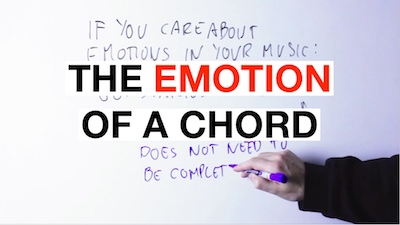
The EMOTIONAL Meaning Of Chords [Music Theory]
Many musicians think of music theory as a kind of un-emotional mathematics that tell you what chord come after another chord, or what scale goes on that chord, and so on. Then again, we play music because it transmits emotions and feelings. So it only makes sense that a theory of music should have something to say about how music connects to emotions; and how a composer/songwriter can create some very specific feeling in their audience. Click here to see how to connect emotions to chords and have a readily available set of chords that you can use for each and any emotion you want to express.
The FORBIDDEN Note That Sounds Great (Yes, It's ACTUALLY Forbidden)
Hard as it is to believe it, some notes are 'forbidden'. At least according to Jazz textbooks. The fun thing is that at least one of these notes sounds great despite being forbidden. And not only it sounds good, it's actually used in actual music. (Actual examples in the video linked) The question is: why this note has been forbidden? It's because of a weird reason that only Jazz players can understand? Or maybe there is actually a good reason? (Spoiler: yes there is a good reason. Can you guess it?) Click here to learn the forbidden avoid note that sounds great, and why it has been forbidden! (Musictheoryforguitar.com: the only website that gives you FORBIDDEN knowledge in music theory!)
Writing Music "In Style": How To Absorb The Aesthetic Of A Musical Style
One of the many challenges that we musicians encounter in our musical life is how to compose in a specific style (Jazz, Pop, Metal, Classical...) But how can we learn how to write music in a specific style? In this video, we see together 3 practices that will help you learn how to write music in a new style in the shortest possible time. In this video, we see also how to 'dissect' a song to see how differently theory is used in different styles. Click here to see how to absorb the aesthetic and then write in any musical style
CRAZY Dominant Chords A La Jacob Collier [Music Theory]
The lesson of today has been inspired by the music of Jacob Collier. We focus on one of Jacob's most used tricks: how to create crazy dominant chords. This is one of the things that I found most attractive in his music at first: how he can write chords that by themselves sound ... horrible ... and yet in context sound smooth. At the beginning I thought that to understand this would have required a super-high level of music theory, extreme competence in voice leading, absolute familiarity with chord substitutions... but it turns out that it's much, much simpler than that! In fact, as long as you know a few basic chords on the guitar, you can do it too! In the video, you find the 'general guideline' to create new crazy dominant chords a la Jacob Collier, and several examples played for you.
The Coolest Odd Time Signature (Mission Impossible)
The most used time signature in Western music is 4/4. Two others that are used really often are 3/4 (think of any waltz) and 6/8 (popular in ballads, but very versatile). An underused but super 'groovy' time signature is 5/4. You may have heard some great songs played in it like "Take 5" (you'll know it when you hear it) and the super-famous theme of Mission:Impossible. In this video, we see how these two classic tunes leverage the odd time signature, and how you can write your own music with it too! Watch the video before other songwriters catch up! Learn how to write music with a 5/4 time signature.
How To Play Lead Guitar Completely By EAR - No Theory
Is it possible to play guitar completely by ear and without knowing any theory? Of course you would expect me to take the side that "theory is an important thing to know". After all my website and my YouTube channel are both called "Music Theory For Guitar", so it seems logical that I am the side of theory, right? Well, let me play devil's advocate here. Let us take the side of 'playing by ear without knowing any theory' and give it a real shot. Is it possible? How can we do it? Click here to see how to play lead guitar by ear without any theory involved. This is fun and you should do it too!
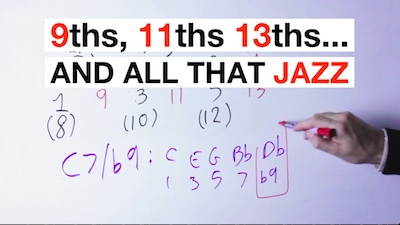
How To Play 9th, 11th, 13th Chords And All That Jazz On Guitar
Today we learn together how to play 9th, 11th, 13th chord and we see the difference between, for instance, a "9th" chord and an "add9" chord. We also cover "stranger" chords like Cmaj9 or C7/b9, and we see what we can do when the chord has too many notes to be played on a guitar Click here to see how to play
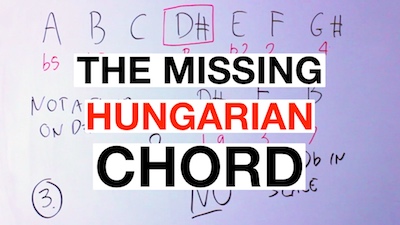
The Missing Chord Of The Hungarian Minor Scale
Some time ago I published a video on the Hungarian minor scale and when we were finding out its chords, I said that there was no usable chord on the 4th degree of the scale. Boy, was I wrong... Turns out that there is not one, but several usable and interesting sounds that come from trying to build a chord on that degree of the scale. There is definitely some new sound for you to use - and given how delicious the Hungarian Minor scale sounds, I know that many of you will put these sounds to good use. Click here to find out what is the missing Hungarian Minor Chord
How To Write Better Melodies - From Mozart To Snarky Puppy
NEW!Great melodies are what attract most people to music, And in the history of music the musicians that are most remembered, imitated, and admired were all masters at forging melodies. I'm going to pick two completely different kind of musicians: we'll take one melody form Mozart, and another melody from the jazz/world music/jam band Snarky Puppy (if you've never heard them: they are awesome) We can see the trick behind these melodies and learn how to use it for our own music! Click here to see how to write music with sequences - it will not make you like Mozart, but it will take you closer!
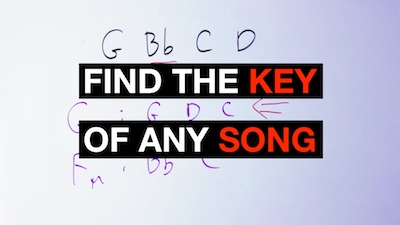
A Simple And Fast Way To Find The Key Of Any Song
One of the problems that most guitar students have is how to find the key of a song. This is one of these 'basic' skills that every musician - pro or amateur - should know how to do and how to do it fast. In this video, we learn together how to find the key of a song from its chords. And I recommend this video even if you know your major and minor keys already, as not all songs are simply in major or minor
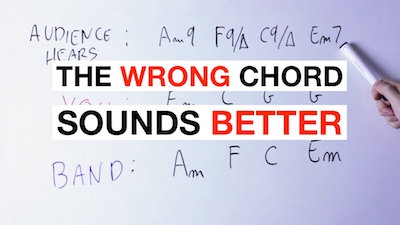
How To Play The Wrong Chords And Make The Progression Sound Better
We musicians spend a lot of time to learn to play the 'right' notes, the 'right' chords, the 'right' scales... So this may come as a surprise, but there are some situations where playing the 'wrong' chords sounds better than playing the 'right' ones. And I'm not talking about "outside" playing. No, I'm talking about sounds you can use even on your average pops songs - or any other style - and they will sound appropriate... and beautiful. Learn here how to play the wrong chords on guitar and make them sound BETTER than the right chords!
NEGATIVE Melody: An Example From Rachmaninoff [Negative Harmony]
Everybody is talking about Negative Harmony. What nobody is talking about though (but they should) is Negative Melody. Wait, there is such a thing as Negative Melody? Well yes, it turns out that not only Negative Melody exists, but that composers knew about this for a long time before the name 'Negative Harmony' even existed. Today we see how an absolute master of melody (the composer Sergei Rachmaninoff) uses the Negative Melody trick to write one of his most famous melody... by lifting it from another great composer and applying Negative Melody:) Click here to see how to use Negative Melody to write beautiful melodies.
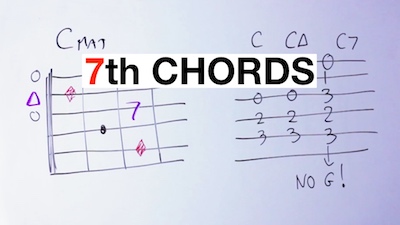
How To Play 7th Chords On Your Guitar
For our video series "Back to Basics" today we cover 7th chords. We see the 'what' but also the 'why' of 7th chords. This way, you can learn how to play them anywhere on the fretboard. Wherever you can play a major or a minor triad: there you will be able to play a 7th chord too! Here we cover major 7th chords, minor 7th chords, dominant 7th chords and the elusive minor major 7th chords. Click here to see how to play 7th chords on guitar.
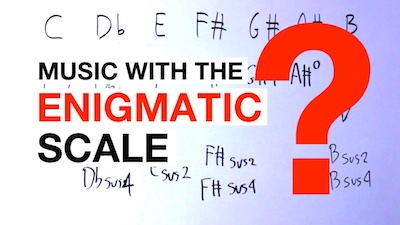
How To Make Music With The Enigmatic Scale [And Cheat To Sound Better]
By popular request, here is the video on the Enigmatic Scale that everybody wanted! This is a scale that is notoriously difficult to use and it was in fact written precisely as a challenge. It's not really a scale that 'sounds good' by any means. In this video, first we see how the Enigmatic scale works and how weird it sound... and then we use music theory to shamelessly 'cheat' and make it sound good :) Click here to see how to get usable blues and jazz sounds out of the Enigmatic scale on guitar
How To Make Music With The Stevie Wonder Altered Dominant Chord On Your Guitar
Stevie Wonder seems to have a knack to take some of the most dissonant chords out there and make them sound good in the progression. In fact he's so good that most of his audience don't even notice what kind of complex harmony they have just listened to! Today we see a chord that Stevie uses so often that it seems to deserve the nickname of "Stevie Wonder's Chord". This chord is very dissonant if played alone - and many musicians write it off as unusable. And yet we'll see how this chord can sound absolutely great in the hands of a master like Stevie... and how you can make it sound great too - it's not hard! Click here to learn how to use the Stevie Wonder chord and write great music on your guitar with it.
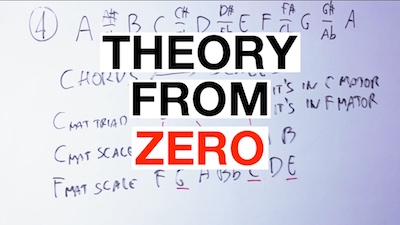
The Super Basics Of Music Theory
In this video we cover the very basics of music theory, from absolute zero. We'll talk about notes, chords, and scales - and how they come together. If you are a complete beginner on music theory, or you want to revisit the basics, then this video is for you. This video is NOT for you if you are already advanced and you are solid on the fundamentals of theory. I'll be back for you next week with something more advanced :-) Click here to learn the super basics of music theory... with a super-short and super-easy video!

The Simple Theory Of Japanese Music Scales
We musicians are always on a quest on how to sound "different", "original", "new". And so we are often under pressure to learn new things and make them sound good too! Today we learn a set of Japanese scales, one better sounding than the other. We see how they are built, and how we can make many more. And if you are like me, you will love that Miyako-Bushi scale. Click here to learn your Japanese scales on guitar and play something easy and different!
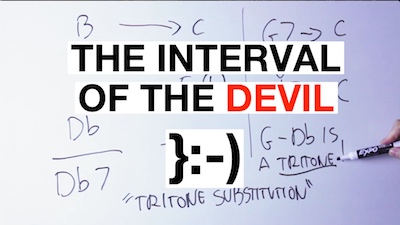
Making Music With The Interval Of The Devil (The Tritone)
One of the most maligned intervals ever: the tritone! It's been variously called 'the interval of the devil', 'diabolus in musica', 'the most dissonant interval' - all labels subject to opinions of course. But in reality, the tritone is one of the most used and in fact indispensable intervals in music. And if you are a guitar player, you need to know how the tritone looks (on the fretboard) and sounds, and you need to know how to use it too! Click here to see how to use the tritone devil's interval on guitar.
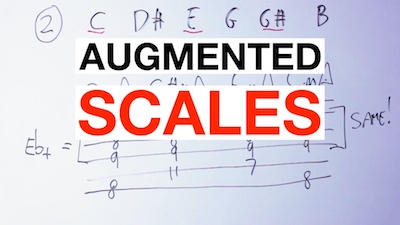
Making Music With The Augmented Scales (Both Of Them!)
There are two different scales that have been called 'augmented' by different musicians. And like for the orientation of toilet paper, Everybody is absolutely sure that the one they call "augmented" is the 'right' augmented scale, and that everybody thinking differently is just a heretic who does not know what they are talking about :) Either way, both these scales sound wonderful and make a valuable addition to your guitar sound palette. Click here to see how to use the Augmented scales on guitar to create interesting and cinematic sounds.
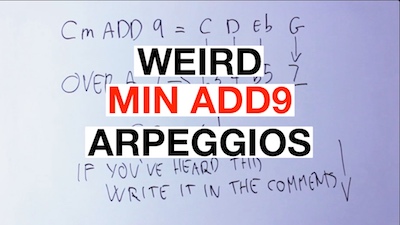
Weird uses for the minor add9 arpeggio
If you know the minor add9 arpeggio, you know that it sounds wonderful and mysterious when you play it by itself. But did you know that you can take the same arpeggio and make it sound completely different simply by changing the chord you play it over? Today we'll see together a few nifty tricks that allow you to use this simple arpeggio over a few different chords... even over altered dominant chords! Click here to see some minor add9 arpeggio superimpositions and have fun!
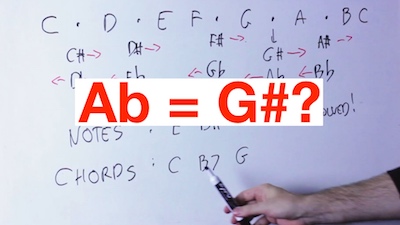
Is Ab the same NOTE as G#? [Practical consequences of music theory]
Is Ab the same note as G#? This is one of the question in music theory that nobody seems to answer in a clear way, even if the answer must be just yes or no. I will tell you the answer immediately: Ab is not the same note as G#. And in fact, the difference between these two notes has very practical consequences when you use them in your music. In this video, we'll see why Ab and G# are different notes, and we will also understand why musicians are so particular in using sharps or flats when spelling out scales and chords (it turns out that there is a practical reason for that!)
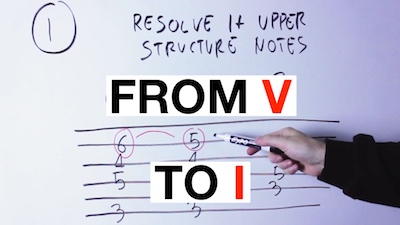
How To Make The Most Common Chord Progression Sound Wonderful [Simple Music Theory]
The most common chord progressions in all music is probably the progression from the V chord of the key to the I chord of the key (sometimes referred to as the 'perfect cadence'). In C major this chord progression is G(7) to C, and in C minor it's G(7) to Cm. If you try to play it, this chord progression sounds really plain. In centuries of music theory, great musicians have found several ways to make this simple chord movement sound different and interesting - and we are going to learn them together today! Click here to see how to spice up the perfect cadence and make a plain chord progression sound sophisticated.
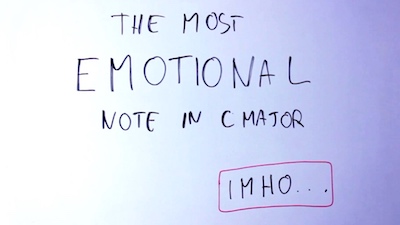
What Is The Most Emotional Note In C Major? [Controversial Music Theory]
What is the most emotional note in the key of C major? This is clearly a loaded question: different people hear different notes as 'the most emotional one', and the context in which the note is played matters too. And yet, everything else being the same, in my opinion, there is one note that can be called the most emotional one in C major. This note has been used by countless composers and songwriters to create heart-rending and tear-jerking melodies and chord progressions. Click here to see which one is the most emotional note in C major, and how to make it work in your music.
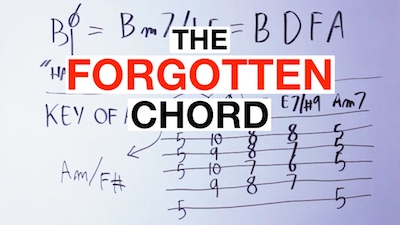
The 'Forgotten Chord' And How To Use It In Your Songs [Music Theory, Chord Progressions]
If you are writing a song in the key of C major (or A minor), you are probably going to use the following chords: C, Dm, Em, F, G, Am. Most musicians though forget that there is another chord in these keys: the B (half) diminished chord - because this chord sounds strange the first time you use it. Today we learn how to make the half diminished chord work for you. There are wonderful sounds that are unlocked by this chord, and you definitely want to be able to use them in your songs (and not be limited by the old major and minor triads)
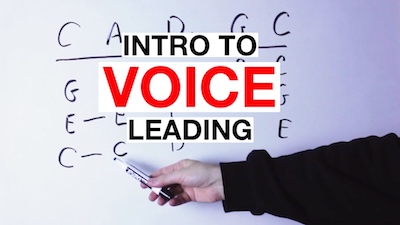
Understanding Chord Progressions: A Simple Intro To Voice Leading
Today we do something completely different than usual. This video is a simple introduction to voice leading and how it helps us understanding chord progressions and even writing a melody or soloing over the changes. If you ever were confused by anything in a chord progression, then this video will give you a new tool to understand and work with chord progressions. Click here to see how to use simple voice leading to really understand chords and progressions.
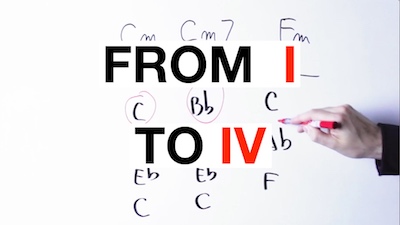
Songwriting Tricks: Moving From The 1st To The 4th Chord In A Key
One of the most common chord movements is going from the 1st to the 4th chord of a key (in the key C, this would be like playing a C chord followed by an F chord). This happens in so many songs that I'd be hard-pressed to mention one that does not do it. In this video, I show you how you can take this super-easy super-basic chord movement and make it sound different just by working on the C chord. Click here to see how to spice up a 1 to 4 chord progression
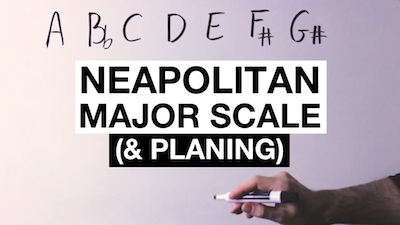
Making Music With The Neapolitan Major Scale, And PLANING
Some guitar scales are properly named. For instance, the Harmonic Minor is a minor scale (i.e. you can play it on a minor chord). And some other scales are not properly named at all. For instance, the Neapolitan Major scale is not a major scale at all. It does not work on a major chord, it does not sound major at all, and to be completely frank, nobody has any idea why it's named 'Neapolitan' either! And yet, despite being misnamed, the Neapolitan Major scale is a scale that is growing in popularity and also a scale that you absolutely want to learn. Have fun with it!
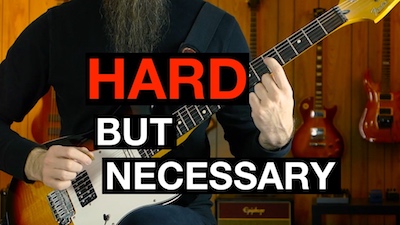
The "Missing Finger Movement" That Most Guitar Players Avoid (But Should Learn)
One of the things that separates beginner guitarists from the advanced is what I call the "Missing Movement": it's a very simple left hand technique that can be learned with just a little practice, and it's probably the most common 'blind spot' that lead guitar players have. The trouble is that the players do not notice, but the listeners can definitely tell that "something's off" Here you can learn about the "Missing Movement", also known as the rolling motion on guitar, why it exists, how to do it, how to train it. It seems like a small thing, but it will make the difference in your lead playing
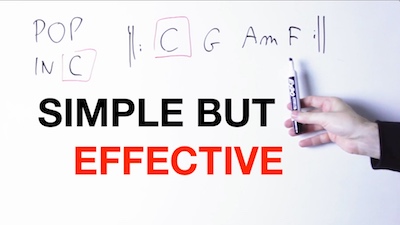
Songwriting Basics: The Chord That Should Be Simple But Isn't, And How To Learn To Use It
Trick question: what is the most common chord in every song you listen to? Easy: it's the first chord of that key. This is the C major chord in the key of C major, the Em chord in the key of E minor etc. But if it is so common, how is it that most songwriters do not know how to use it? It's easy to underestimate something because it's common and supposed to be simple. And yet, using the first chord in songwriting with taste and in the right places will make or break a song.
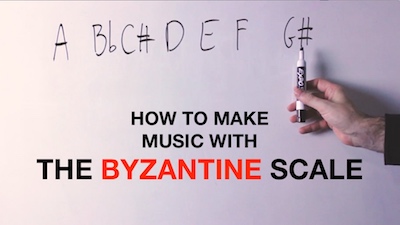
The Surf Rock Exotic Scale: The Byzantine Scale
The scale we see today has been used in the song "Miserlou". The famous surf rock version by Dick Dale has been featured in the movie Pulp Fiction (if you don't know the song, I play it at the beginning of the video below) The scale used is called the Byzantine scale , it's very easy to use and fun to play! Whether you know your scales well or not, you will pick up this one in just a few minutes.

How To Play Pinch Harmonics (Squeals) On Your Guitar In 7 Steps
Pinch Harmonics (also known as 'squeals') are one of the most volatile techniques on electric guitar: you think you have learned how to do them, but then you try to play them and they just don't work. To help you get your pinch harmonics right every single time, here are the 7 steps to guitar pinch harmonics you have to follow. Try them out, and you will see that there is nothing strange or mysterious in making your guitar squeal:
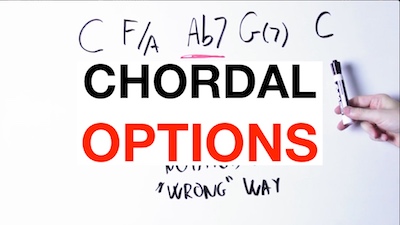
Juicy Chord Progressions: 6 Gorgeous Chords To Put Before A Dominant Chord
One of the best kept secrets of music theory is what to put just before a dominant chord. In the last couple of centuries very ingenious and creative musicians have found many ways to 'prepare' the dominant chord, and some of these options sound simply gorgeous. In this video, I show you 6 juicy options for chords that you can put before a dominant chord. Listen to these ideas and get some inspiration!
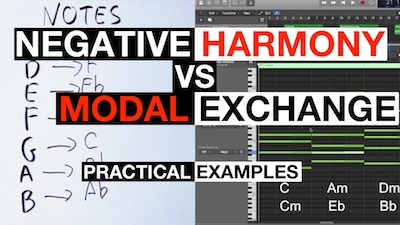
Endless Melodic Variations From Negative Harmony And Modal Borrowing
A while ago I published a video explaining Negative Harmony, an interesting theory used among others by Jacob Collier that allows you to create new and spicy chord progressions. That video got a big response, and many commenters asked to see more practical examples of how Negative Harmony can create variations in melody and harmony at the same time. So, in this new video, I do just that! Click here to see how to use Negative Harmony and Modal Exchange to create endless melodic variations. Don't worry about the complex names: these are simple ideas and I do explain them in the video.

Pro And Cons Of Scalloped Guitar Necks
Many of you have seen that my guitar has a scalloped neck and asked me to talk about its pros and cons. I am happy to oblige! If you are wondering whether you are going to like a guitar with a scalloped neck; if you don't know what scalloping does to your guitar technique, speed, and sound; if you asked yourself why players like Malmsteen use a scalloped neck... ... then this video on scalloped guitar neck is for you!
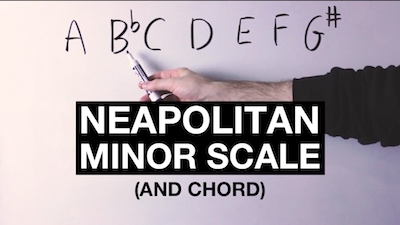
The Neapolitan Minor Scale And The Neapolitan Chord
You've heard this sound. You've hear it many, many times in pop songs, in classical music, in guitar instrumentals, even in Jazz. But you don't know how to make that sound (yet). That sound is produced by a scale called "Neapolitan Minor". In this video, we learn how to use the Neapolitan Minor scale to make music, either as a stand-alone scale (for haunting musical landscapes) or over a common chord progression for a delightful "it's dissonant but it sounds so good" effect.
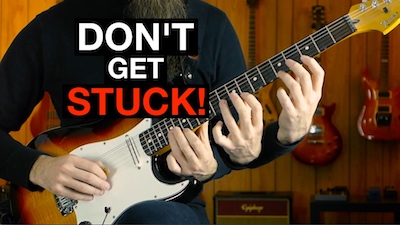
Get Unstuck From The Same Old Guitar Scale Position
Direct question: when you play a guitar solo are you able to move all around the fretboard, or do you get stuck in the same position on the neck? Here you will learn a simple way to break out of the same old scale pattern so that you can move freely on all the fretboard, from the lowest frets to the highest ones. And as a bonus, you are going to learn how to write a few cool licks as well!

Guitar Technical Study: Playing A Bend After A Scale/Arpeggio
Does it ever happen to you that you are playing a guitar solo and want to play a bend... but for some reason your hand becomes all tense and you can't play that bend right? This is a very common problem that happens to most guitar players, and it's fixed easily if you know the right exercises for it. Click here to see how to integrate guitar bends with all the other techniques that you know how to play on the guitar.

The BLUES-Exotic Scale: Hungarian Major
Many guitar players never learn 'exotic' scales because they think they are not interested in their sound, or that they should learn the 'normal' scales first. And yet 'exotic' scales are used commonly in music we all listen to. And they are not as hard as you think they are! Today we see a scale that can be used (or misused?) to sound like Blues... but can also sound exotic and middle-eastern. Welcome to the Hungarian Major scale, a scale that you will not regret learning whatever style you play.
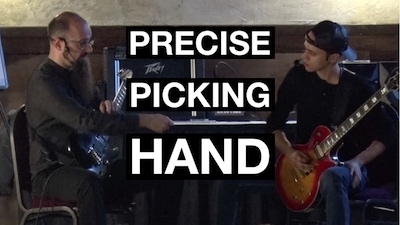
Get A Picking Hand Fast And Precise Like James Hetfield (Metallica)
A problem I see very often in guitar players is that their picking hand is slow and imprecise. This happens especially when playing rhythm guitar in rock and metal, where consistent and precise down picking is a must to get an aggressive sound Today we see an exercise targeted to reinforcing your picking hand, and we will apply it to a guitar riff by James Hatfield (Metallica). Click here to see how to practice for a fast and precise picking hand
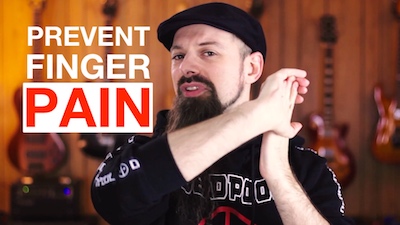
How To Keep Your Hands Healthy As A Guitarist
In my experience as a musician and teacher, I have seen that many guitar players do not treat their hands really well. Some stress their hands too much, stretch them the wrong way, subject them to needless abuse. Some others simply neglect their hands completely - they just don't know what needs to be done to use their hands in a safe way, so they simply do not do anything and hope they'll be alright. Click here to see a simple video on hand health and care for guitarists so that you can prevent painful conditions that can stop you from playing guitar.
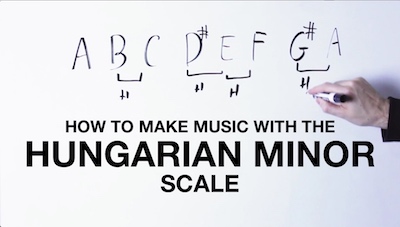
How To Make Music With The Hungarian Minor Scale (aka Double Harmonic Minor)
You may have noticed how most lessons on exotic scales for guitar just show you a couple of scale patterns and call it a day. While it's cool to know scale patterns, those are not enough for you to actually make music with the new scale you have learned. Today we will take one of the most interesting exotic scales - the Hungarian Minor, also known as the Double Harmonic minor - and together we will see how to actually make music with it. We will look at its chords and how to put them together and even how to use some of the most dissonant options to good effect. Click here to learn how to make music with the Hungarian minor chords on guitar!

How To Eliminate Tension When You Play Guitar
Every time you try to play faster on your guitar your hands get 'tense' and the more you push the worse it gets? How can you relax your hands when your hands automatically get tense whenever you play faster? Better yet, how can you completely prevent this tension? If you want to learn how to train your hands so that they will stay relaxed even when you play fast, then click here, learn a guitar relaxation technique that will completely change your playing in just a few practice sessions.
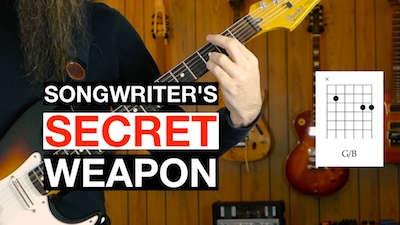
First Inversion Triads: How To Play Them On Guitar And 3 Ways To Use Them In Your Music
If you try to write a song in C major you have only 6 usable triads: C, Dm, Em, F, G, Am. That's quite restrictive! The simplest and probably most useful idea to extend the number of available sounds is to use first inversion triads (aka "the songwriter's secret weapon") This idea will give you 7 new sounds you can use in your C major song - and it builds on the chords you already know. Click here to see how to play first inversion triads on guitar, and 3 different ways to use them in your songs (with examples from famous songs):
Cinematic Chord Progressions: Chromatic Mediants Made Easy
Movies like Lord of the Rings, Indiana Jones, Harry Potter, do not feature many Blues progressions, power chords, or guitar solos. But can we guitarists learn something from them? Today we will see together one of the secrets of movie composers. This secret has a pretty complex and 'scary' name ("chromatic mediant progressions") and yet it's very simple to understand and use. Click here to see how to play Chromatic Mediant progressions on guitar and get that cinematic sound!
Are You Too Old To Play Guitar Or Learn Music Theory?
Is it true that young people learn faster than older people? Is it true that if you start playing after your 20's you've missed the train for guitar? Is it true that after 20 years of playing by ear it's useless to learn music theory? Click here to see if you are too old to learn guitar and if you should give up playing.
3 Simple Exercises To Boost Your Fretting Hand Finger Independence
When playing an instrument like the guitar, being able to control each finger independently is one of the most basic and necessary skills - and also one of the most neglected ones. The litmus test here is: can you move one your fingers independently while keeping all the other fingers relaxed? Most guitar players score very low on this test - but don't worry, we can solve this! Today we see 3 simple guitar finger independence exercises that are easy to learn (but hard to master!) that will make the difference and will teach your hand how to stay relaxed even while your fingers move in different directions. Have fun!
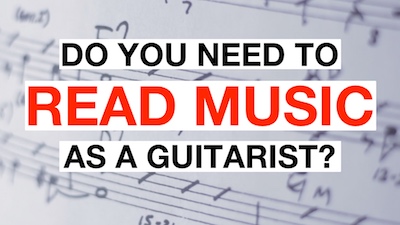
It Is Necessary To Learn To Read Music As A Guitar Player?
Some guitarists say that if you can't read music then you are not a 'real' musician. Other guitarists say that reading music is completely useless for a modern guitarists. They are both right: different musician play in different contexts and for some of them standard notation is an indispensable tool, while for others it's simply not needed. And are you sure that you know if reading music will be useful to you? Click here to see how to know if you need to learn to read music as a guitar player, or if learning to read is a waste of time for you.
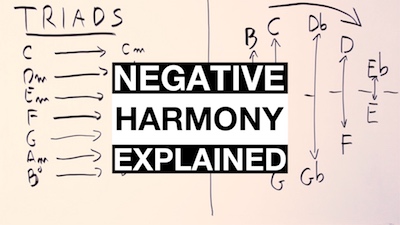
How To Use Negative Harmony - Explained In Simple Words And With Examples
Negative Harmony is a very simple concept that has been made unnecessarily complex. It was all the rage on YouTube a while ago, but for all the talk about it, there are still very few resources that actually explain it! In reality, everybody can use Negative Harmony in their music - it's not difficult to do as long as you can play a few chords on your guitar. Click here to learn how to use Negative Harmony on guitar to create chord progressions that sound great and different.
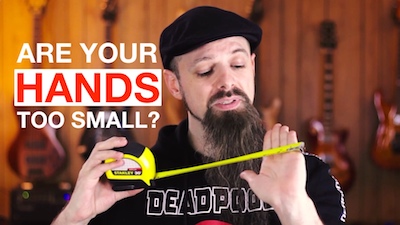
Are Your Hands Too Small To Play Guitar? What Can You Do About It?
Are your hands too small to play guitar? Do you have any trouble playing those 'stretchy' scales and chords that other guitarist can play with ease? Sadly there is NO way to make your fingers longer... ... but there IS a technique that you can use that will give you much more reach than what you thought possible, so you too will be able to play those 'stretchy' positions. Click here to see if your hands are too small to play guitar and what to do about it!

What To Do When Guitar Music Theory Is Overwhelming
Are you feeling overwhelmed by how much there is to learn about music and music theory? Do you find yourself thinking that theory restricts what you can do and it's a bunch of information that you won't use? Or maybe you think that you are not good enough/smart enough to understand everything there is to understand? Click here to see how to eliminate the 'there is too much to know' mindset and make music theory work for you and your music rather than standing in your way.
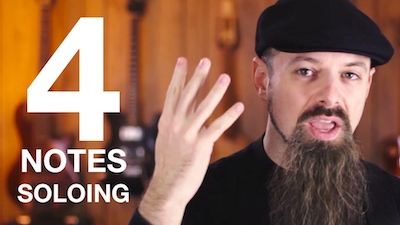
Guitar Soloing With 4 Notes: Less Is More Or More Is More?
Less is more, or More is more? On what side we have guitarists who want to play only a few well-chosen notes, and on the other side we have the people who have the need for speed. And, to me, both are cool. But we can have our cake and eat it too! In today's video we will see a simple exercise on choosing only a handful of notes and making them sound well... and we will also see how to shred with them if you want to do so. Take the 4 notes challenge and expand your lead playing horizons!
